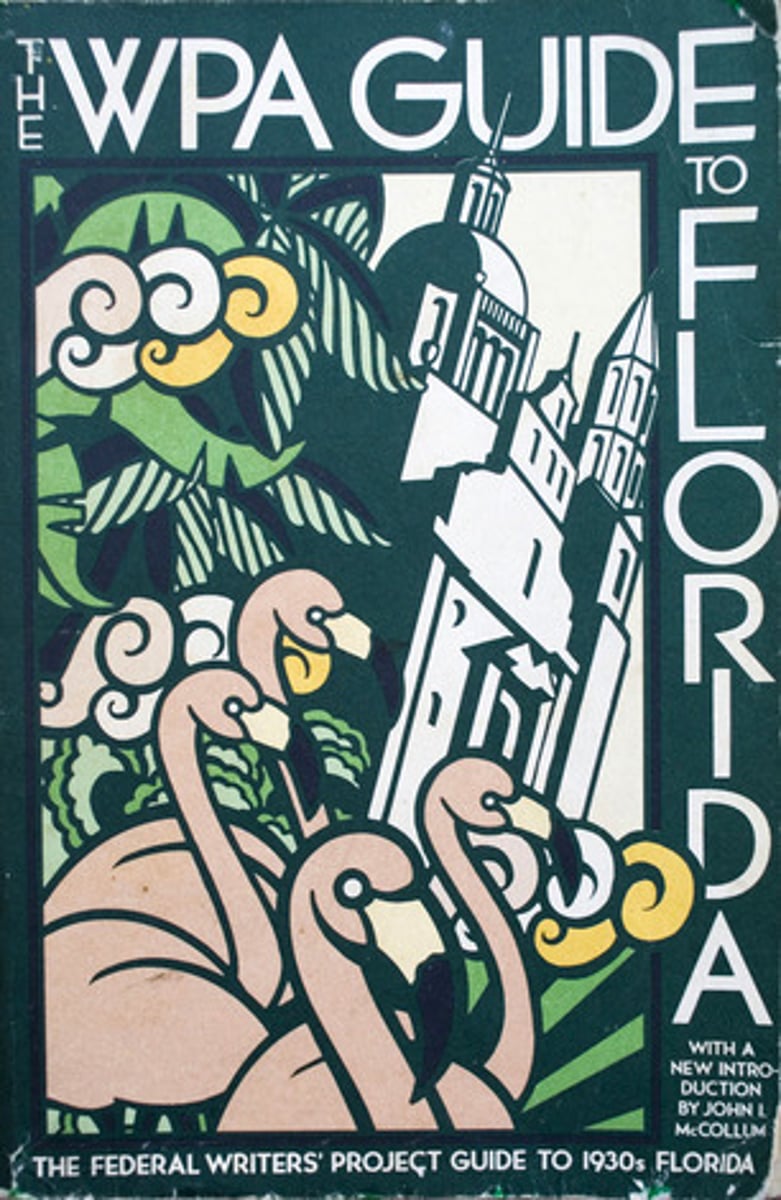Category 2: Global Military, Political, and Economic Challenges
1/70
There's no tags or description
Looks like no tags are added yet.
Name | Mastery | Learn | Test | Matching | Spaced |
|---|
No study sessions yet.
71 Terms
Imperialism
Policy in which stronger nations extend their economic, political, or military control over weaker territories. For America, there was a desire for military strength, a thirst for new economic markets, and a belief in cultural superiority.
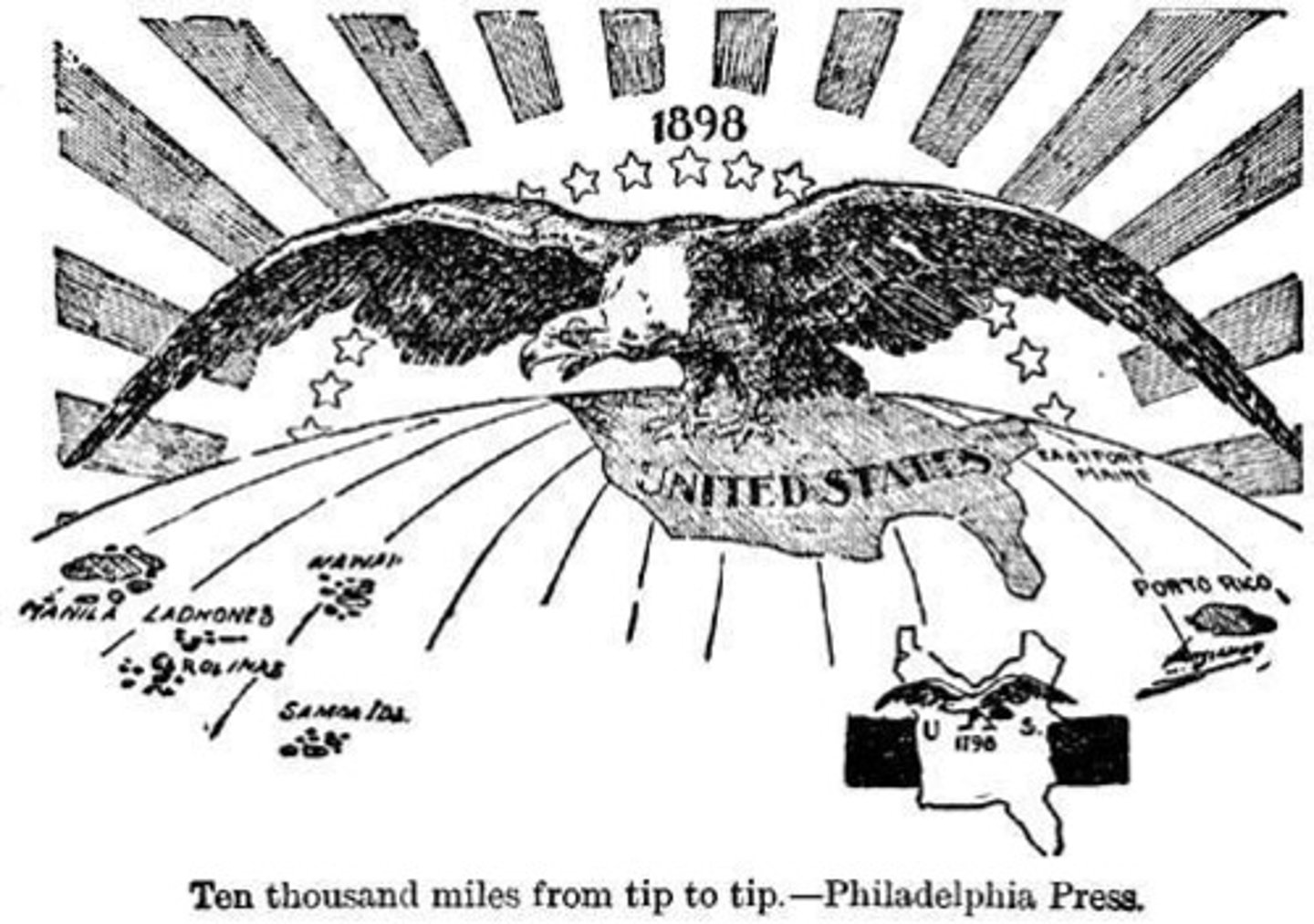
The Influence of Sea Power upon History
Book written by Alfred Thayer Mahan - an influential imperialist thinker. Pushed for a strong naval fleet, a canal through Panama, colonies in the Pacific and Caribbean to serve as naval bases, and greater trade with East Asia.
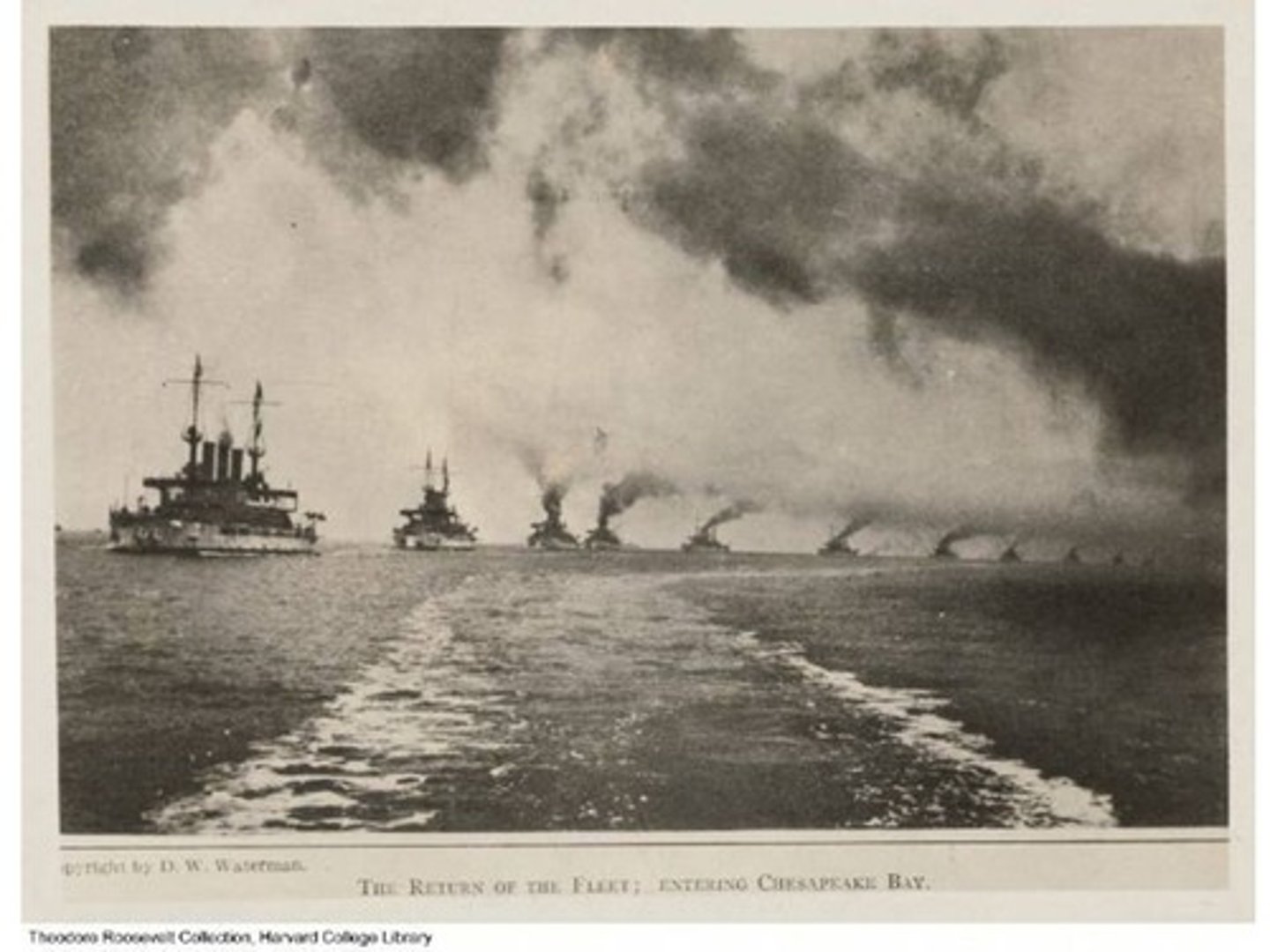
Yellow Press
Also called yellow journalism. Technique for selling more newspapers by sensationalizing and exaggerating news events to lure and enrage readers.
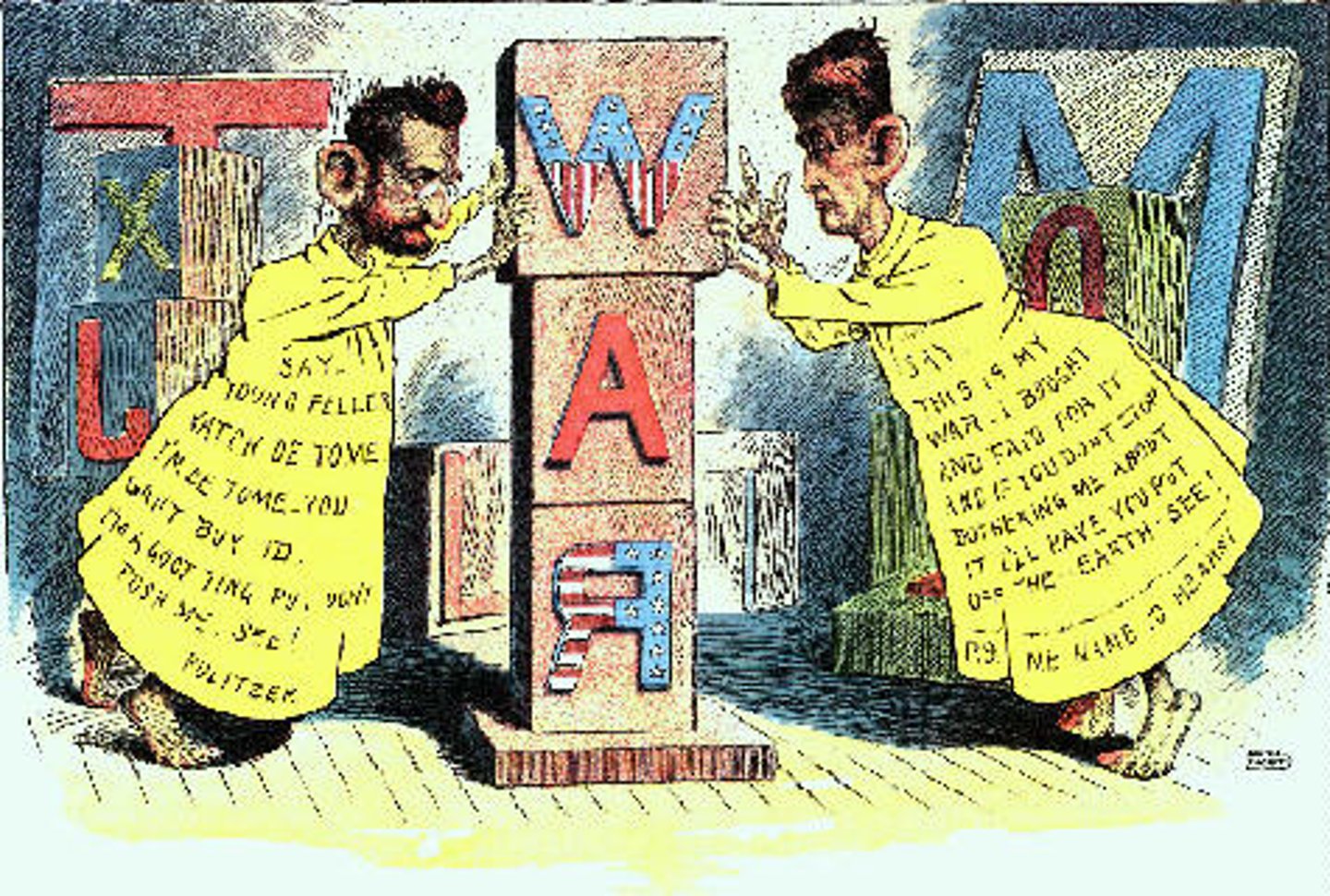
Spanish-American War
War brought about by a desire to help Cuban rebels gain independence from Spain, preserve American economic interests, and yellow journalism. Ends after 4 months with the Treaty of Paris - Spain frees Cuba, gives Guam and Puerto Rico to U.S., and sells the Philippines to the U.S
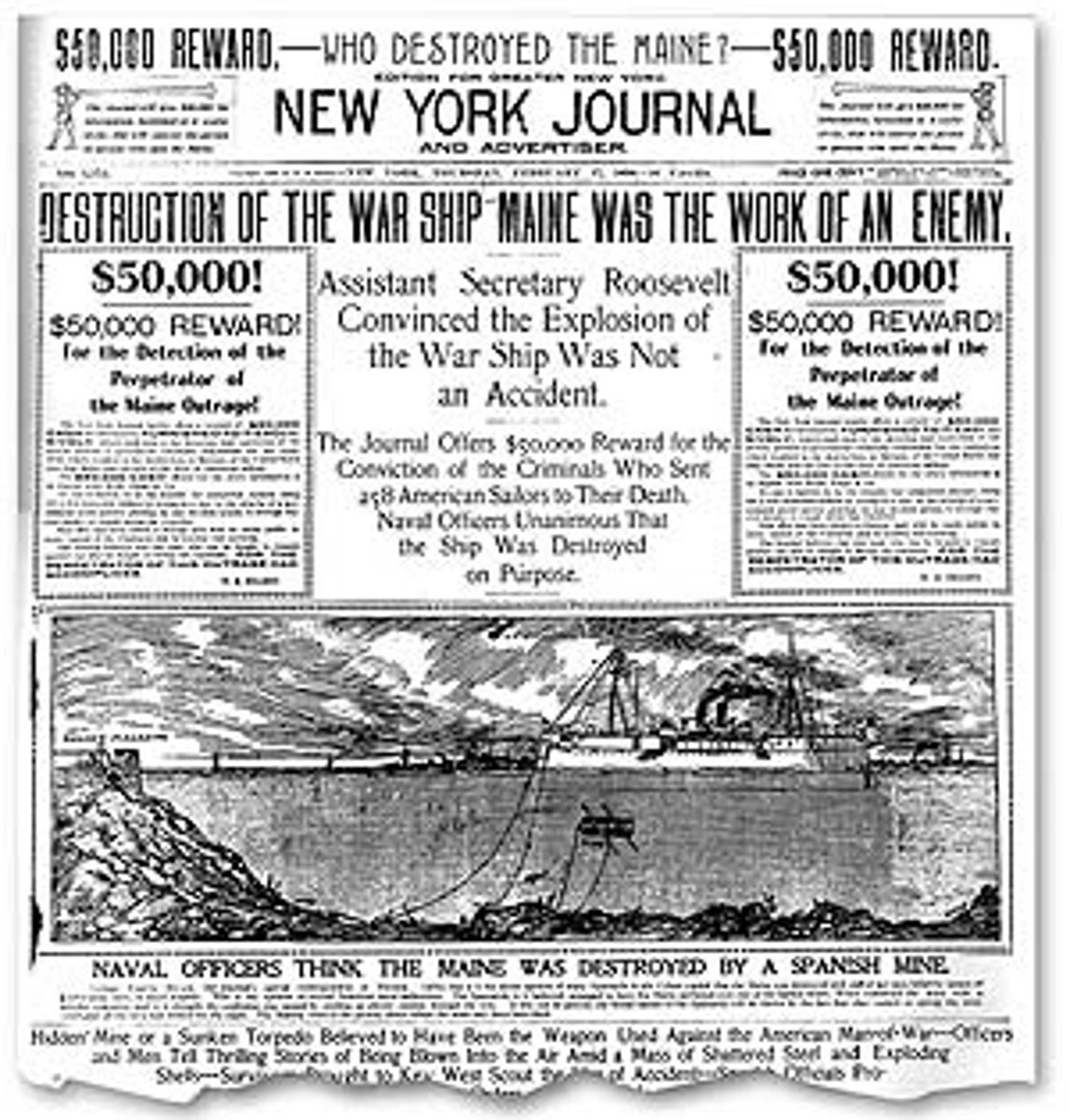
Teller Amendment
Amendment to the war resolution that authorized the Spanish-American war. Ensured that the U.S. would not annex Cuba after the war.
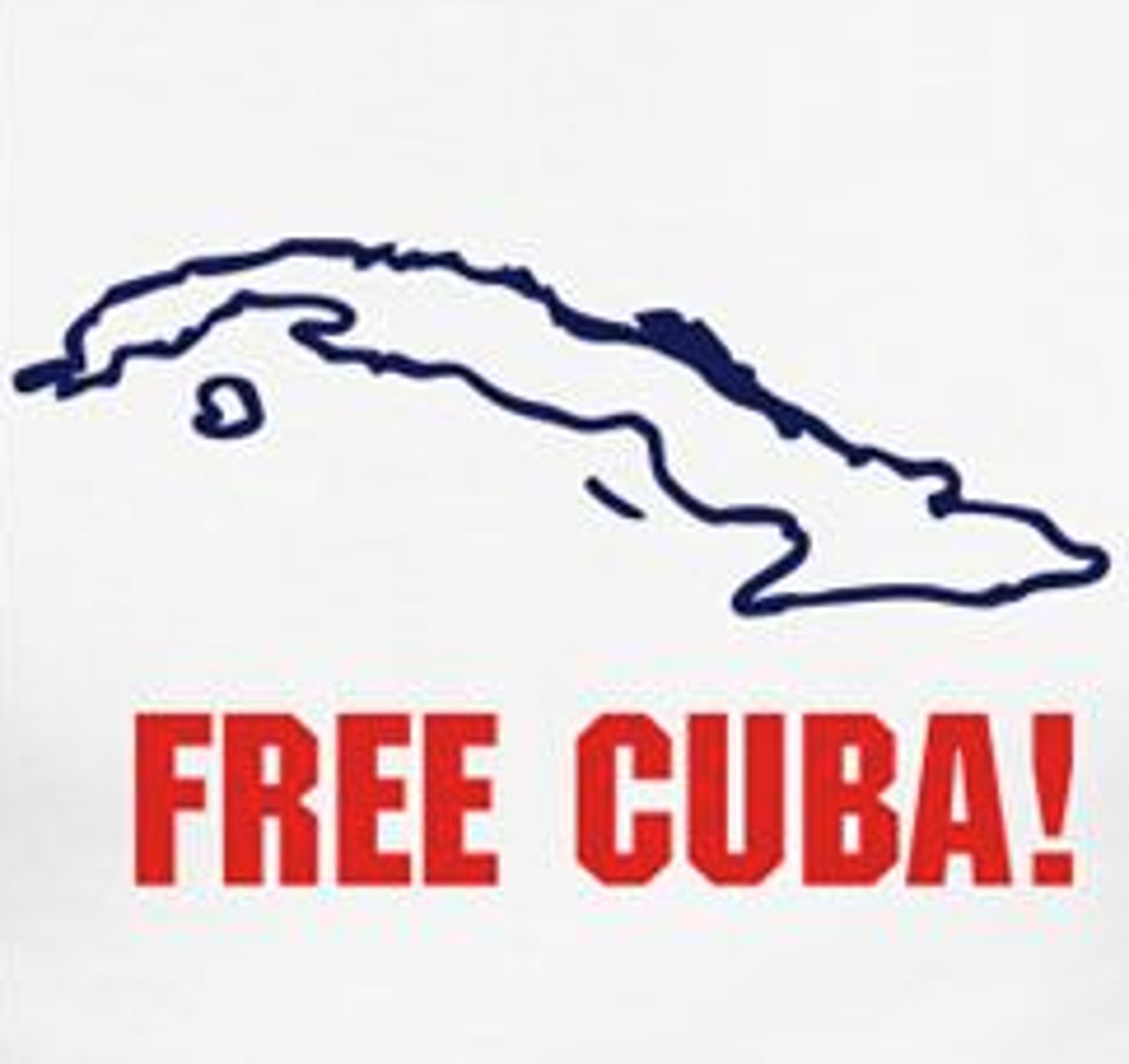
Florida's Role in the Spanish-American War
Cuban immigrants in Florida supported the Cuban revolutionaries. As war grew more certain, the industrialist Henry Plant pushed for troops to be based out of Tampa. Army headquarters were established in his Tampa Bay Hotel and camps were set up around Tampa.
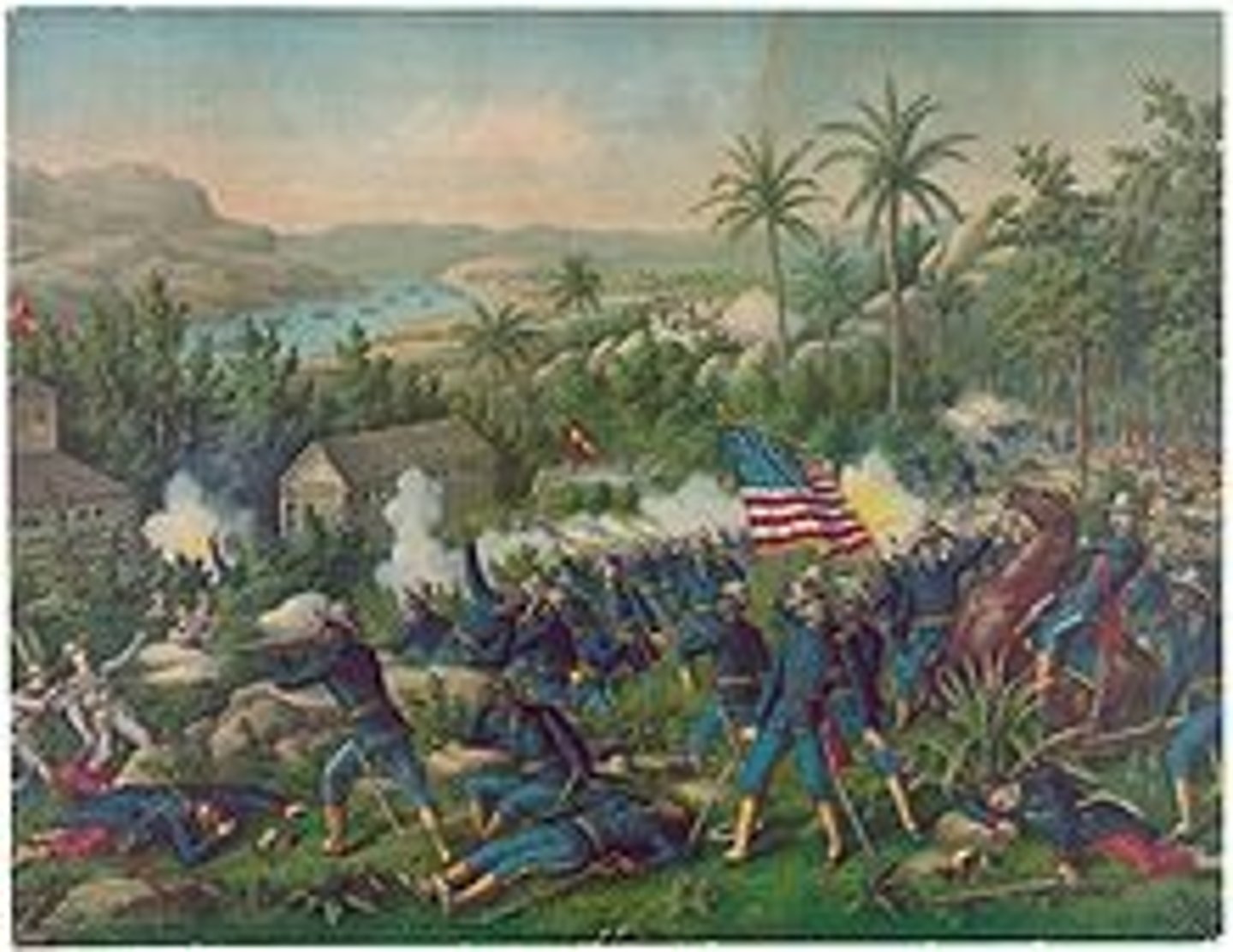
Anti Imperialists
Americans who opposed imperialism. Some believed it was immoral and went against the basic values of democracy. Some feared economic consequences - cheap labor leading to lower wages. Some feared conflict with other imperial powers.
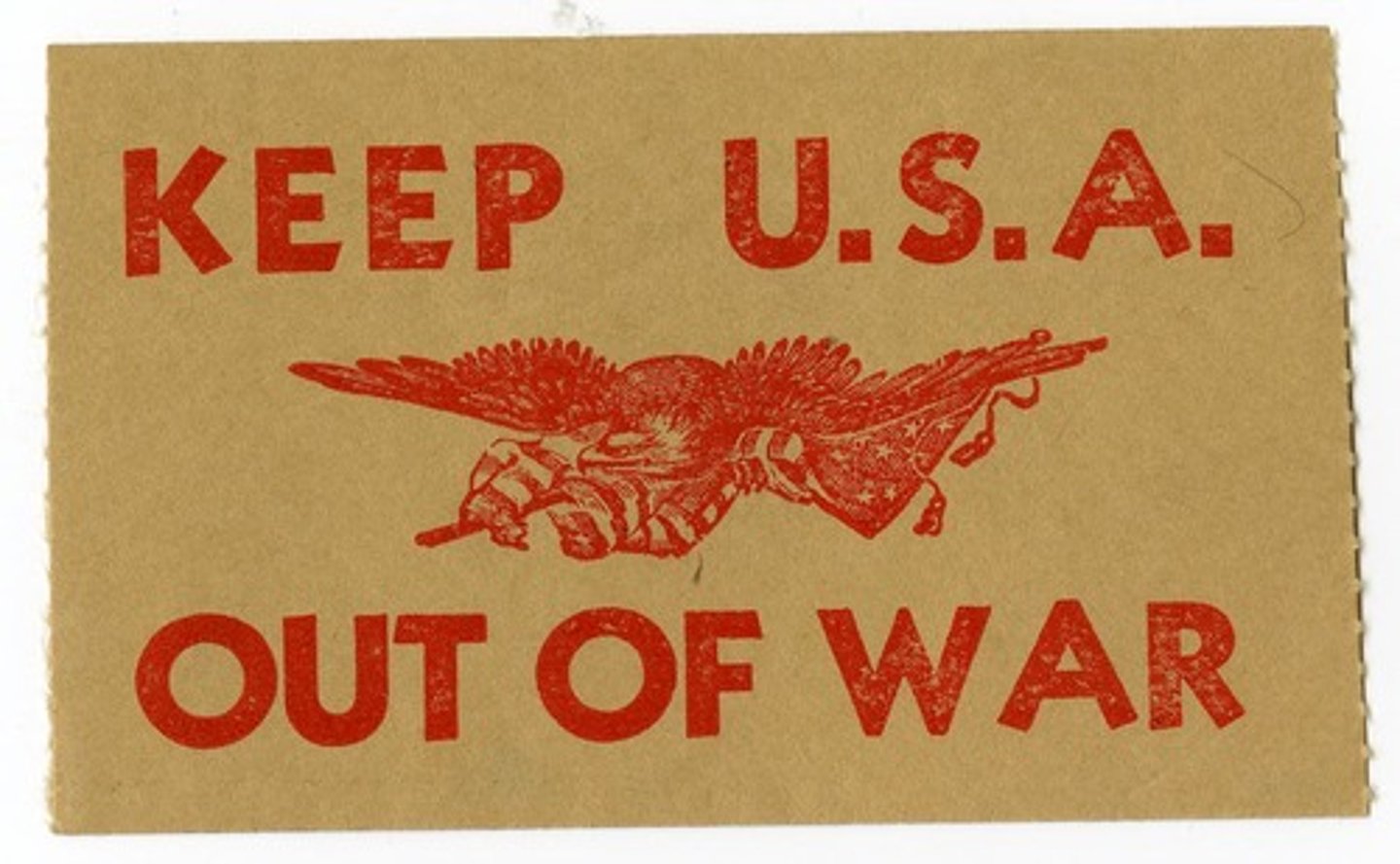
Platt Amendment
Provisions the U.S. required the Cubans to adopt into their new constitution before we would remove U.S. troops after the Spanish-American War. They stated that Cuba could not sign treaties limiting its independence, Cuba could not go into a debt it could not pay, the U.S. reserved the right to intervene, and the US could buy or lease land on the island for naval and refueling stations.
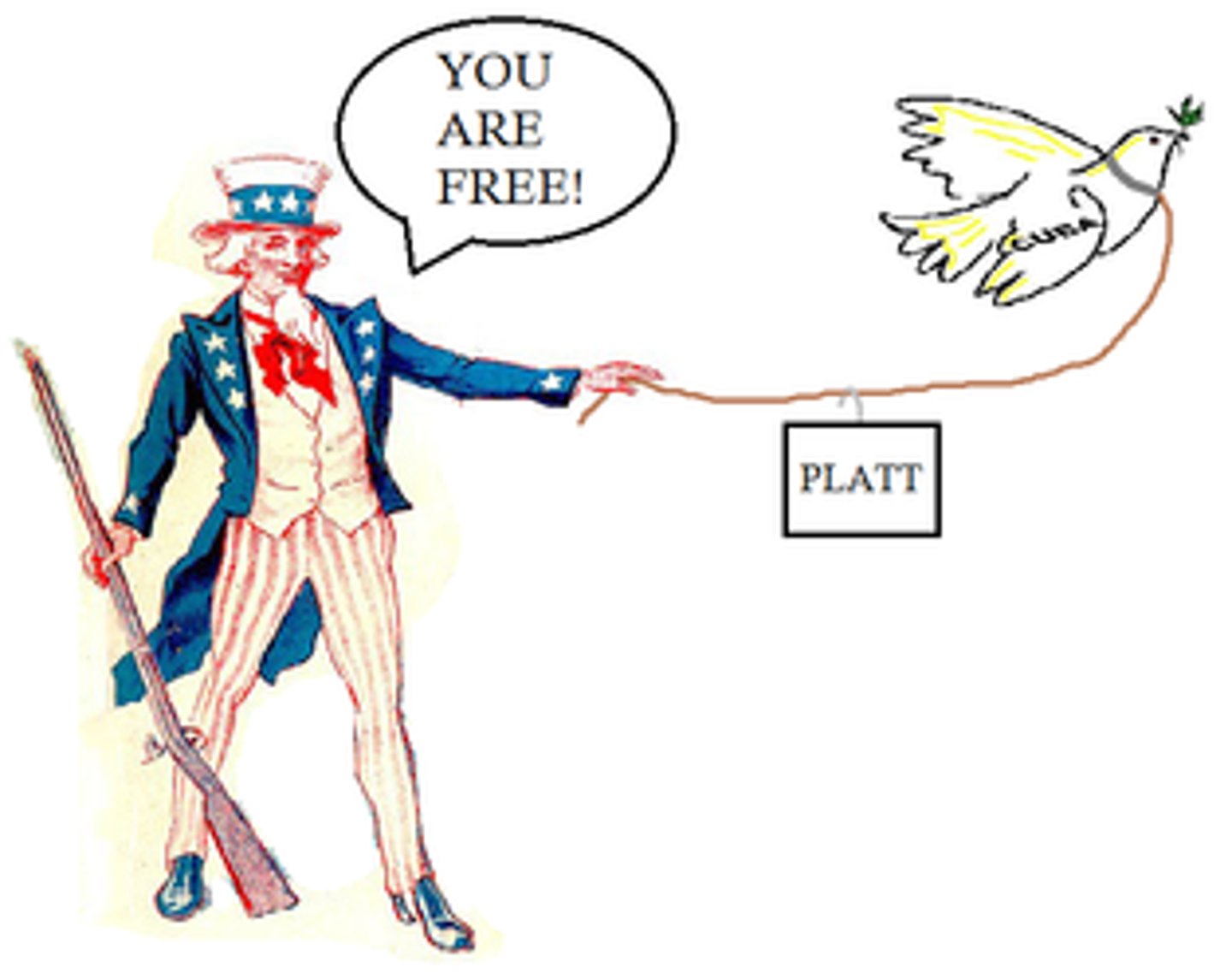
Open Door Policy
Created by U.S. Secretary of State Hay in 1899 when he sent letters to other imperialist nations proposing equal trading rights for all nations throughout China. After the Boxer Rebellion, Hay announced the U.S. would oppose any attempts to divide up China.
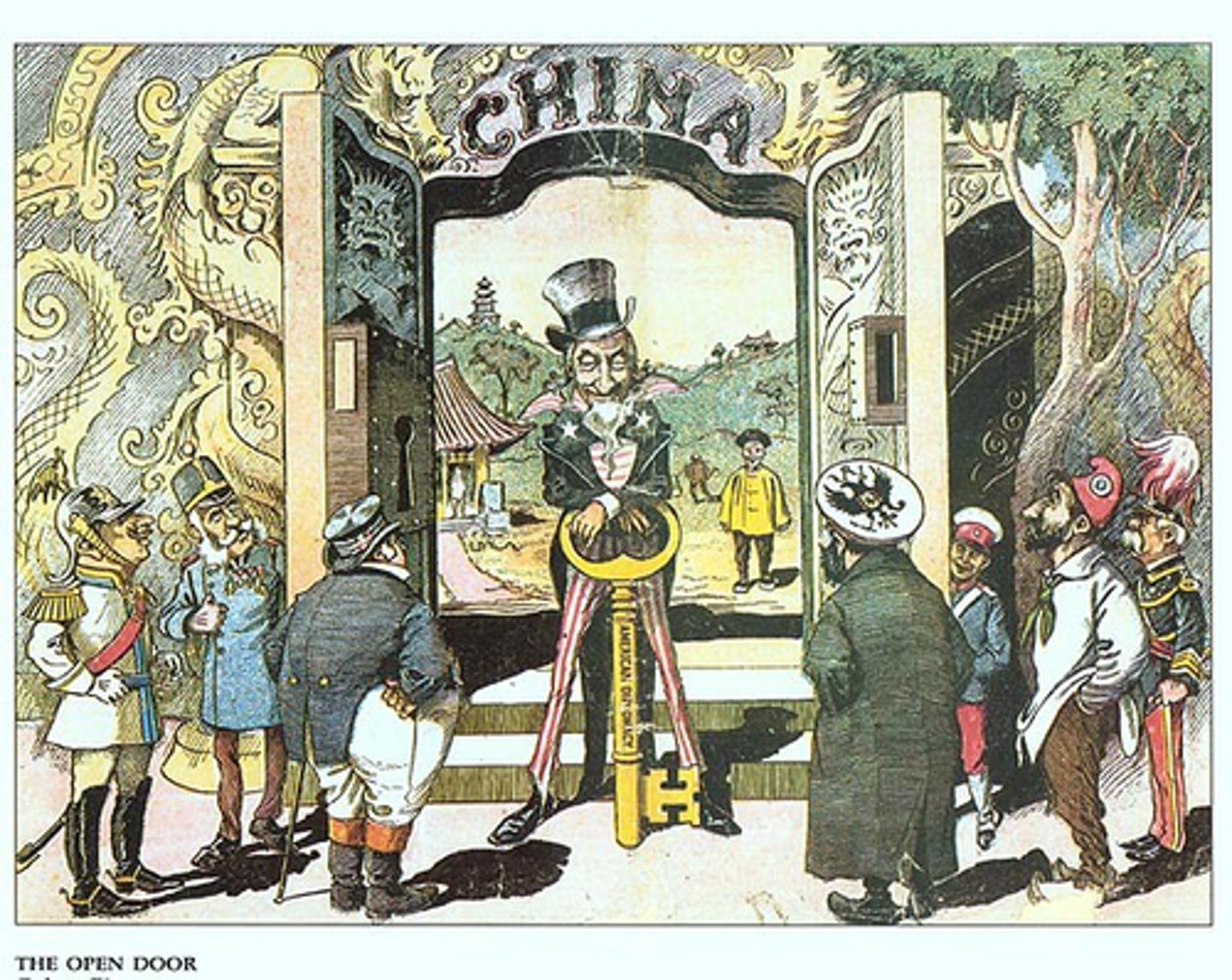
Treaty of Portsmouth (1905)
Peace treaty negotiated by President Theodore Roosevelt between Russia and Japan. Roosevelt won the Nobel Peace Prize for his efforts
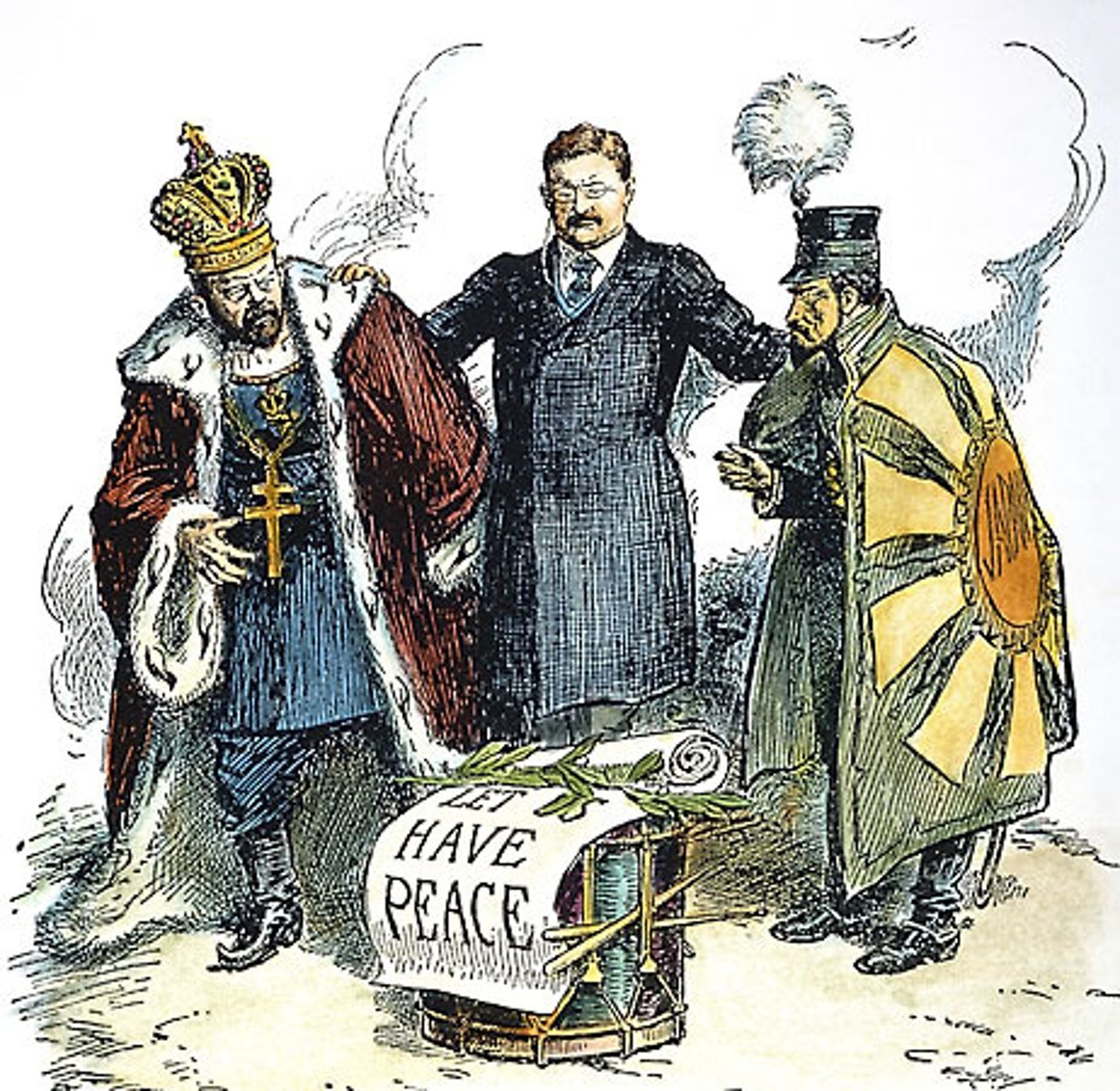
Panama Canal
Canal 40 miles long across the Isthmus of Panama built by the United States (1904-1914) - created a shortcut between the Atlantic and Pacific Oceans. Construction was difficult - cut through hills and jungle; mosquitos carrying malaria and yellow fever required draining of swamps; had to rebuild the railway to transport construction equipment
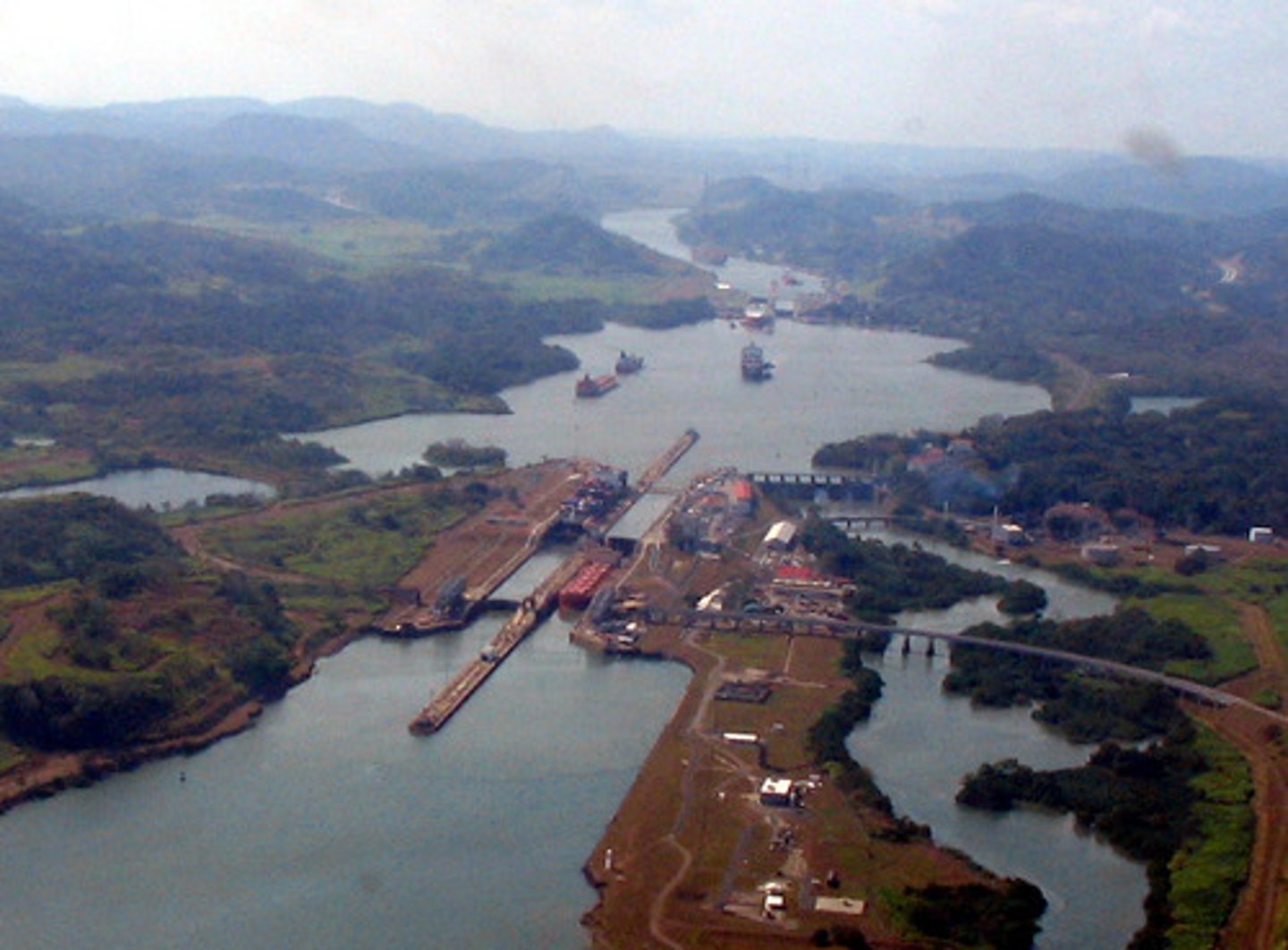
Big Stick Diplomacy
Roosevelt's foreign policy based on a proverb that said, "Speak softly and carry a big stick." It is the idea of negotiating peacefully, while simultaneously threatening with the military
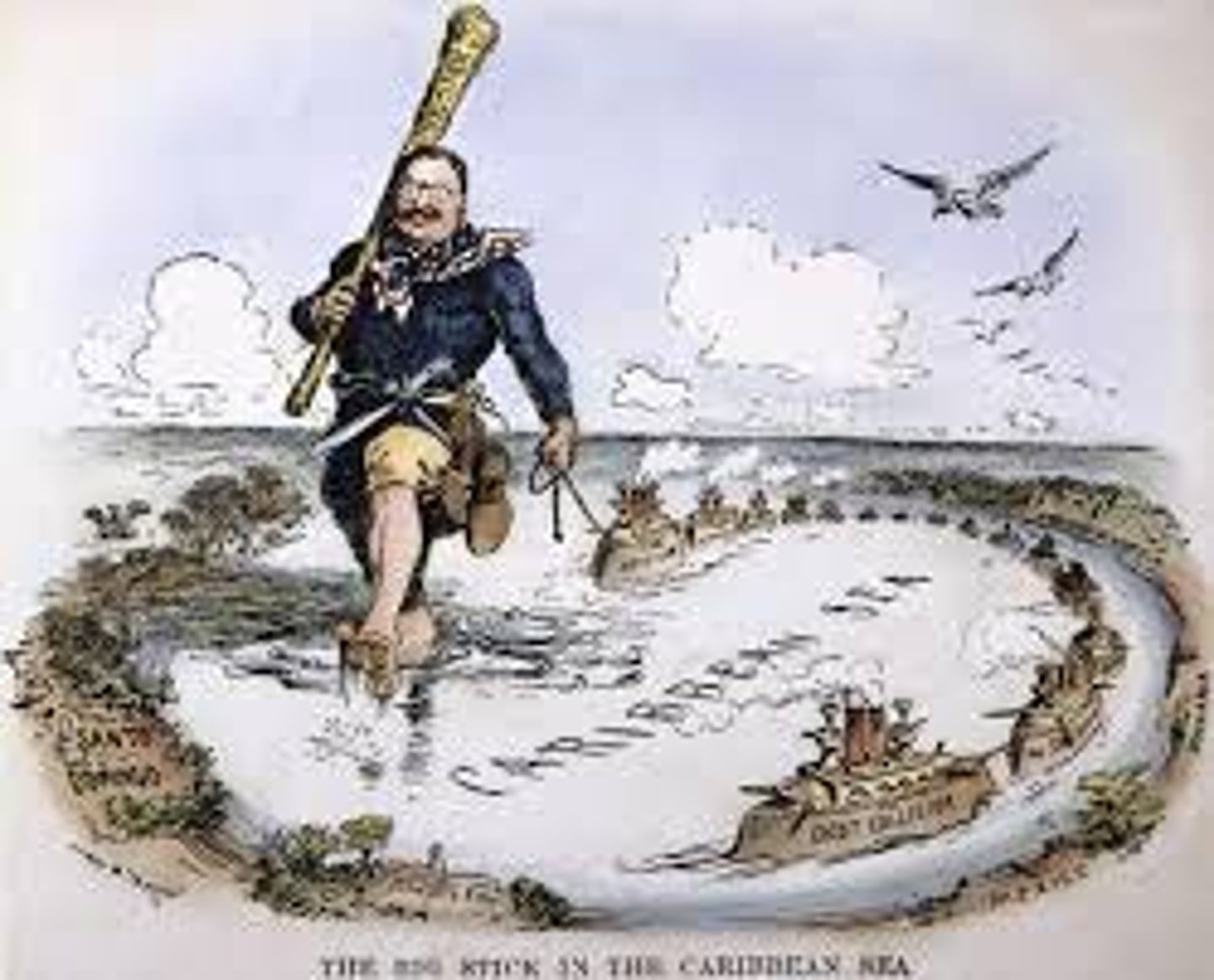
Roosevelt Corollary
Added to the Monroe doctrine, basically saying that the U.S. would now use force to protect its economic interests. Deeply resented by most Latin Americans.
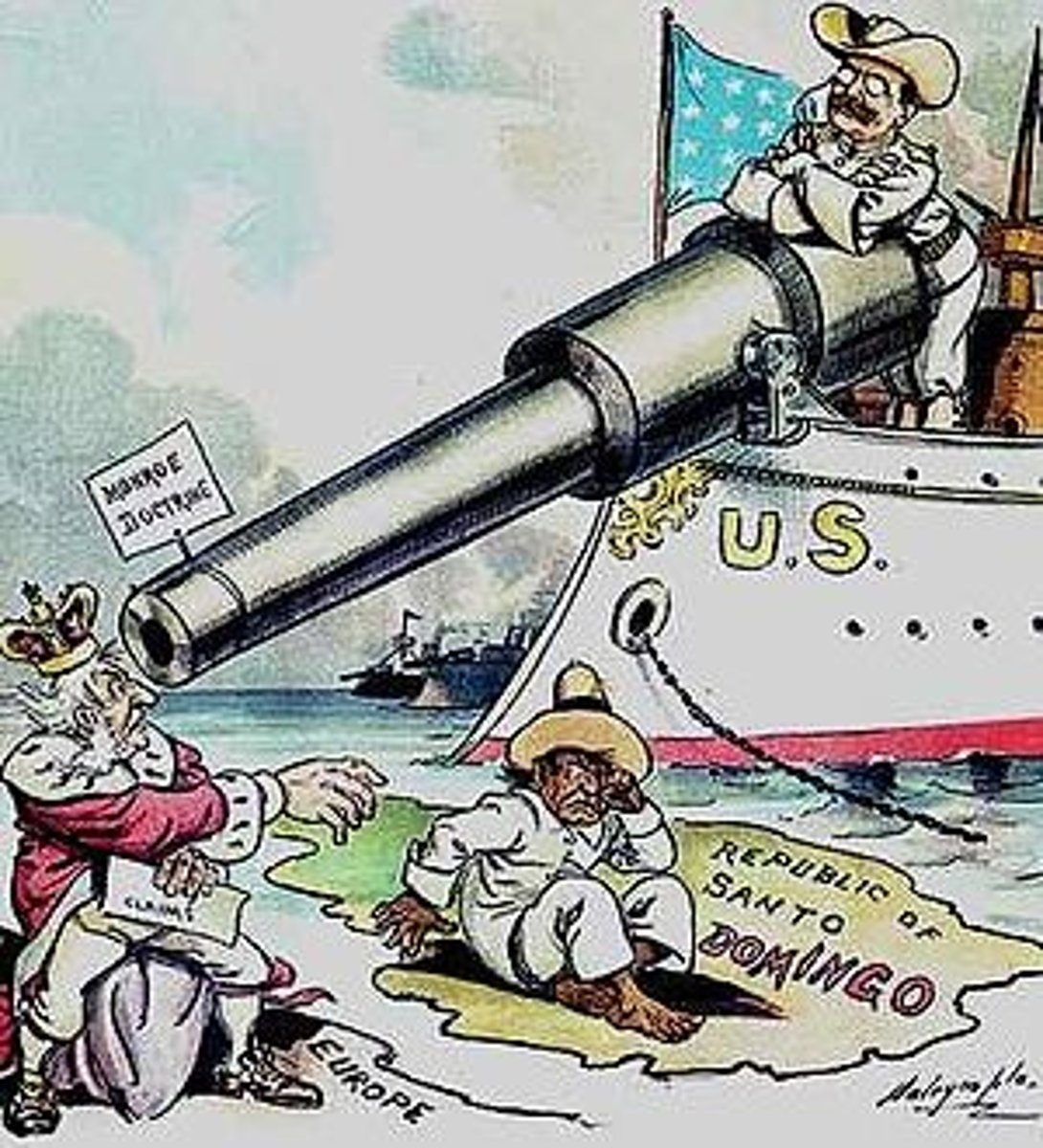
Causes of WWI
-Nationalism
-Economic rivalries and Imperialism
-Militarism
-Entangling alliances
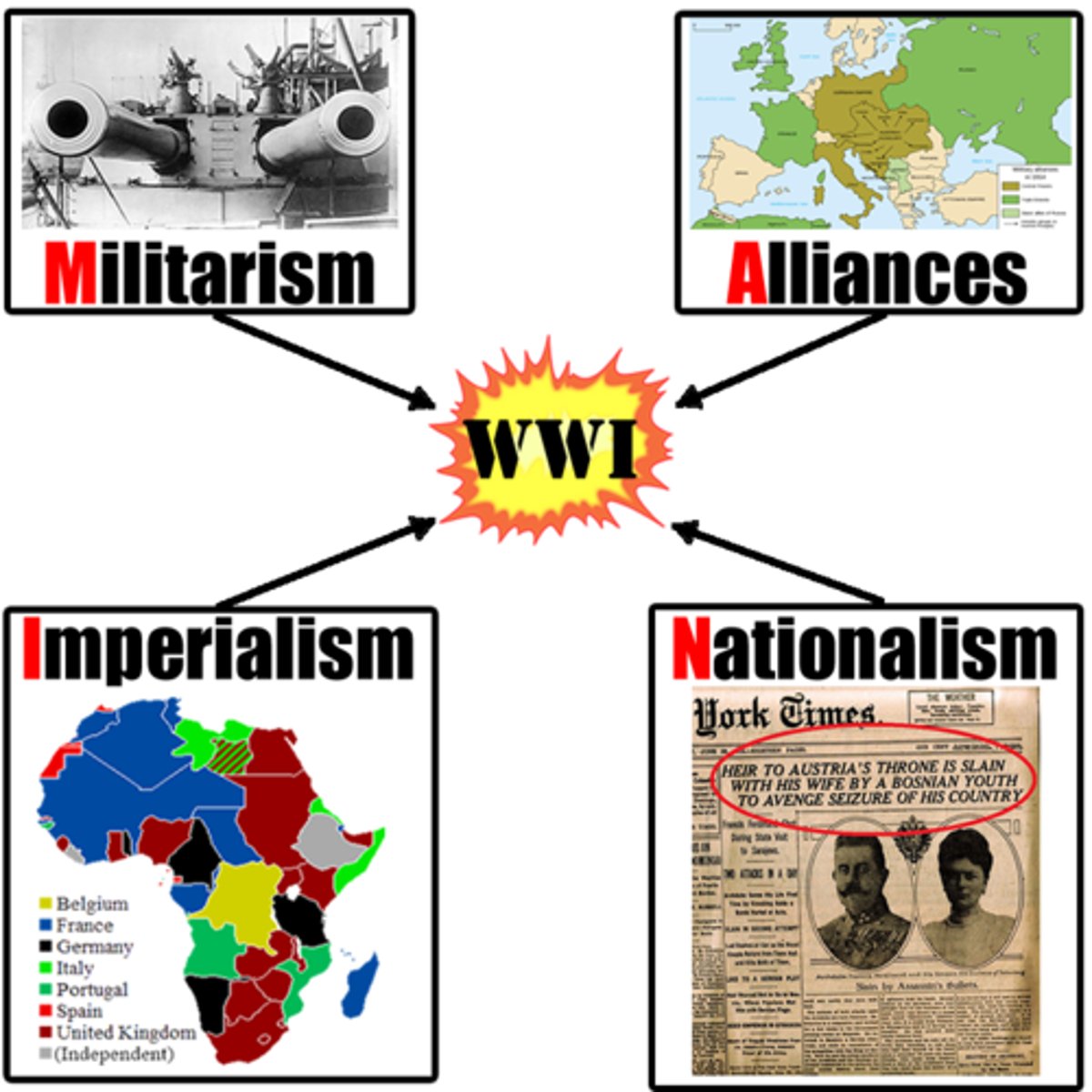
Lusitania
British liner sunk by a German U-boat in 1915. Almost 1200 people died - 128 were Americans. Turned American public opinion against Germany and the Central Powers.
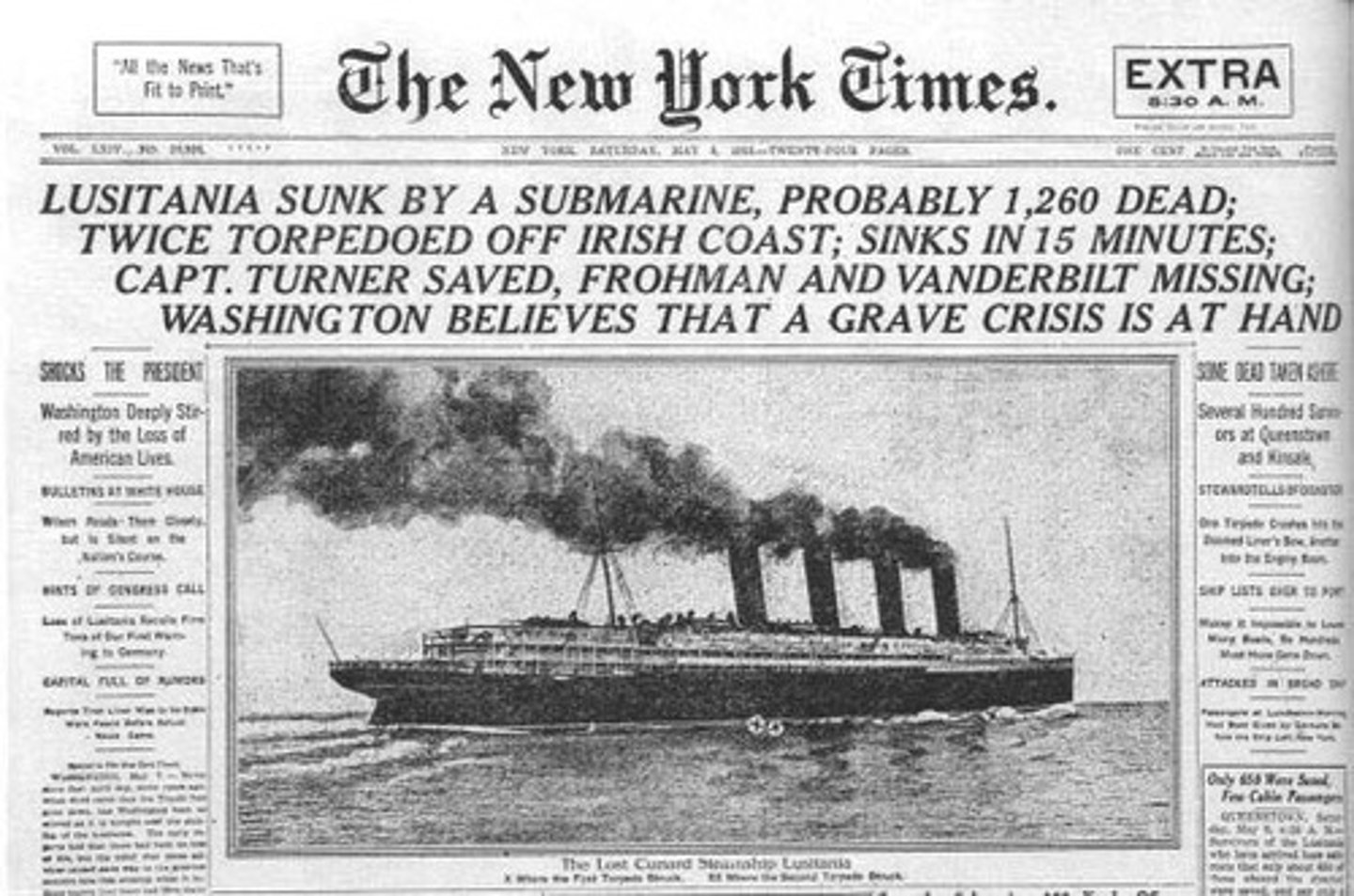
Sussex Pledge
A promise Germany made to America in 1916 - after President Wilson threatened to sever ties - to stop sinking their ships without warning. Germany started unrestricted submarine warfare within a year - helped push the U.S. to declaring war.
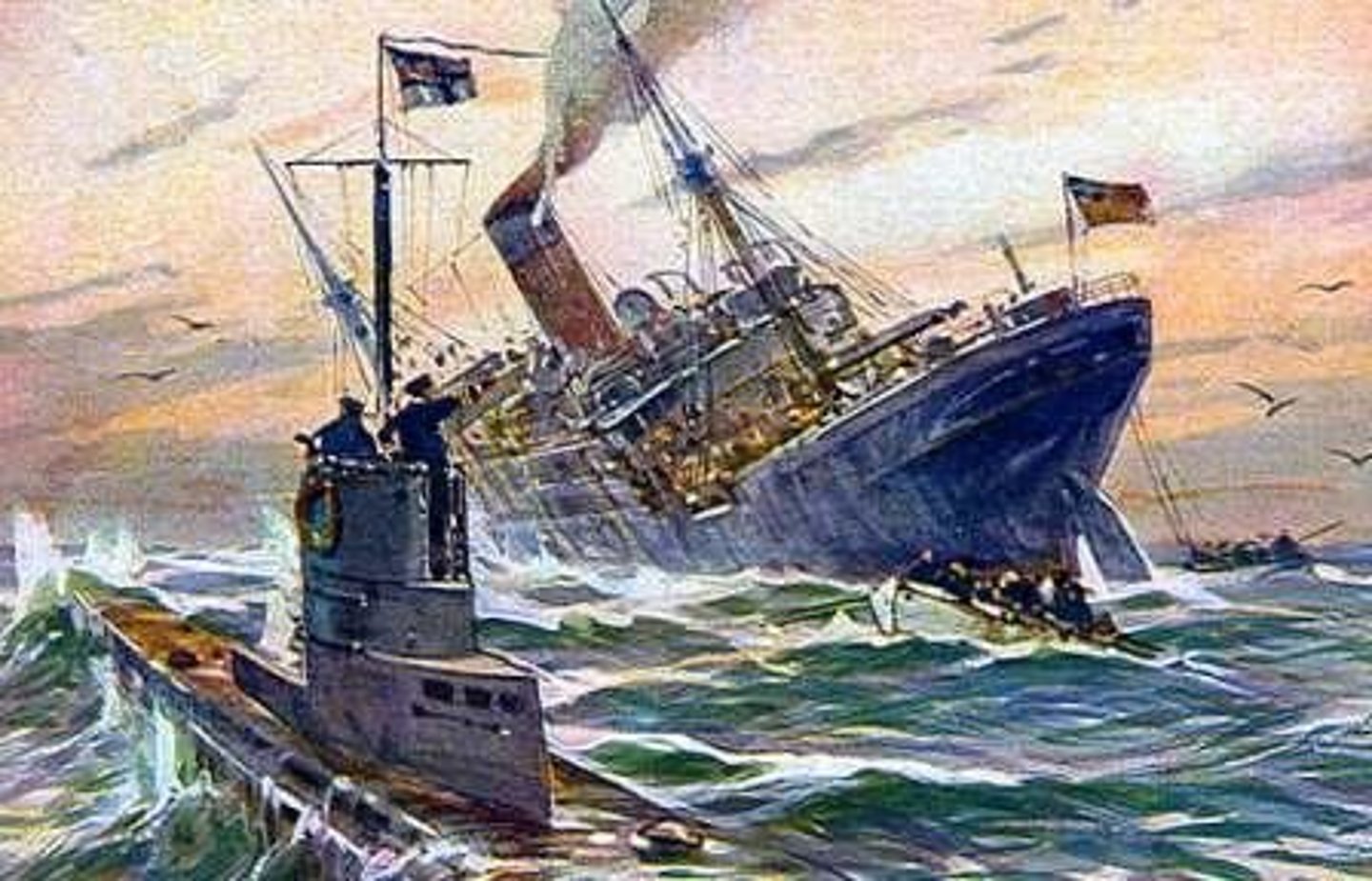
Zimmerman Telegram
Intercepted telegram from the German foreign minister promising the return of lost territory in Texas, New Mexico, and Arizona if Mexico allied with Germany against the U.S. Printed in U.S. newspapers in 1917 - helped push the U.S. to declaring war
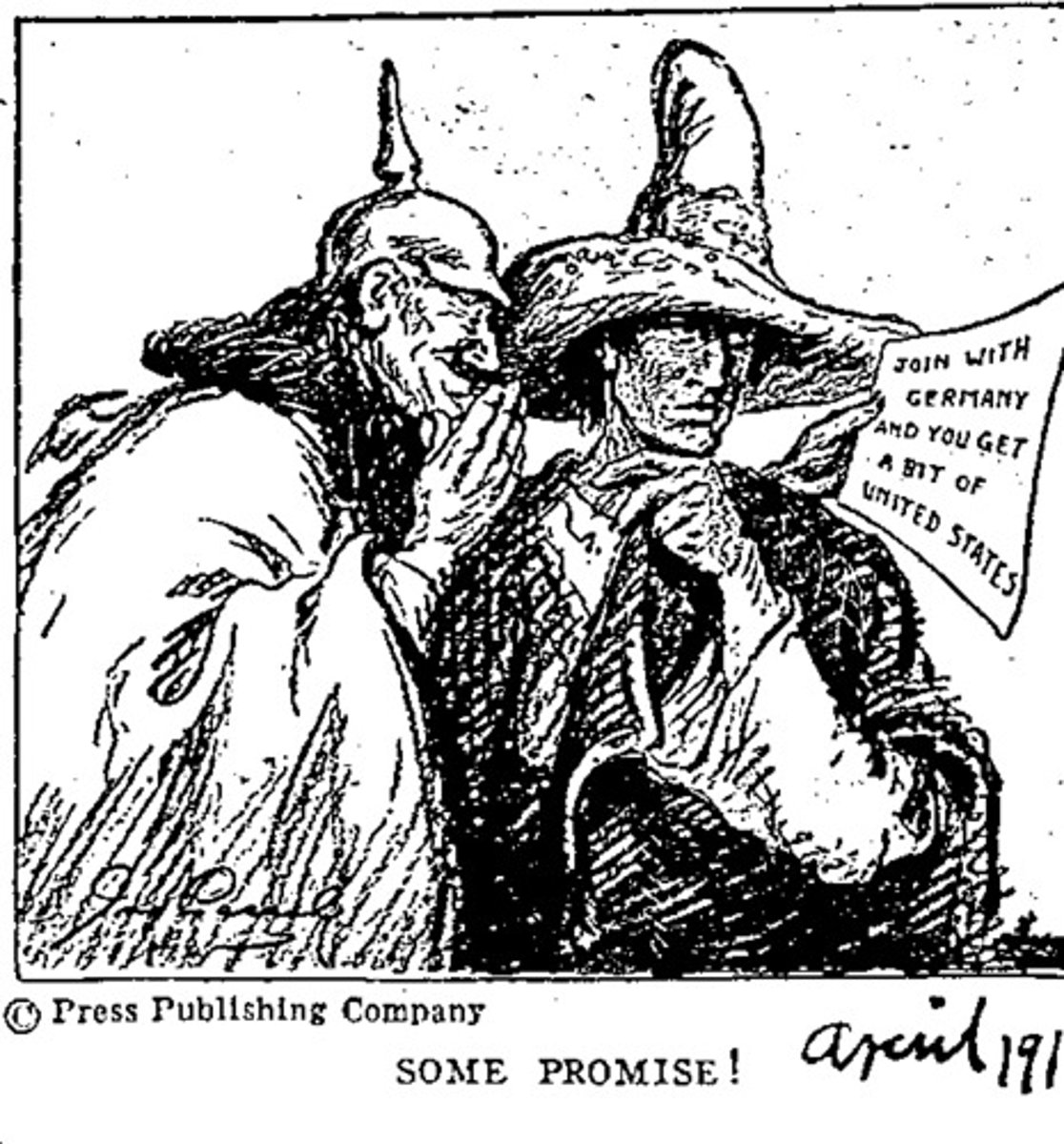
Selective Service Act
Passed in 1917 - requires men to register with the government in order to be randomly selected for military service. Helped the government supply manpower for the military
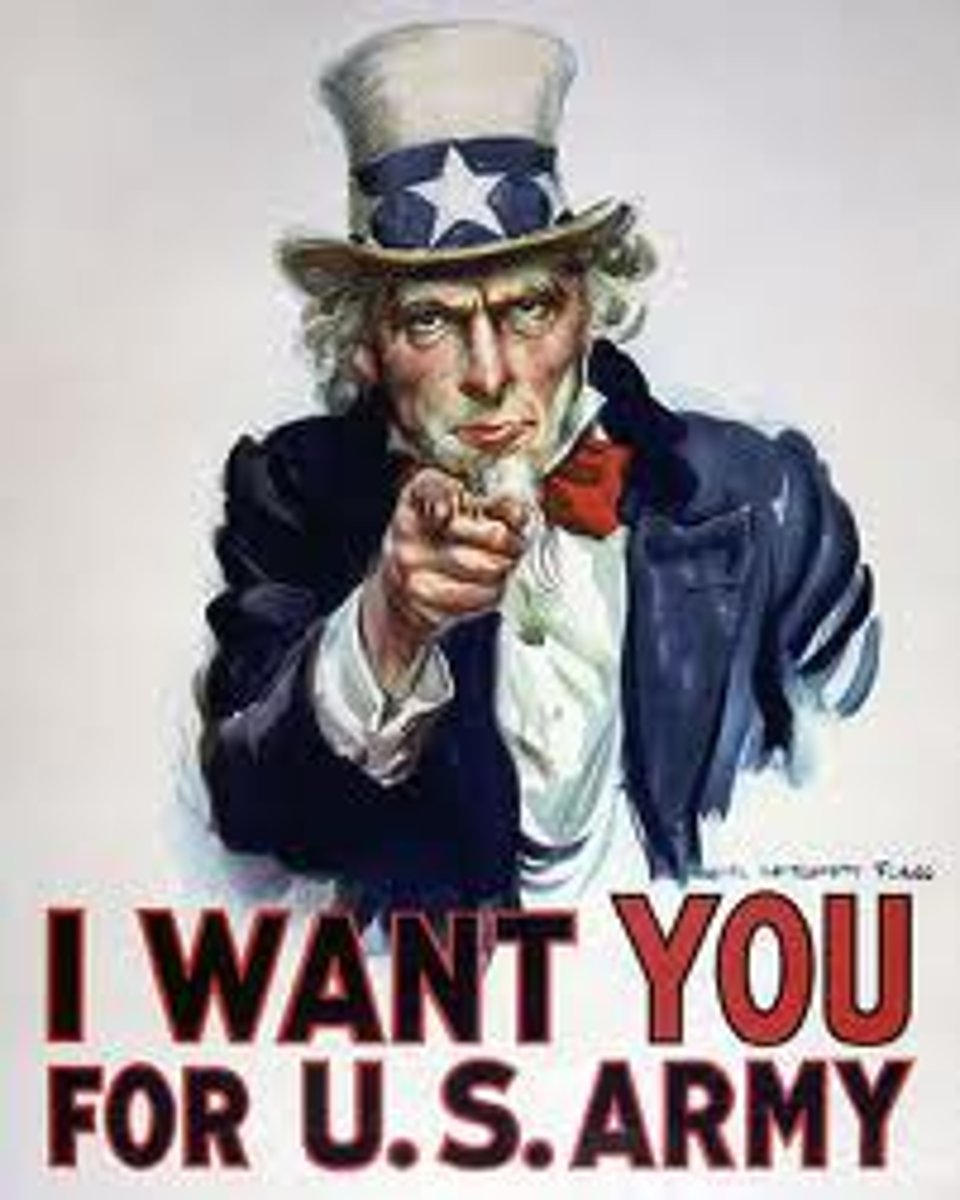
African Americans in WWI
400,000 served in the armed forces - more than half in France. Served in segregated units and were excluded from the navy and marines. Two men, Henry Johnson and Needham Roberts, were the first Americans to receive France's highest military honor, the Croix de Guerre.
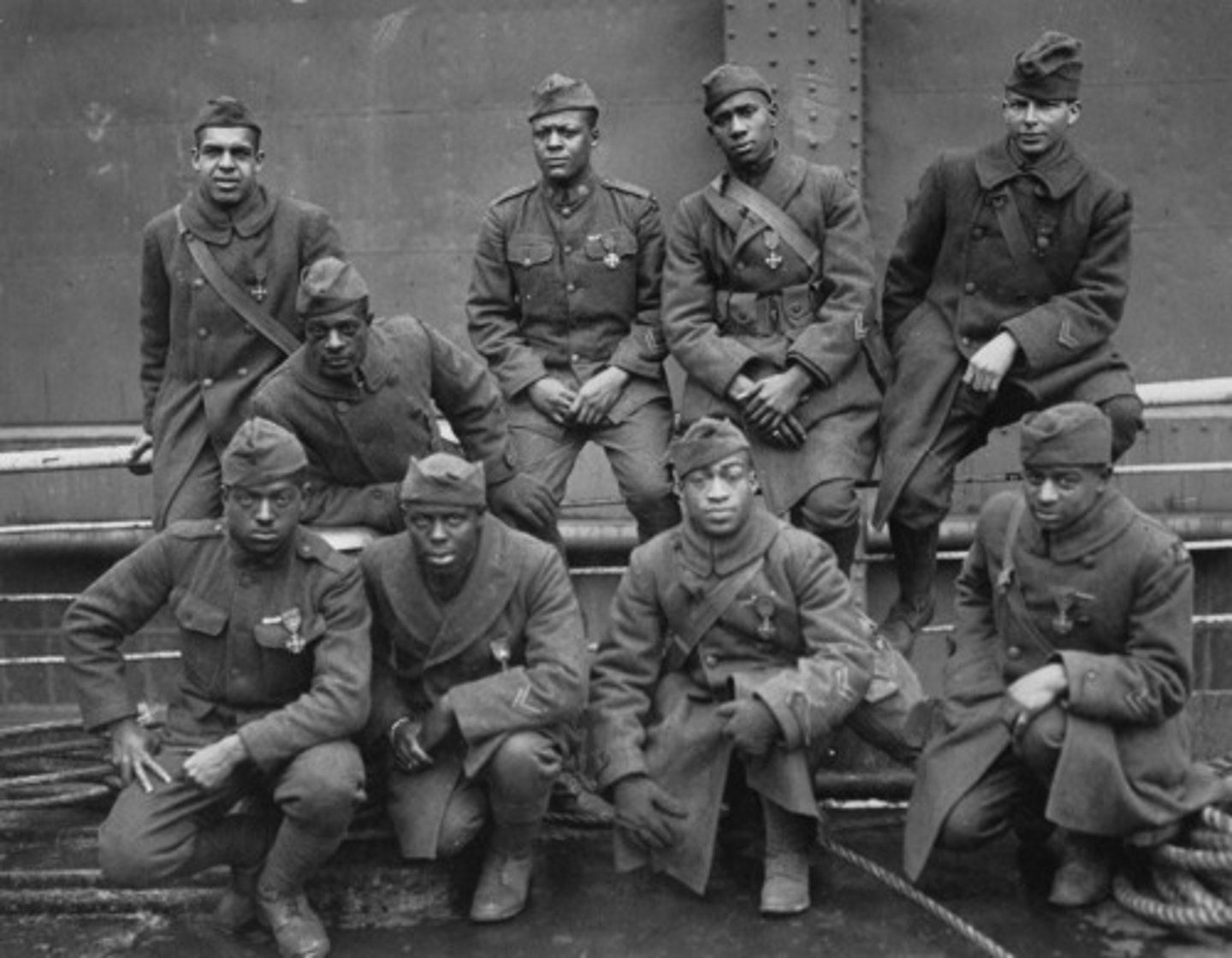
War Industries Board (WIB)
Regulated the economy during the war - encouraging businesses to use mass-production and standardize products. Prices and profits increased.
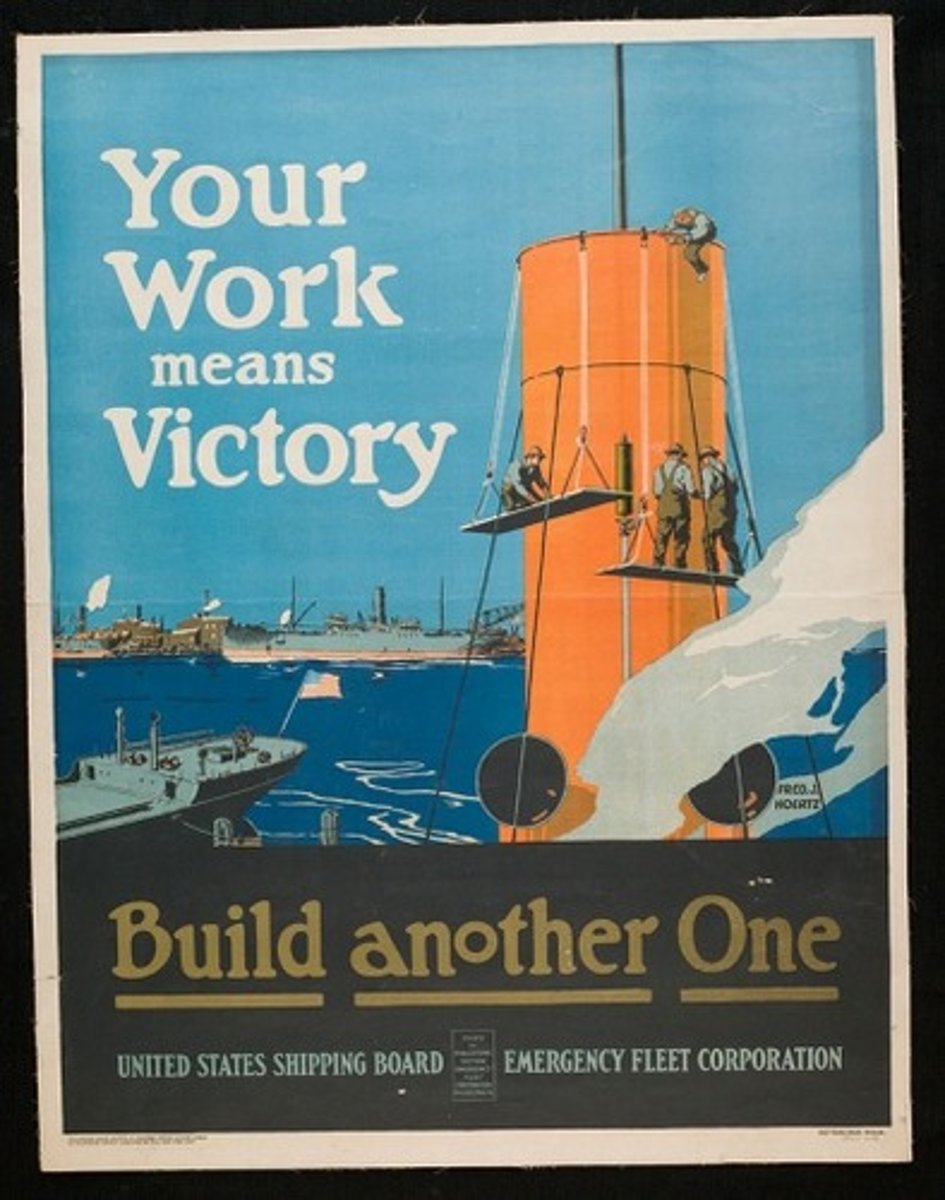
Committee of Public Information (CPI)
Government propaganda agency created to promote the war to the American public.
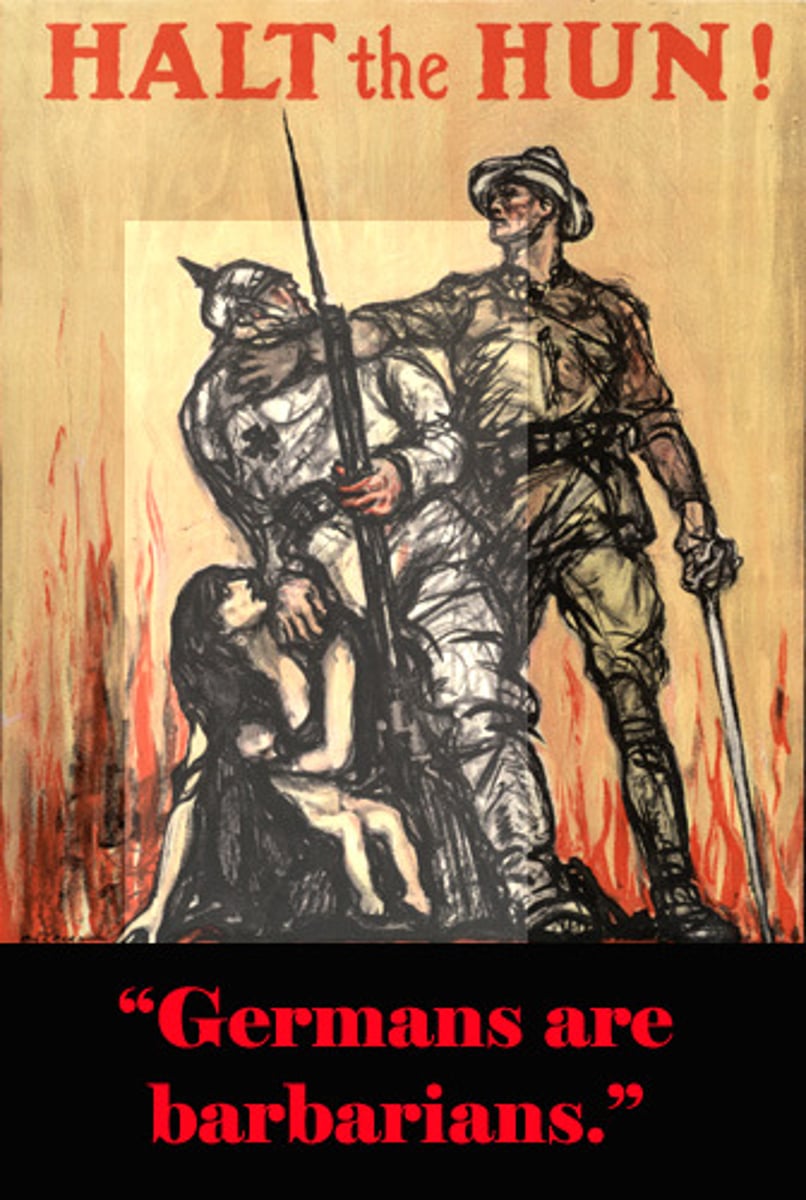
War bonds
Also known as "Liberty Bonds" Way to pay for the war, American public purchased them to prove their patriotism
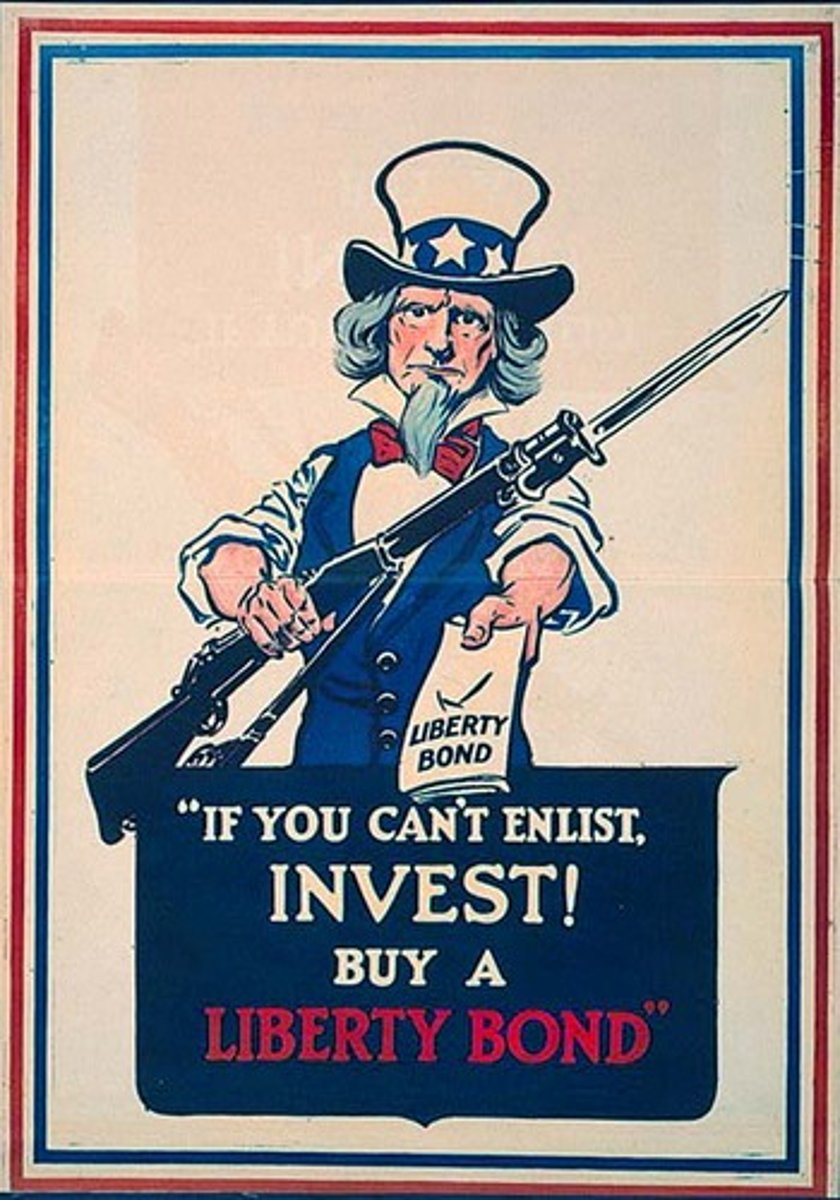
Espionage Act
1917 law creating procedure for detecting and imprisoning spies. Government could censor the mail and arrest anyone for interfering with the draft. Led to Schenck v U.S. - Supreme Court upheld limits on free speech when "a clear and present danger" is evident.
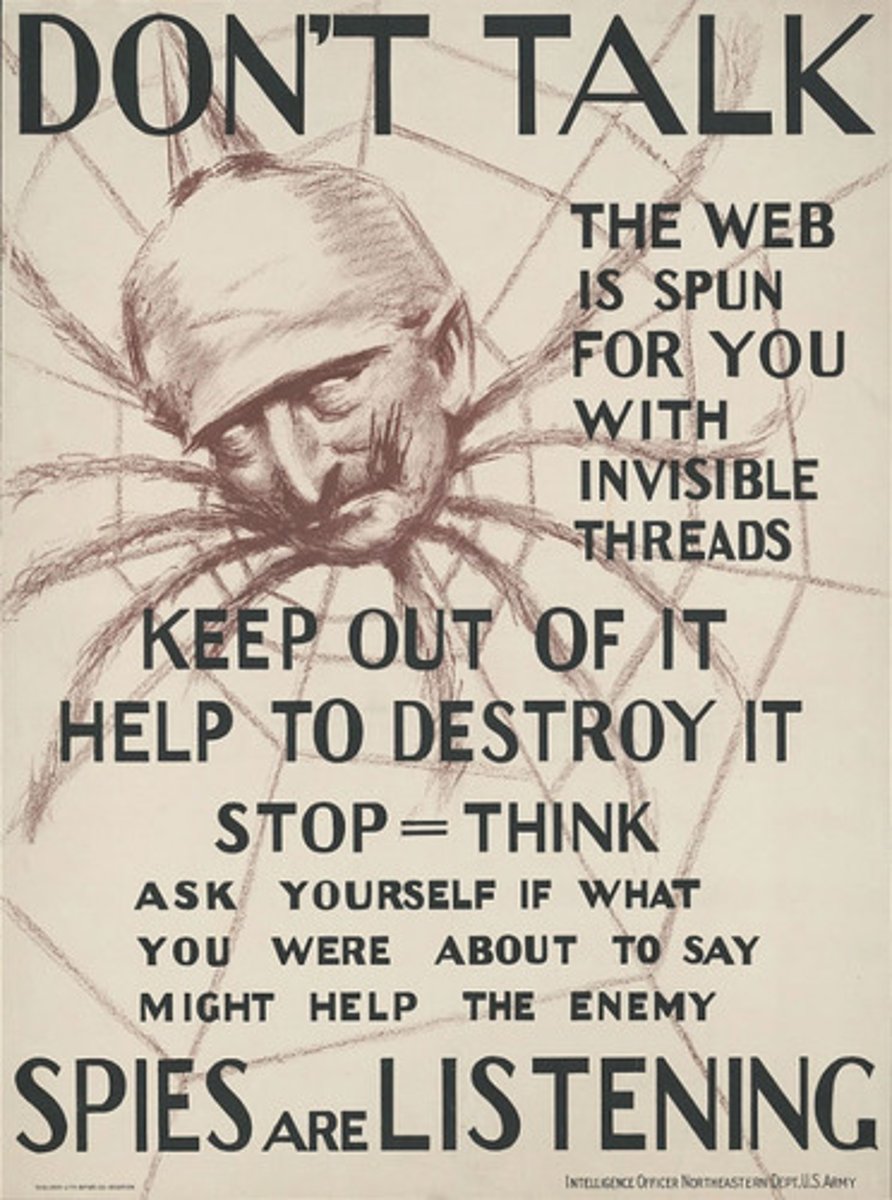
Sedition Act
1918 law against disloyal or abusive language against the government, flag, or Constitution.
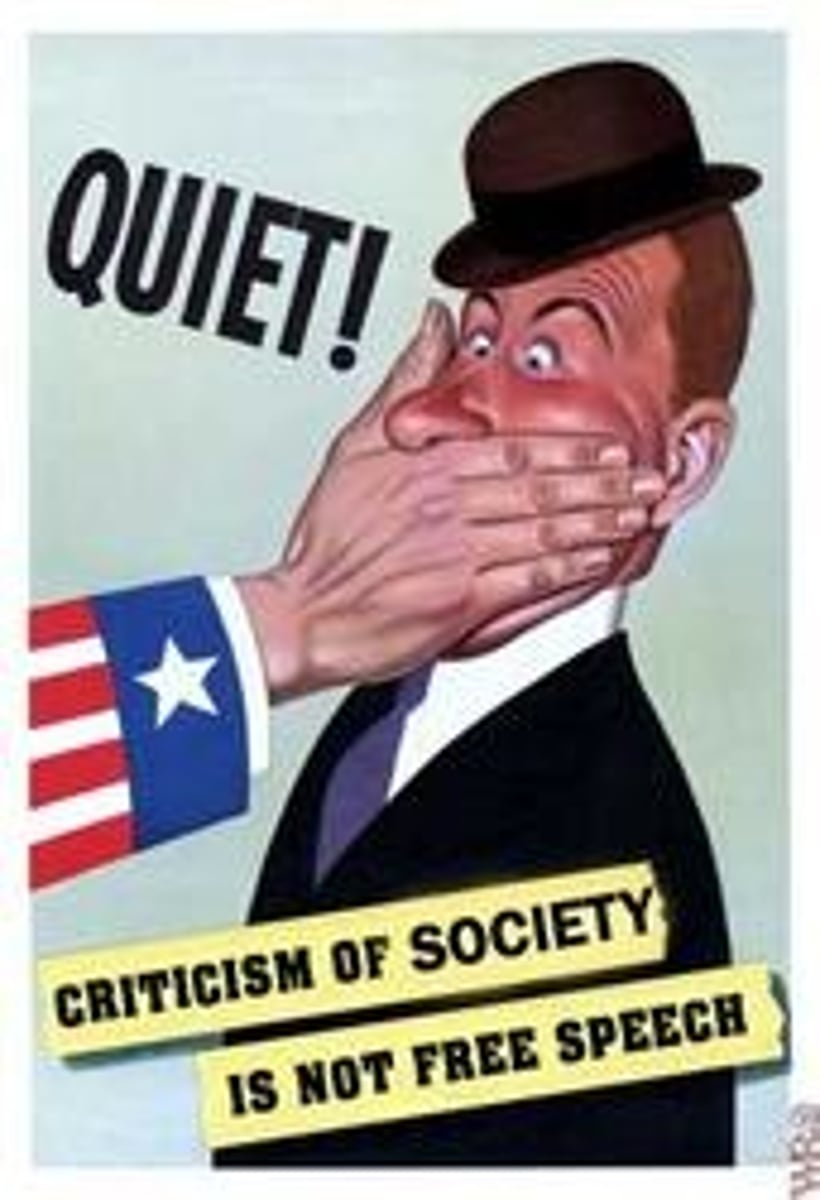
Fourteen Points
President Wilson's plan for peace: First five points to prevent another war: no secret treaties, freedom of the seas for all, foster more free trade, reduction of arms, and consider the interest of colonial peoples. Next eight deal with boundary changes. Last is the creation of a League of Nations. Allied leaders wanted to impose a harsher treaty on Germany.
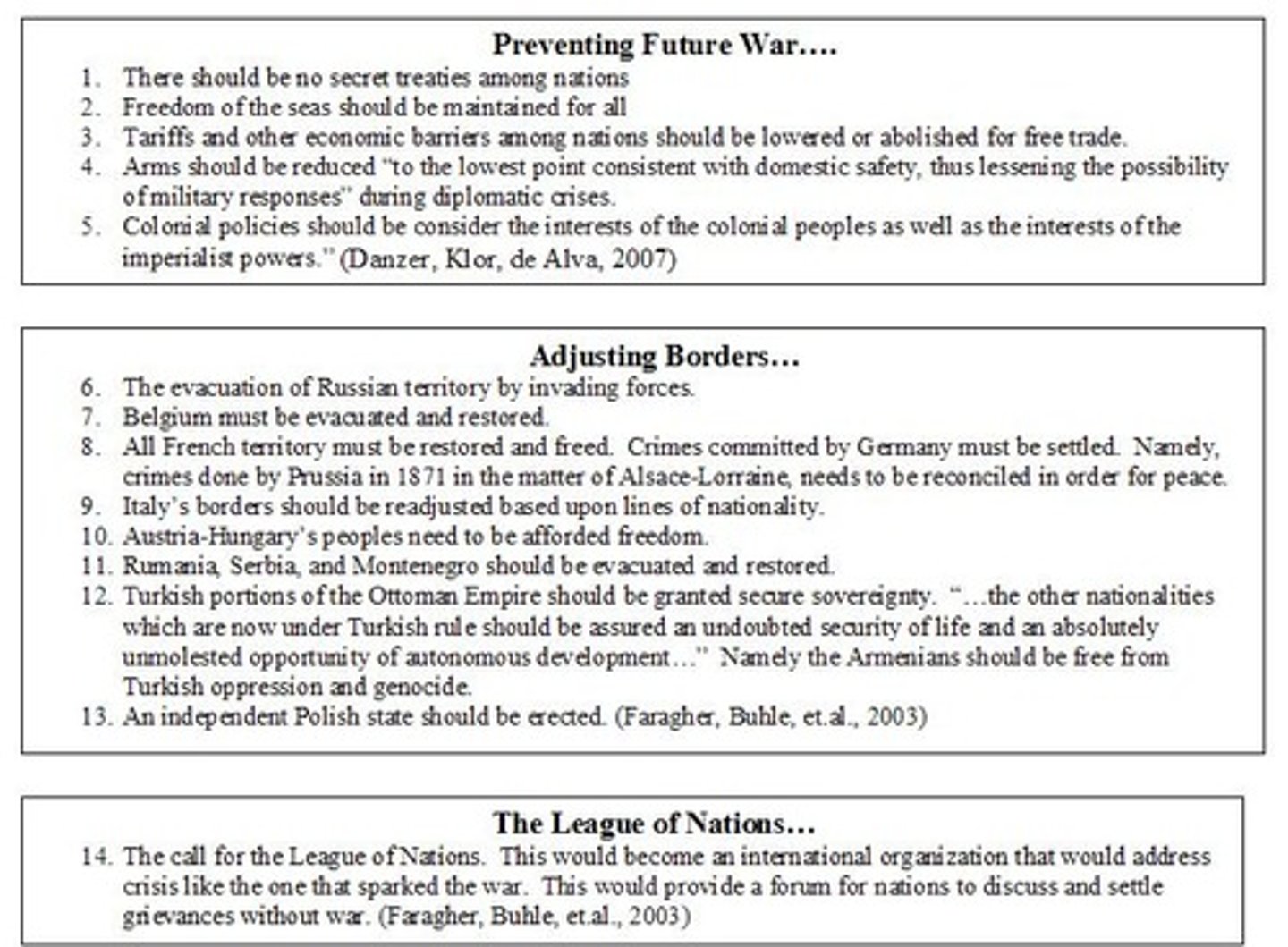
Treaty of Versailles
Peace treaty creates 9 new nations, shifted other boundaries, barred Germany from maintaining an army, required Germany to take the blame for the war, and pay reparations ($33 billion) to the Allies. Creates many new problems - humiliates Germany, excludes Russia, ignores colonized peoples' claims for self-determination.
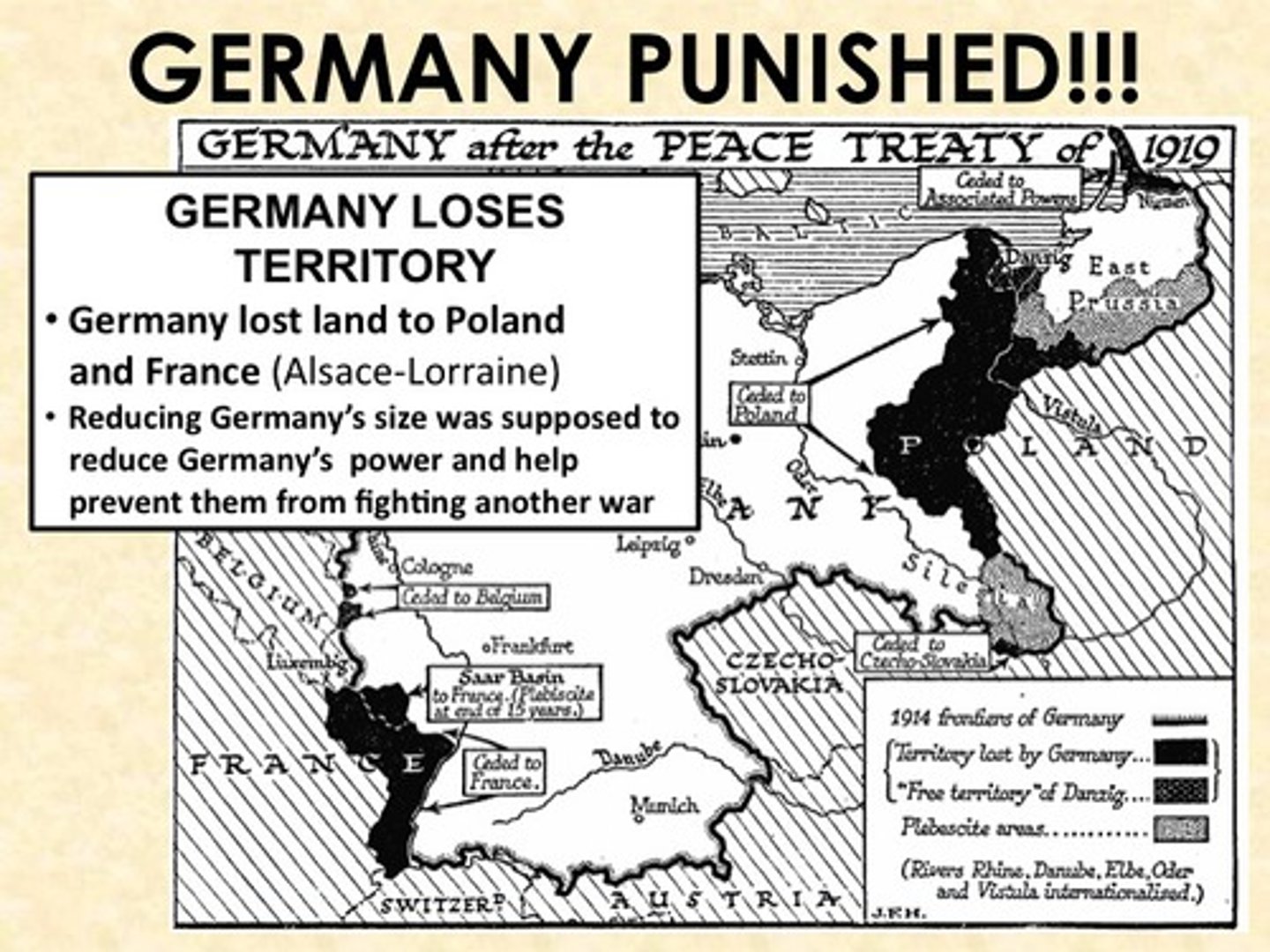
Big Four
Leaders from U.S., France, Britain, and Italy who worked out the Treaty of Versailles. President Wilson conceded on most of his Fourteen Points to keep the League of Nations.
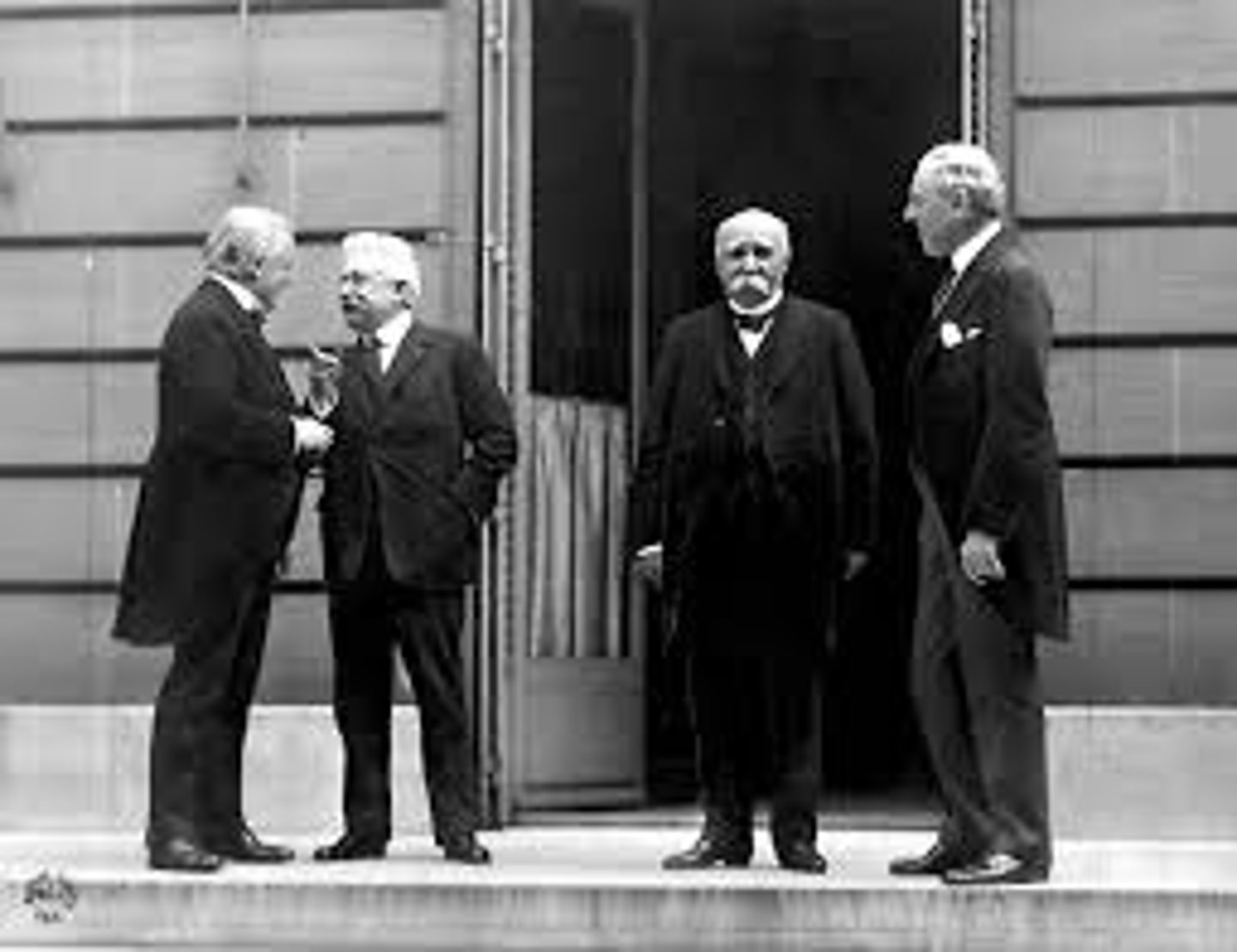
League of Nations
International organization to address diplomatic crises proposed in the Treaty of Versailles. U.S. never ratified the Treaty of Versailles, primarily because the League of Nations threatened the established U.S. policy of isolationism.
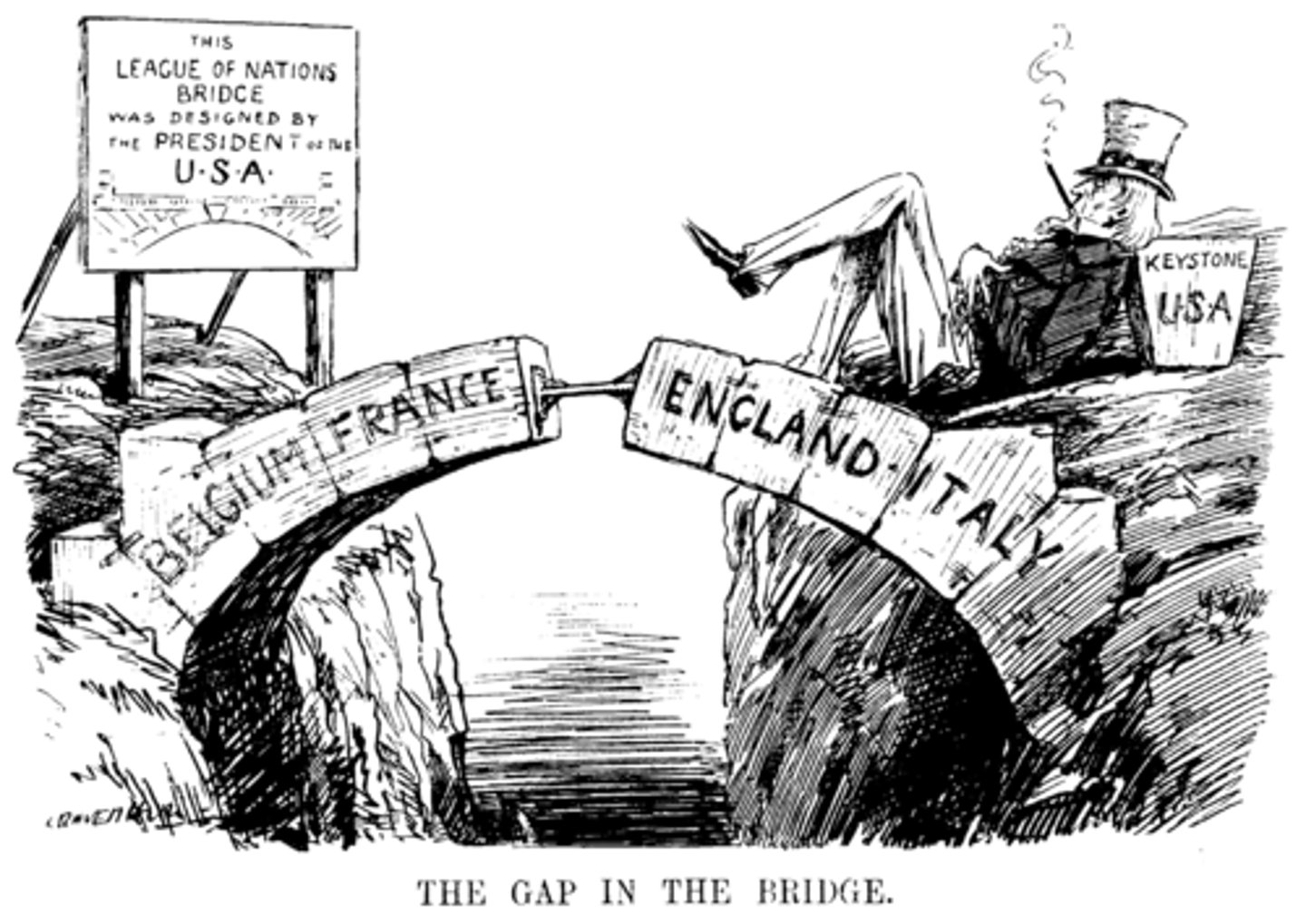
Domestic Consequences of WWI
Strengthened the U.S. military and the power of the government. Accelerated social change for African Americans (Great Migration) and women (over one million in the work force). Intensified anti-immigrant, anti-radical sentiments.
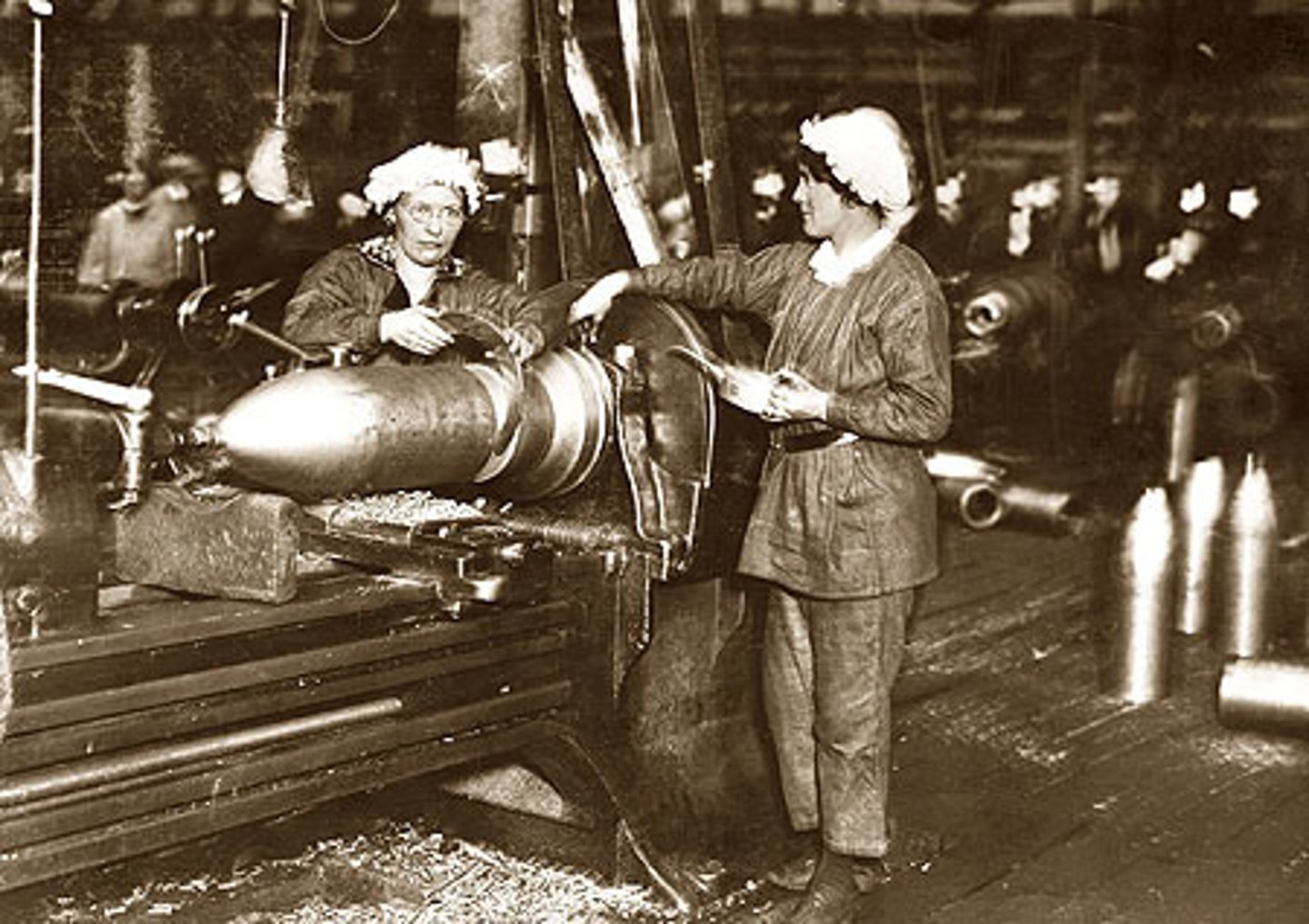
Florida in WWI
42,000 Floridians served in the military during the war. Contributed by providing food, timber, technology (Edison), ships, and training during the war. Race relations worsened as African Americans returned from the war and pushed for change to the segregation policies.
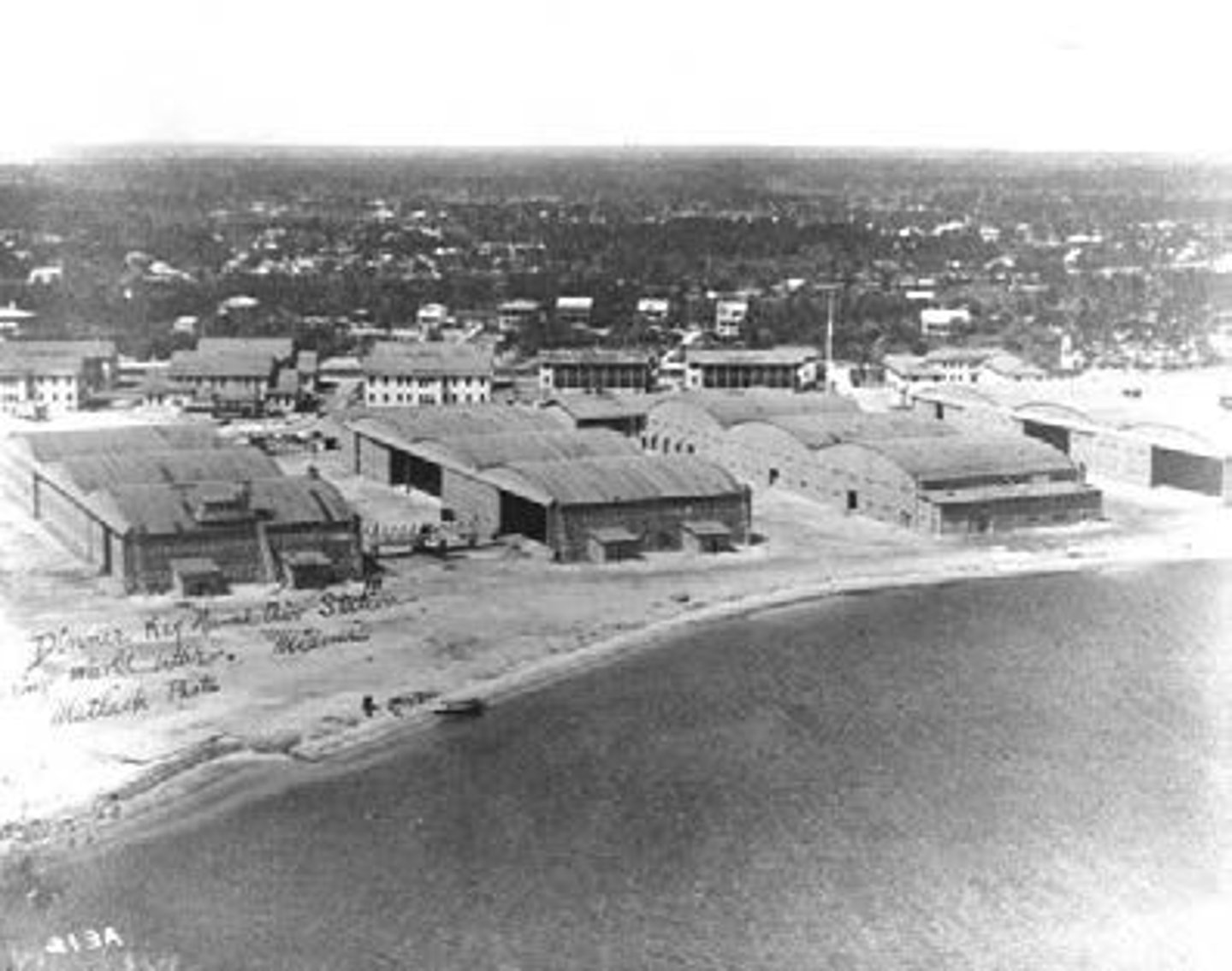
Demobilization
Transition process where a nation at war returns to a state of peace. Factories must convert to peacetime production, agriculture demand diminishes, soldiers need to find jobs, and African Americans and women who filled empty jobs are suddenly pushed out by those returning soldiers.
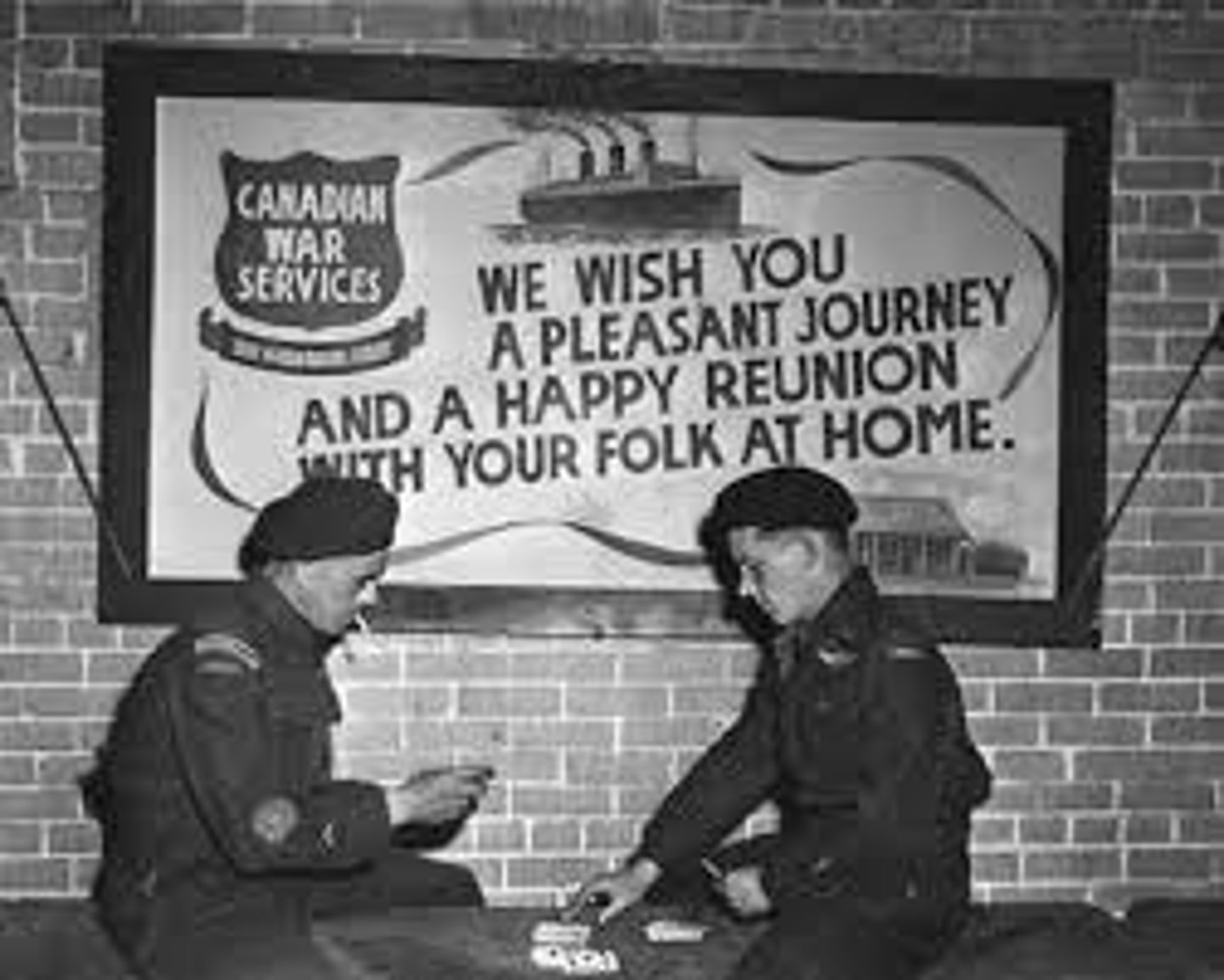
Red Scare
Fear of a Communist revolution in America. Led to the Palmer Raids - government hunted down suspected communists, socialists, and anarchists (people who oppose any form of government).
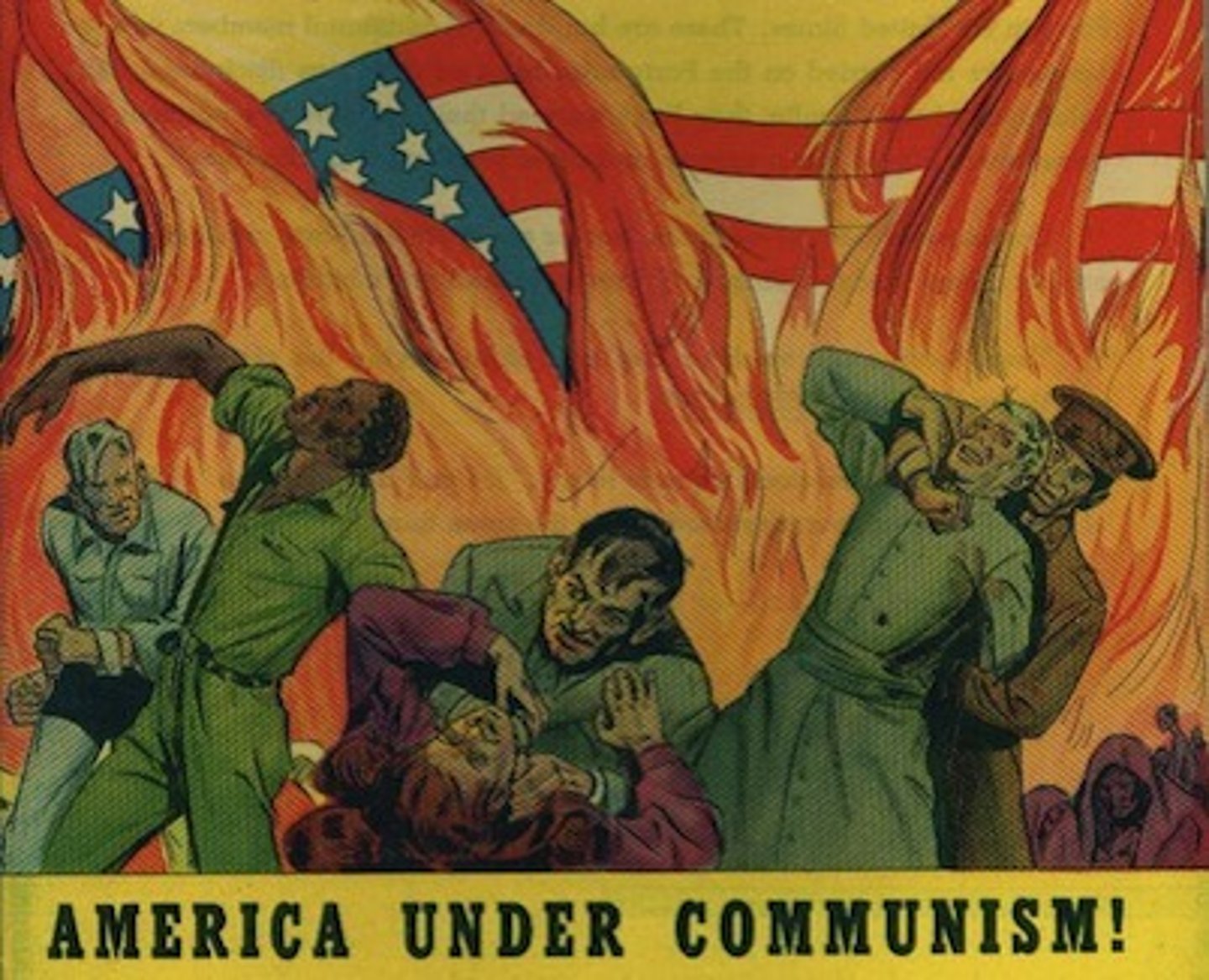
Sacco and Vanzetti
Italian immigrants and anarchists. Arrested for robbery and murder in 1920 - case stirred up controversy since many thought their trial was unfair due to the men's radical beliefs and because they were immigrants. Both men were convicted and executed.
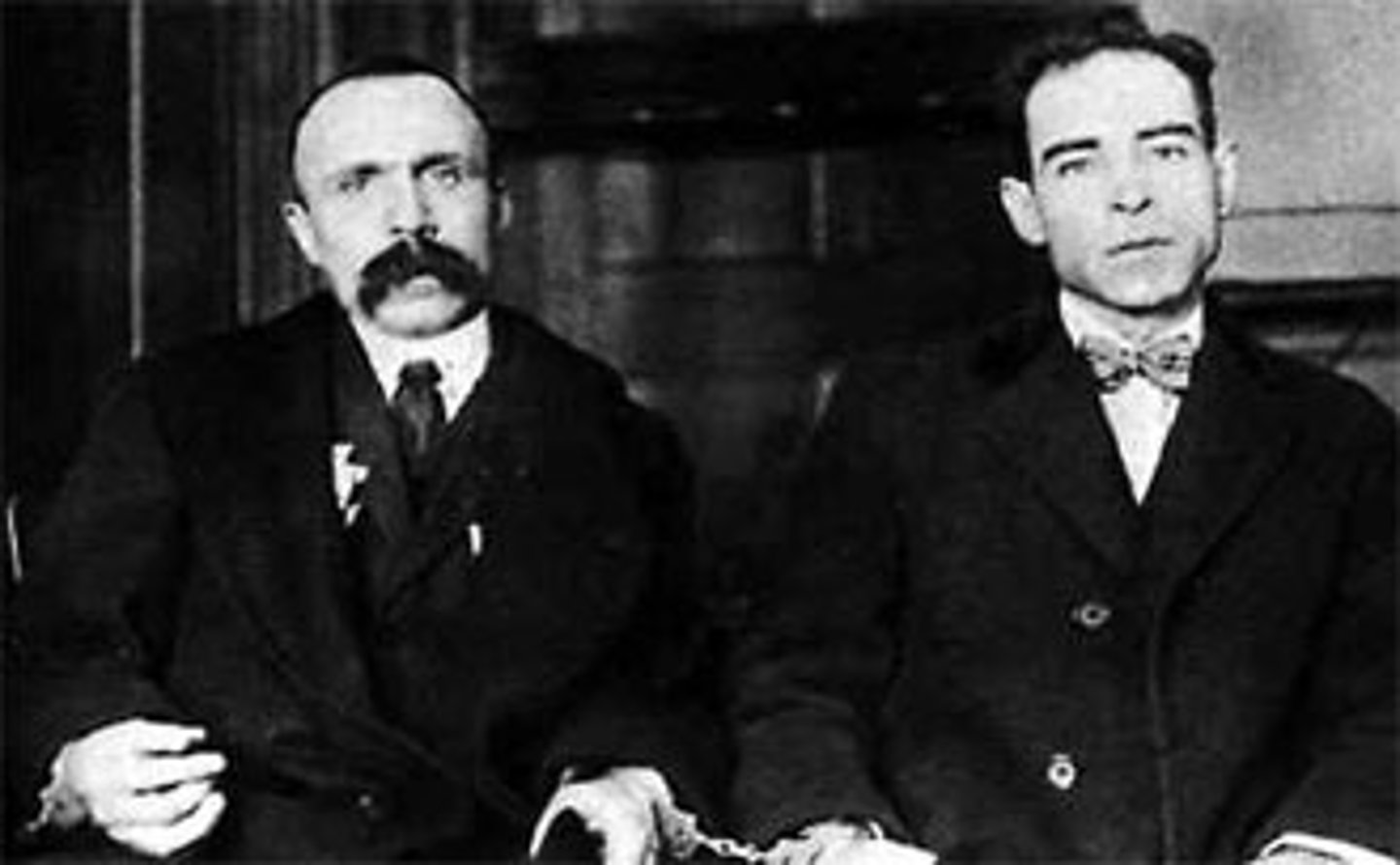
Fordney-McCumber Act
1922 new tariff (tax on imported goods) that was significantly higher than before - theory was it would protect U.S. manufacturers and their workers. Other countries raised their tariffs on U.S. goods - causing a negative impact on world trade
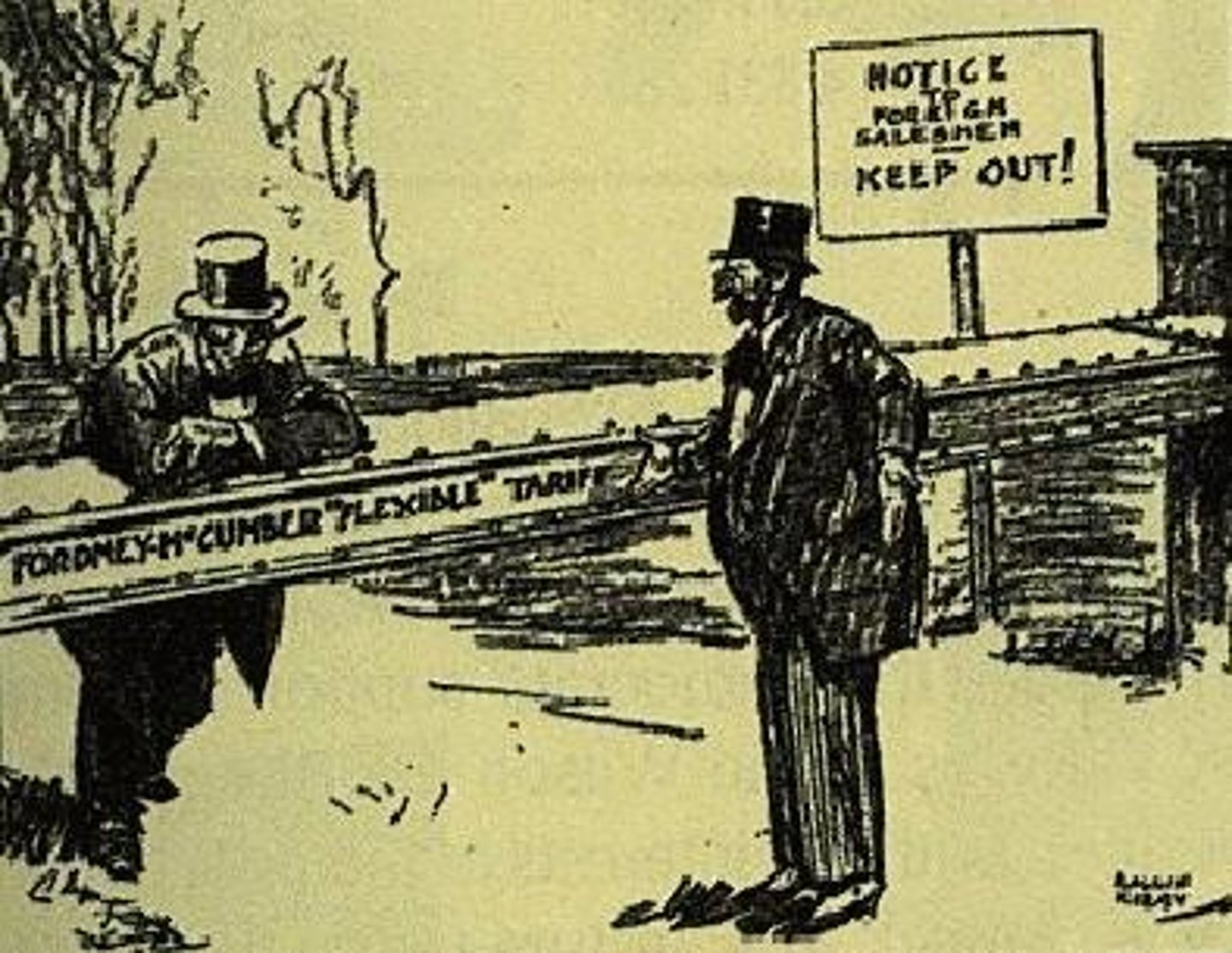
Dawes Plan
American plan to loan Germany $2.5 billion to pay back Britain and France, so they could pay the U.S. back for the war. Partly caused by the U.S. high tariffs -making it impossible for Britain and France to repay us without looking to collect their reparations from Germany. Caused resentment from everyone involved
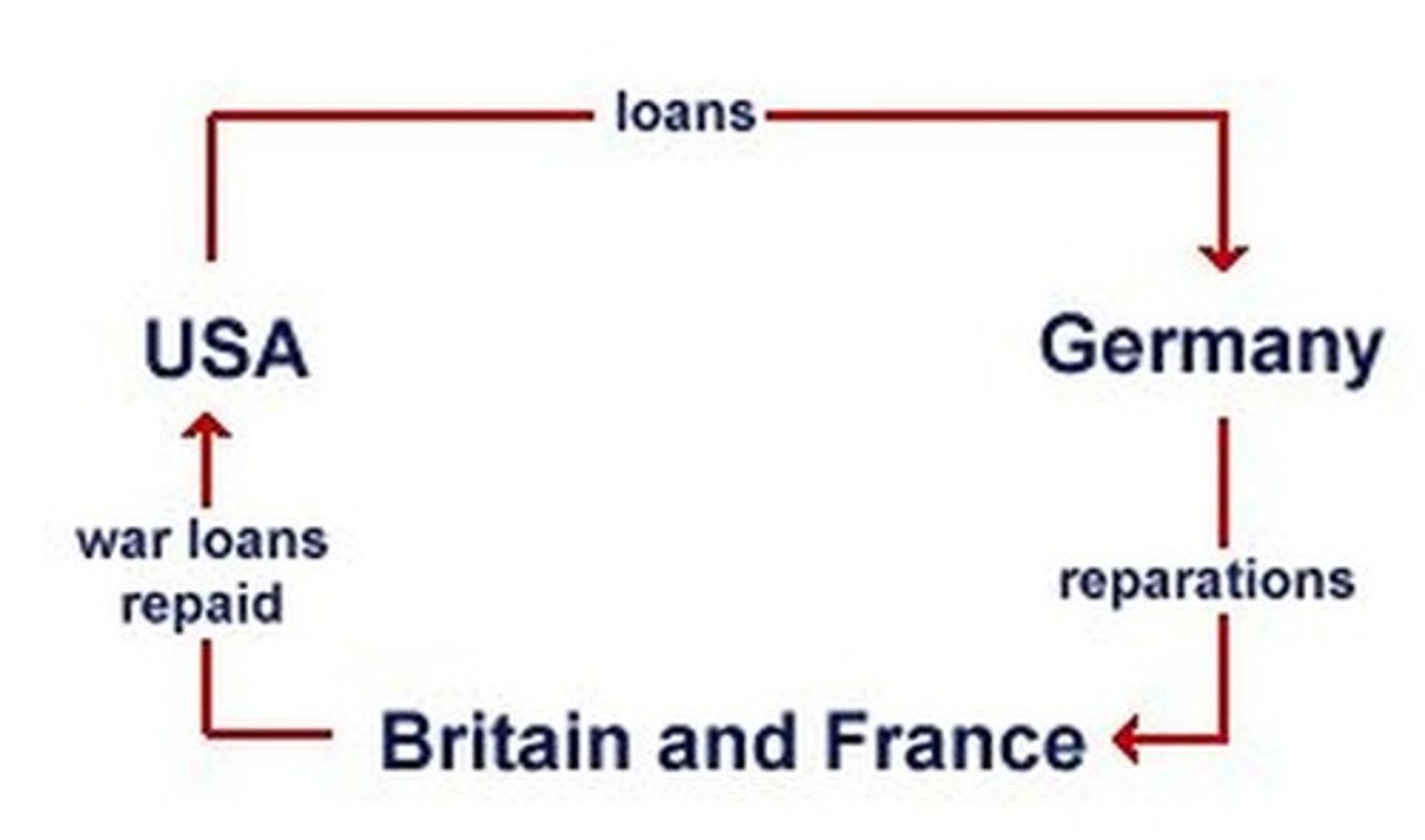
Teapot Dome Scandal
Corruption scandal involving the Secretary of the Interior, Albert B. Fall. He was secretly leasing federal oil reserves to private companies in return for cash gifts
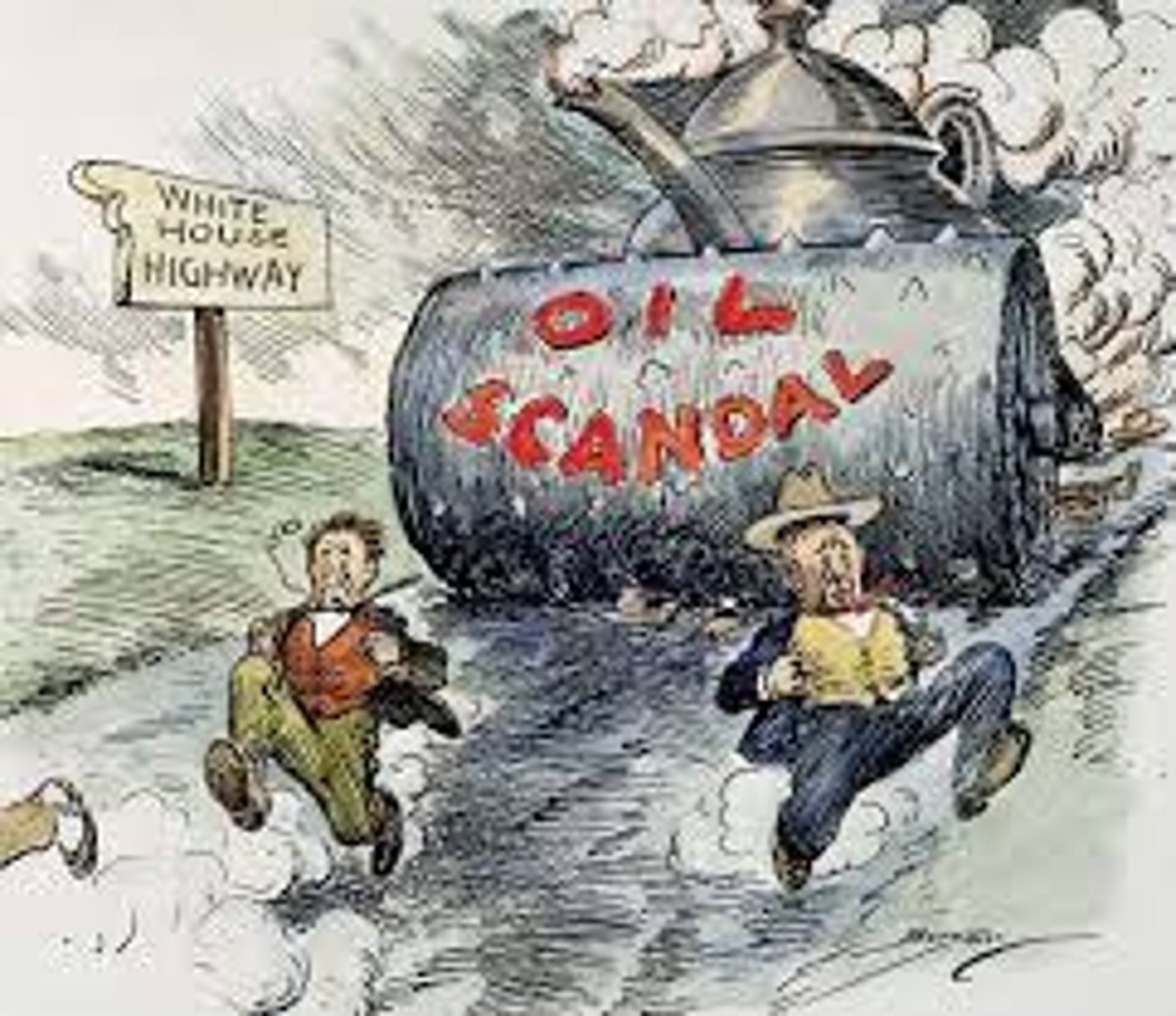
Quota System
Set up in 1921 to control the number of immigrants who could enter the U.S. from each foreign country, due to the prevailing nativist attitude "Keep America for the Americans." Discriminated against those from eastern and southern Europe. Did not allow any Japanese immigration
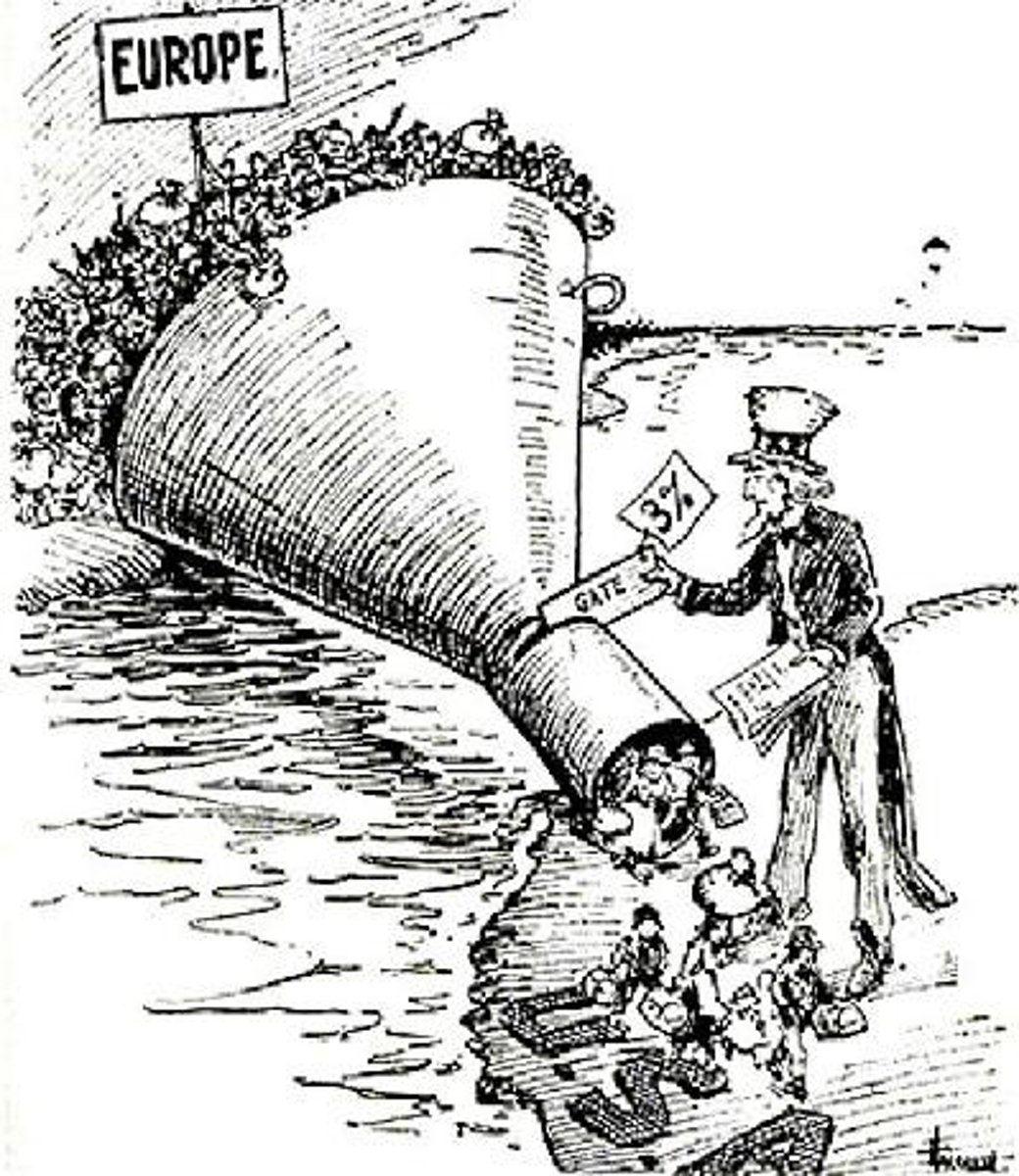
KKK Revival
Organized on a national scale devoted to "100% Americanism". Grew larger than they were after the Civil War - dominated state politics in many states. Against African Americans, Jews, Roman Catholics, unions, immigrants, and voting rights for women.
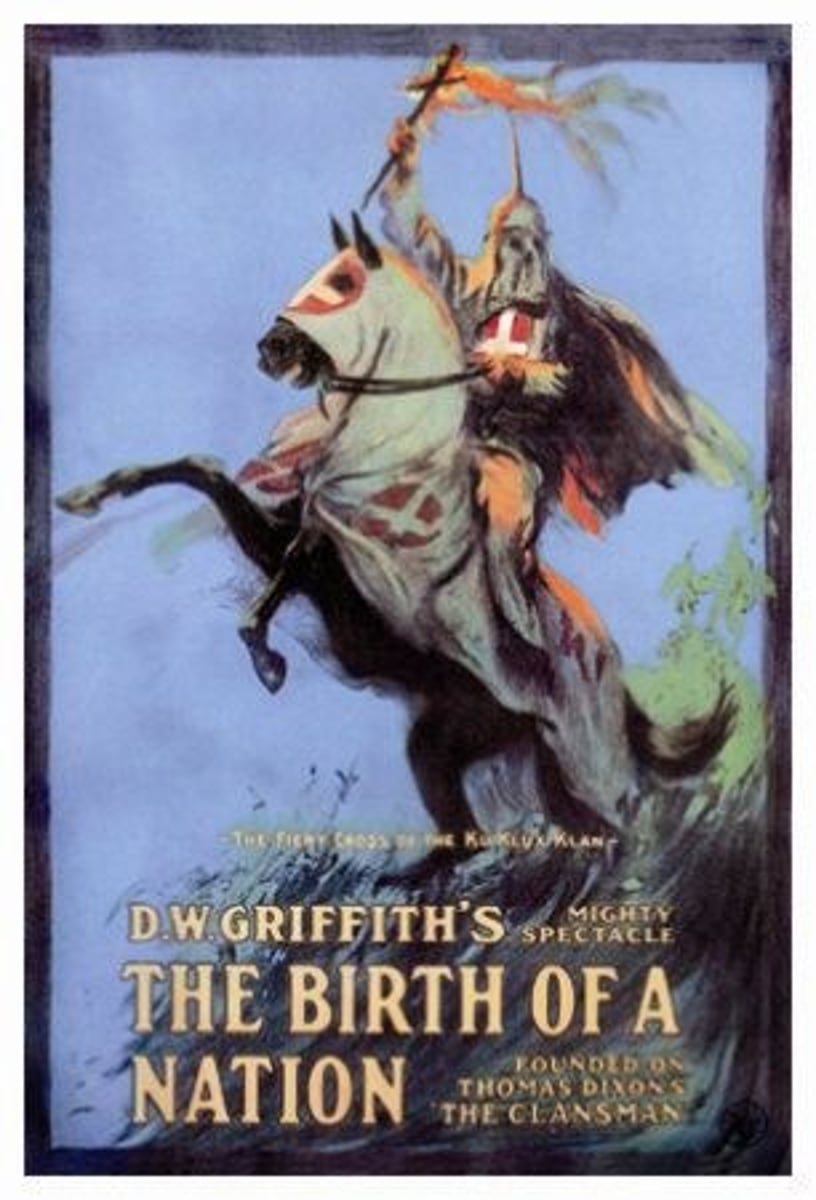
Rosewood Incident
African-American community in Florida that was burned to the ground and some of its residents killed by white residents from neighboring towns. In the 1980s, Rosewood survivors and their descendants were compensated by the Florida state government - first time a state had ever voted to compensate victims of racial violence.
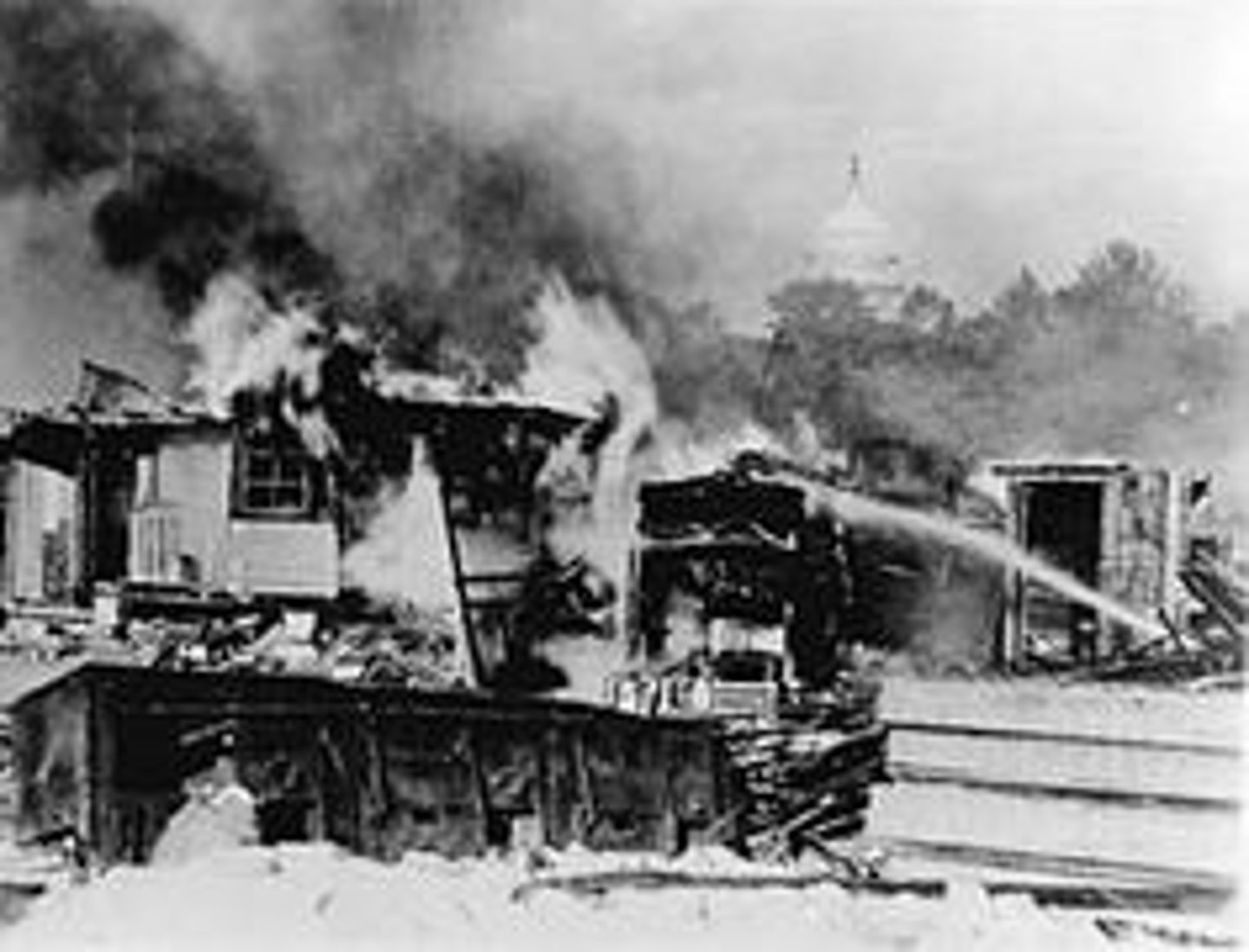
18th Amendment
Prohibited the manufacture, sale, and transportation of alcoholic beverages. Support for the amendment came largely from the rural South and West by the mid-1920s only 19% supported Prohibition. Repealed in 1933 with the 21st Amendment.
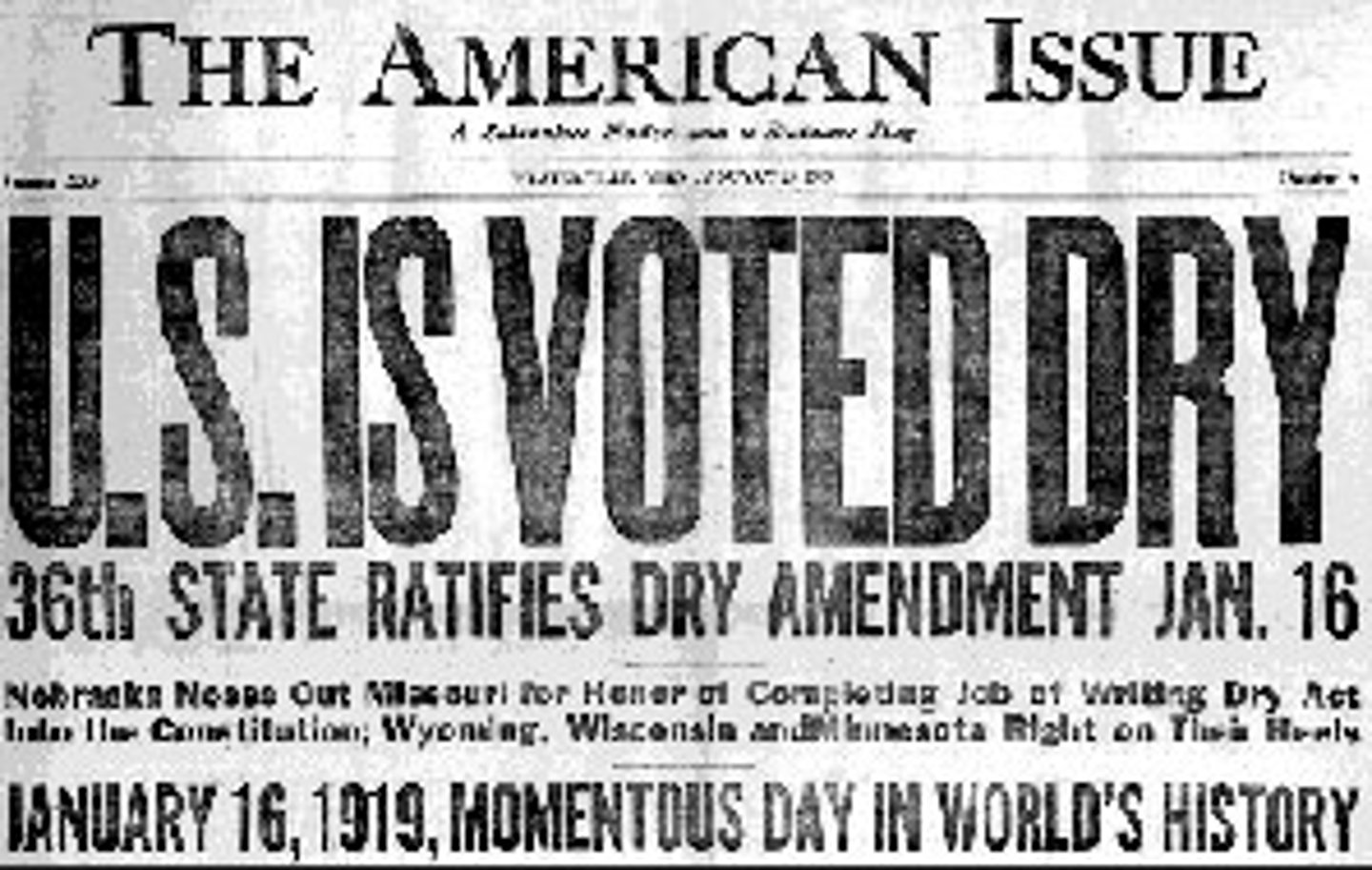
Volstead Act
National Prohibition Act - established a Prohibition Bureau in the Treasury department to enforce the 18th Amendment. The agency was underfunded.
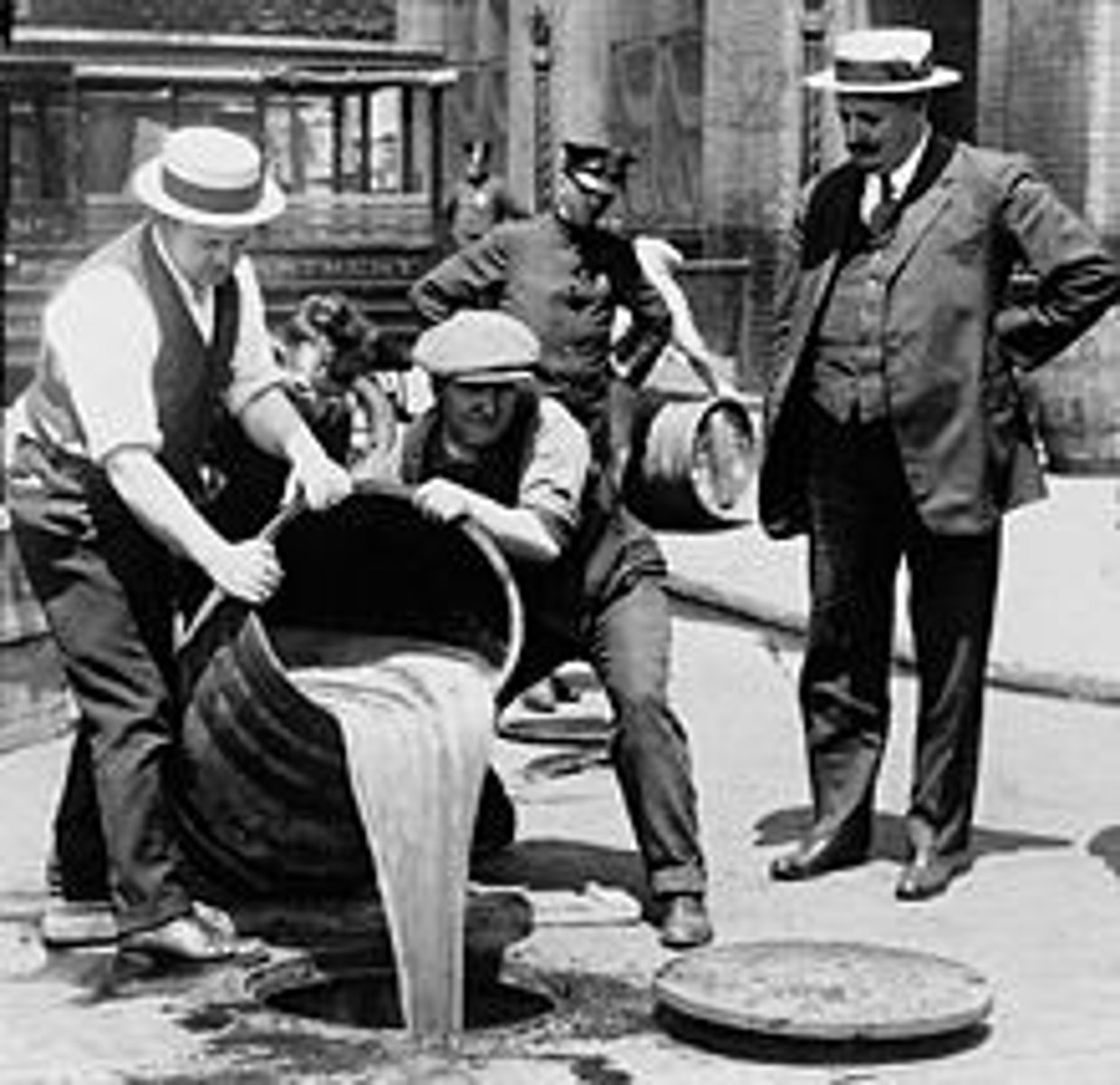
National Association for the Advancement of Colored People (NAACP)
Founded in 1909 to urge African Americans to protest racial violence and fight for legislation to protect African American rights. W.E.B. Du Bois is a founding member.
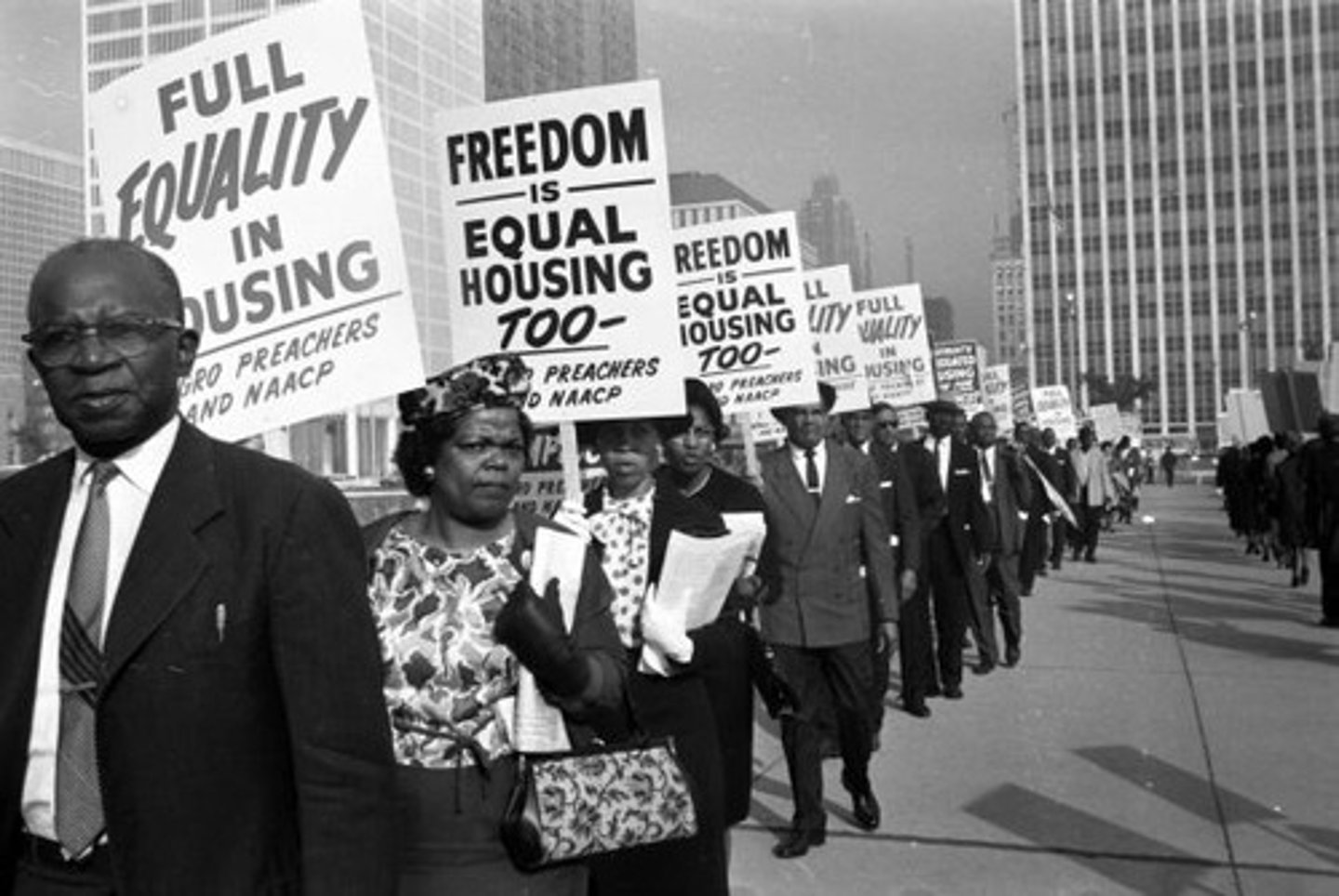
W.E.B. Du Bois
Believed that African American should push for full equality and should not be content with an inferior social and economic status. Launched the "Niagara Movement" calling for equal economic opportunities and the right to vote. Founding member of the NAACP.
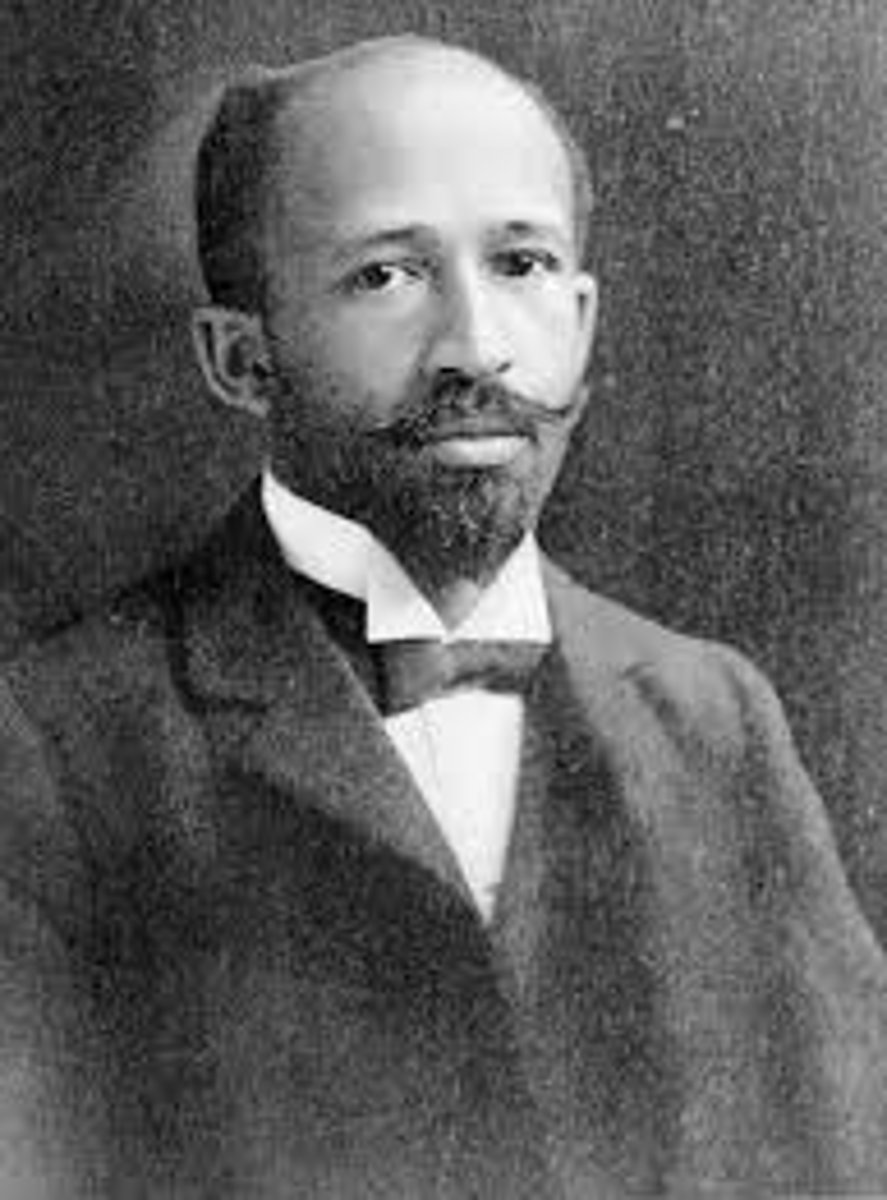
Booker T. Washington
Born into slavery, later founded the Tuskegee Institute in Alabama. In 1895, he proposed the "Atlanta Compromise" - the idea that African Americans would accept segregation and white rule in the South as long as they were given free vocational training and enjoyed basic legal rights.
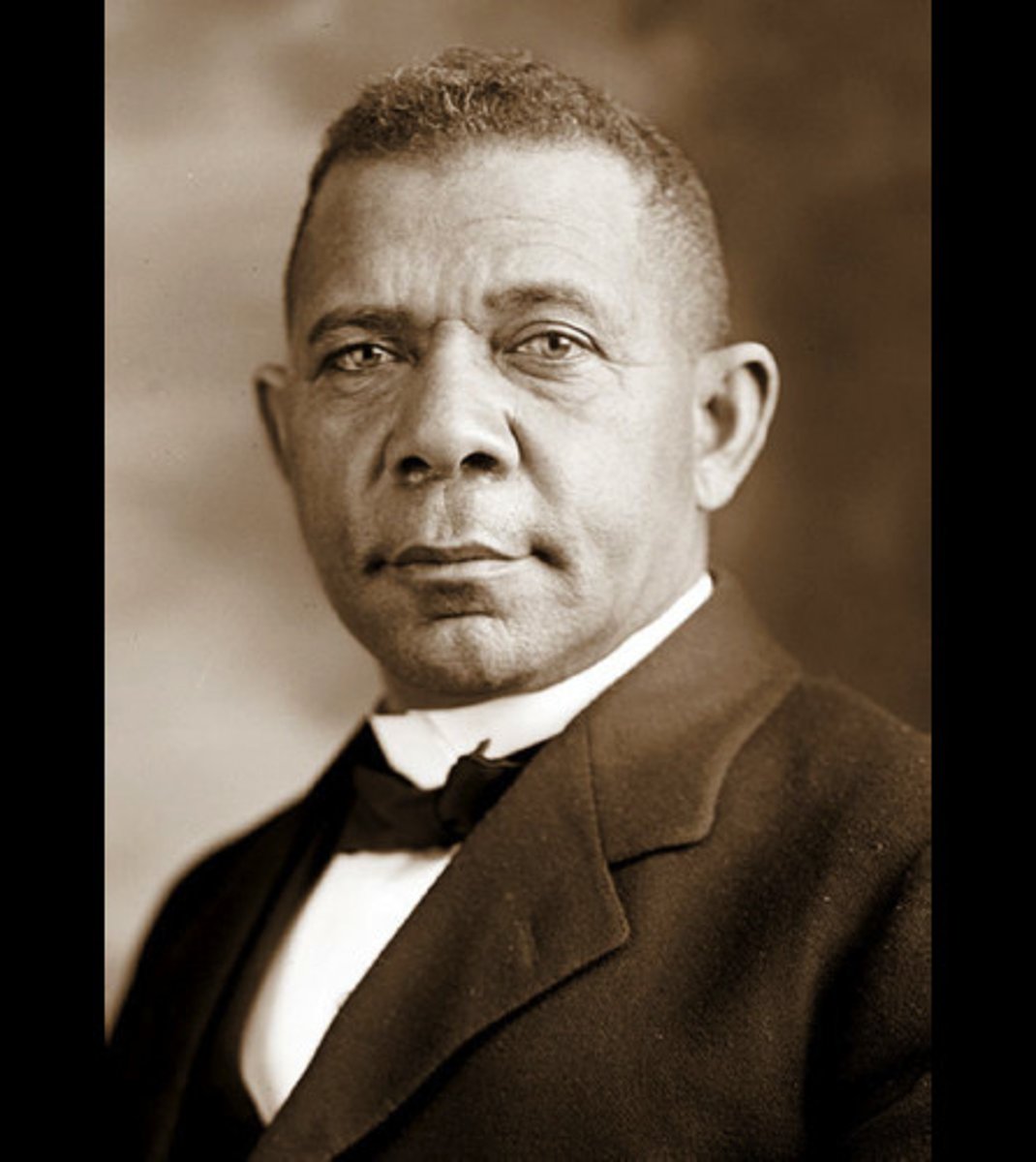
Marcus Garvey
Believed that African Americans should build a separate society. Promoted African American businesses, and encourage followers to return to Africa to help the natives build a mighty nation. Started the Universal Negro Improvement Association (UNIA) in 1914.
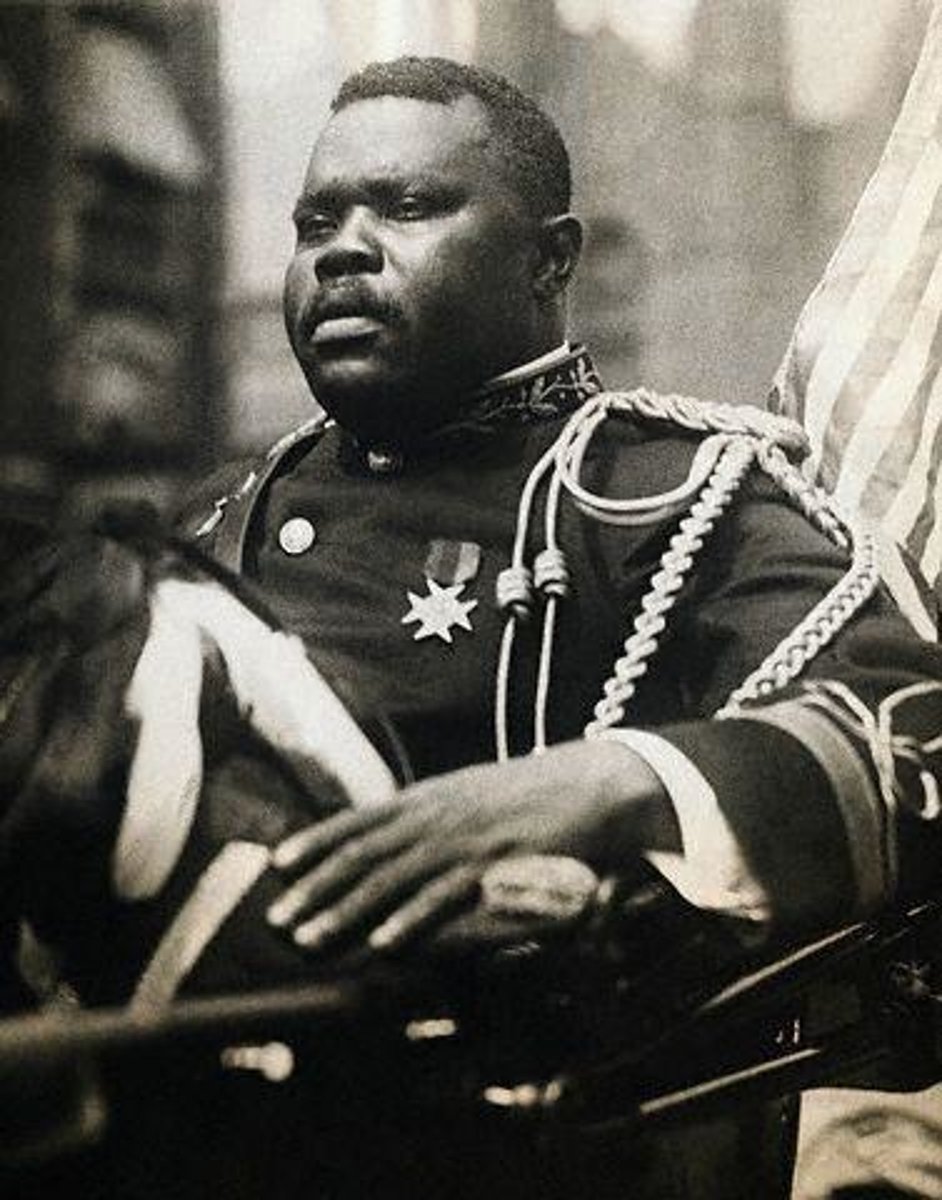
Harlem Renaissance
Literary and artistic movement celebrating African American culture. Led by well-educated, middle-class African Americans who expressed pride in the African American experience.
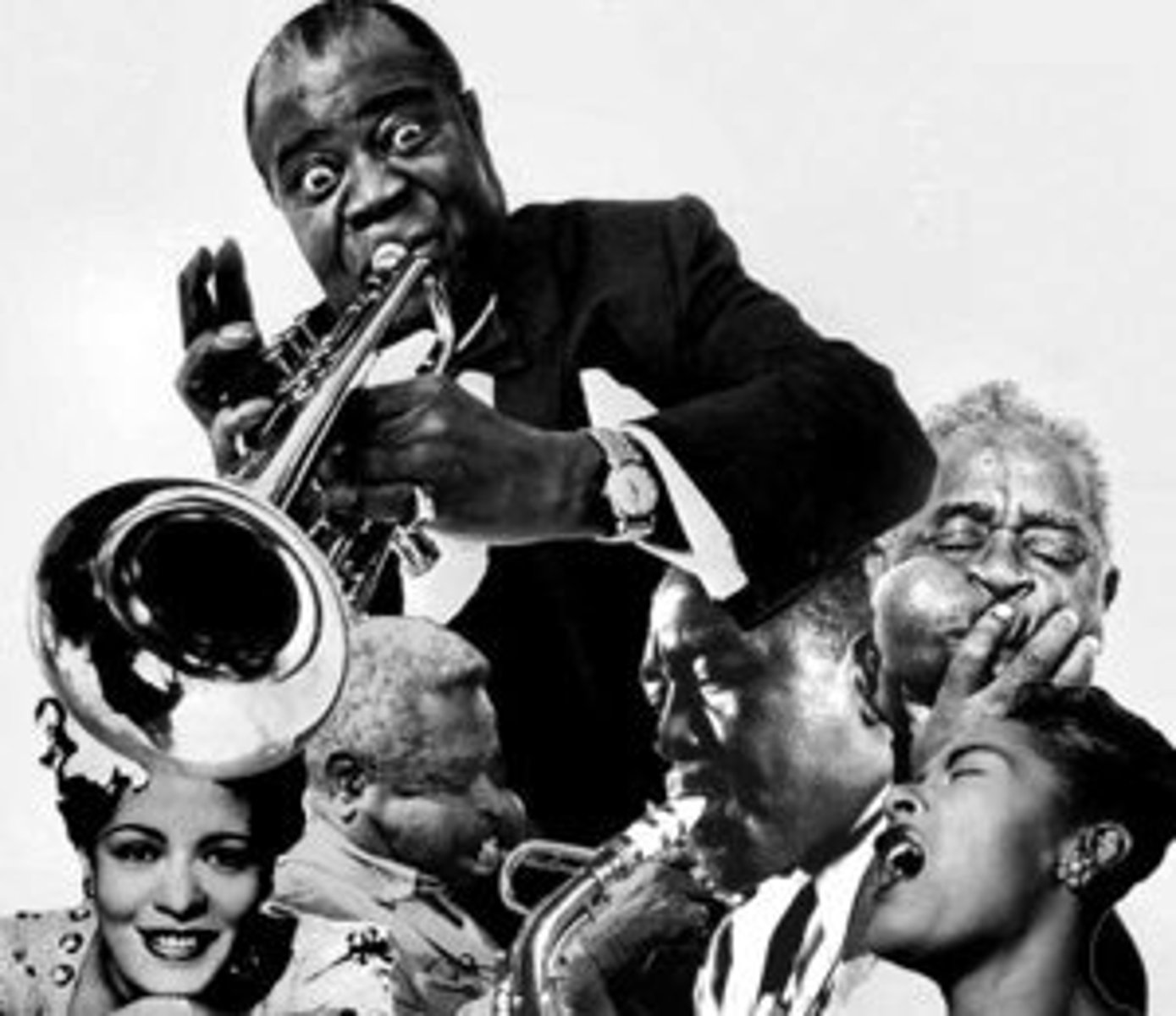
Fundamentalism
Idea that everything in the Bible should be taken literally. Clash over values leads to the Scopes Trial (in TN, but receives national attention) - a fight over evolution and the role of science and religion in public schools and in American society.
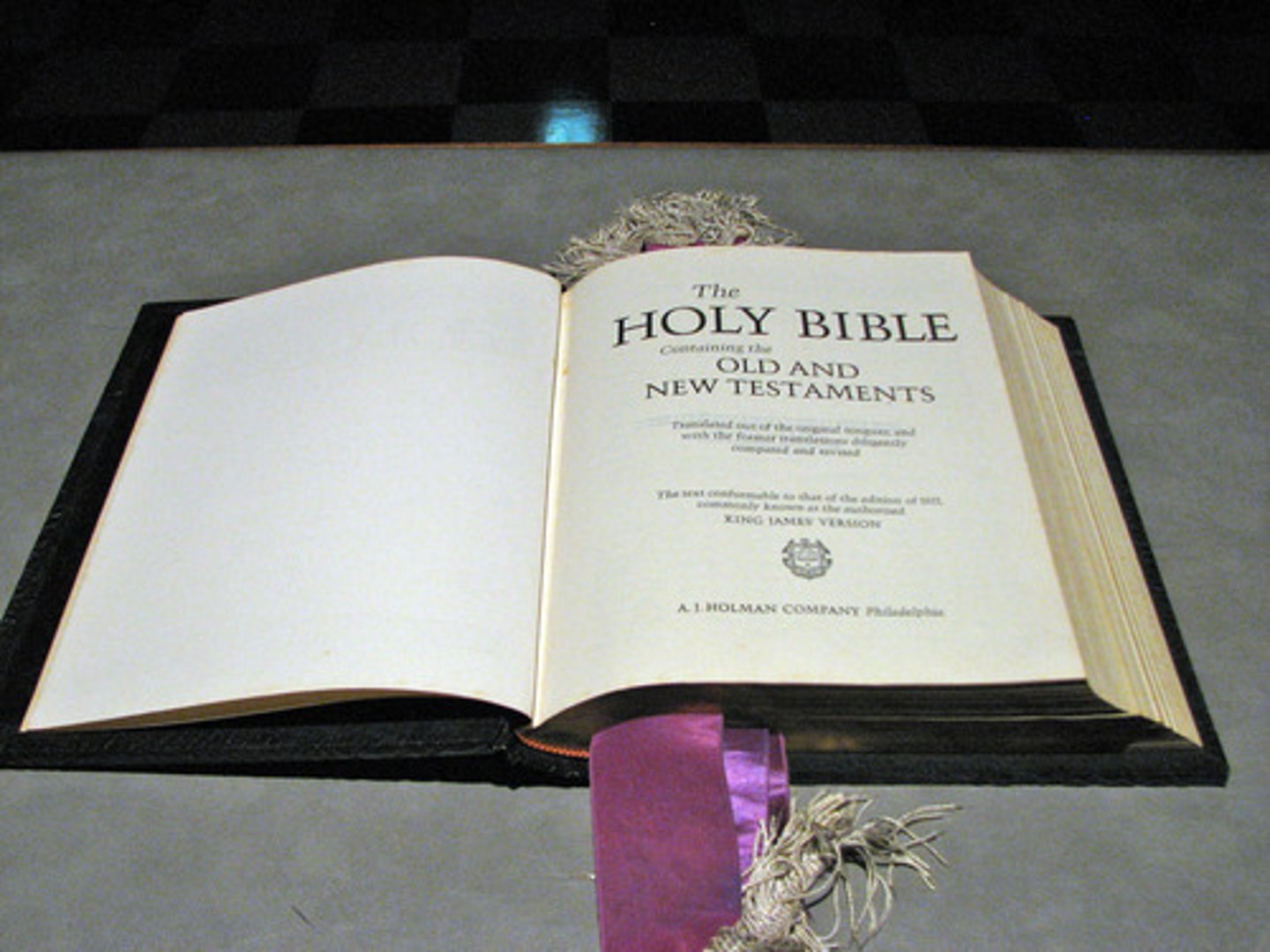
Nineteenth Amendment
Grants women the right to vote. Passed in 1919.
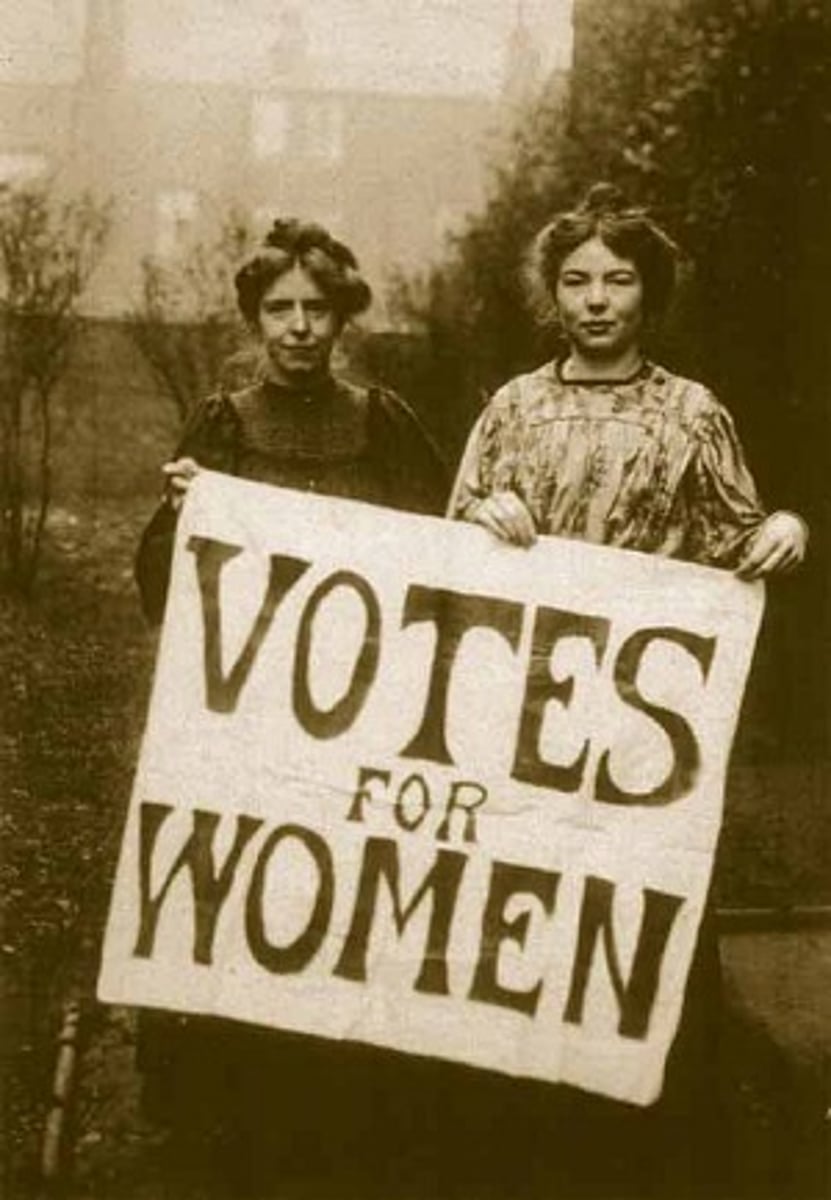
Women's International League for Peace and Freedom
Formed in 1915 as the Woman's Peace Party - renamed in 1919 after WWI. Thought the Treaty of Versailles was too vengeful. Moved the headquarters to Geneva, Switzerland to be close to the League of Nations
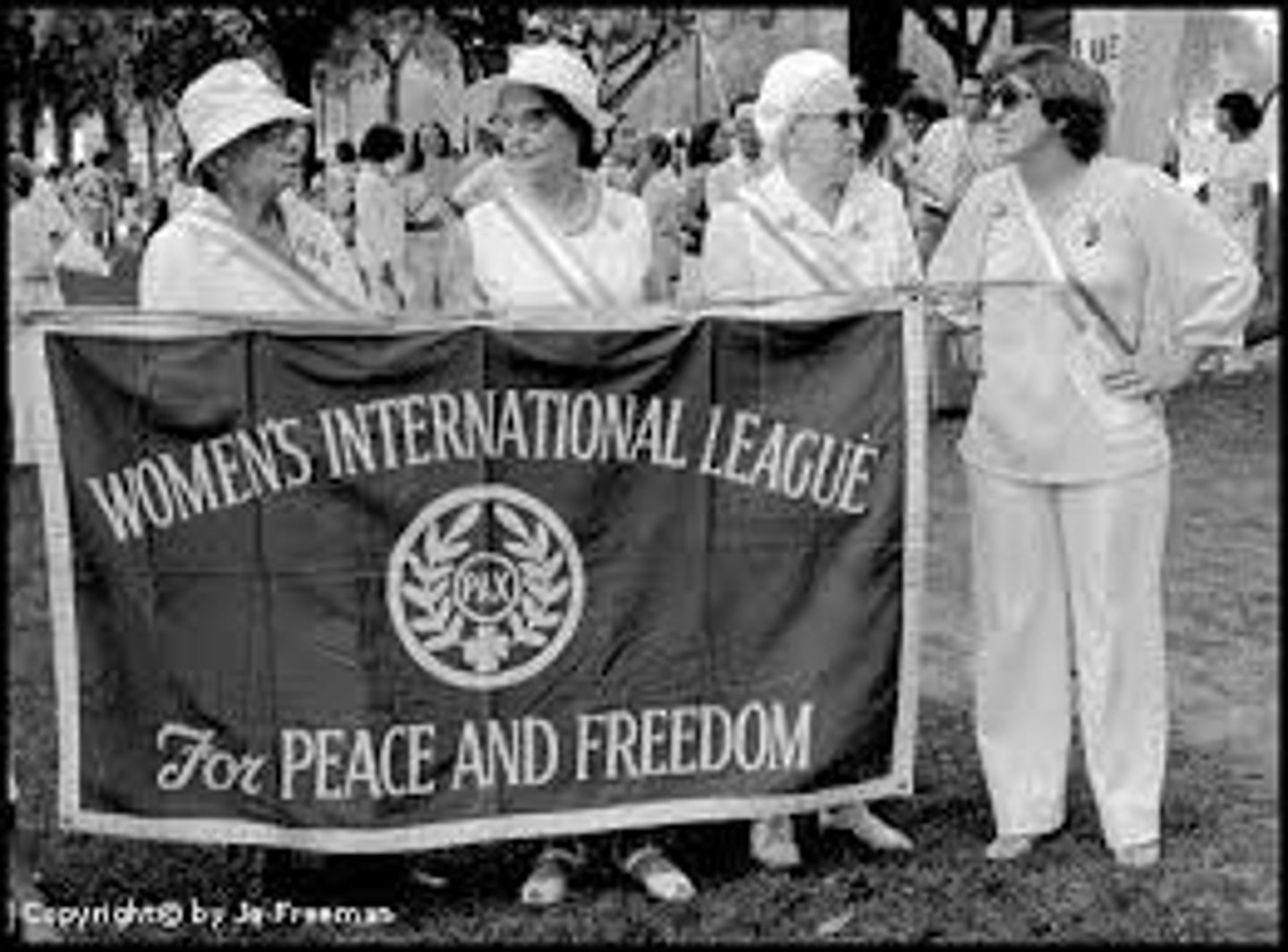
Washington Naval Conference
Direct negotiations with several major powers to promote world peace. Held instead of joining the League of Nations. U.S. proposed partial disarmament (reducing the number of weapons).
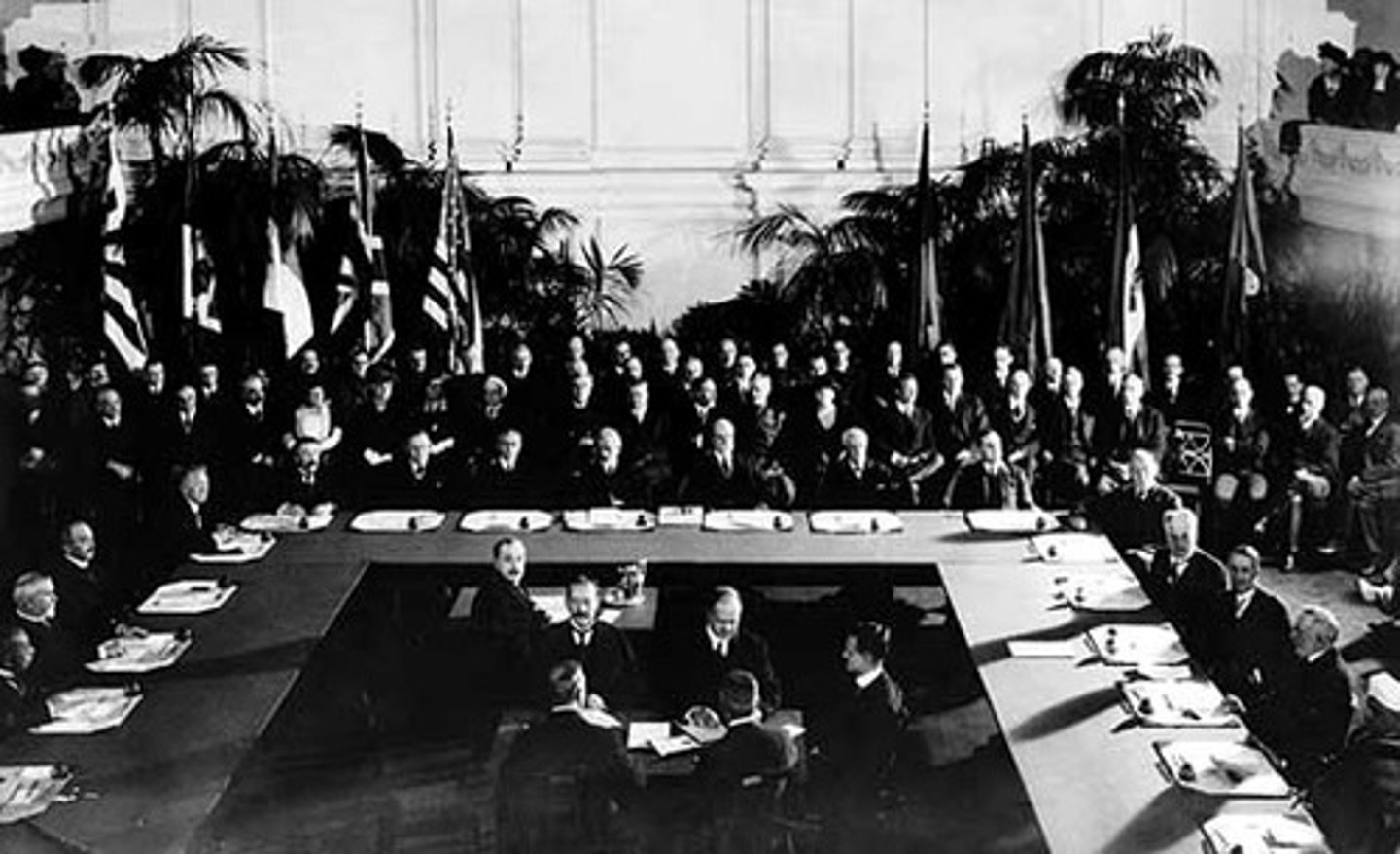
Four-Power Treaty
Agreement between the U.S., Britain, France, and Japan to respect each other's territories in the Pacific and to submit any disputes to a joint conference of all four nations. Agreement was worked out at the same time as the Washington Naval Conference.
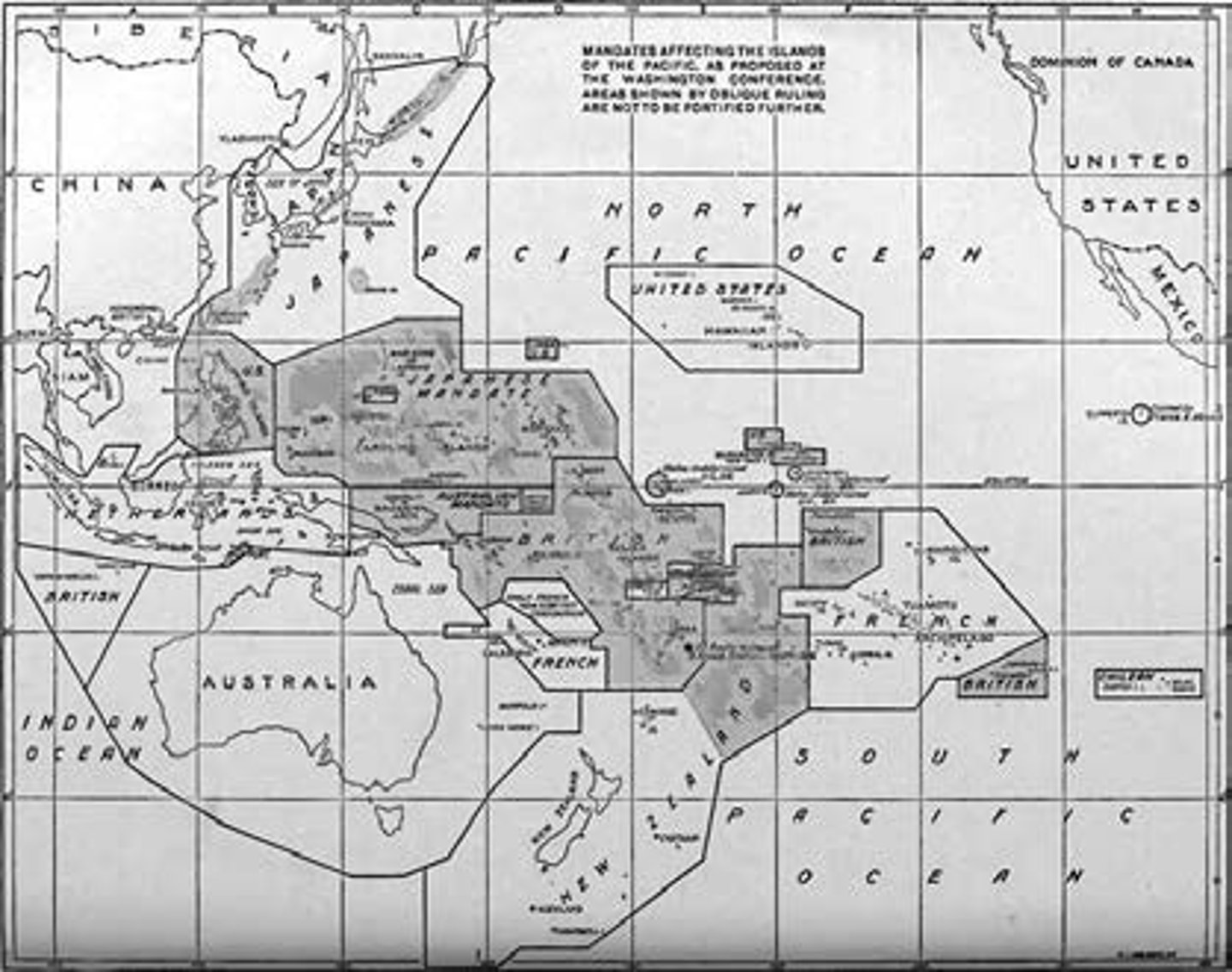
Kellogg-Briand Pact
In 1927, 15 nations pledged to not use war as an instrument of policy. Permitted nations to engage in a defensive war and had no means of enforcement.
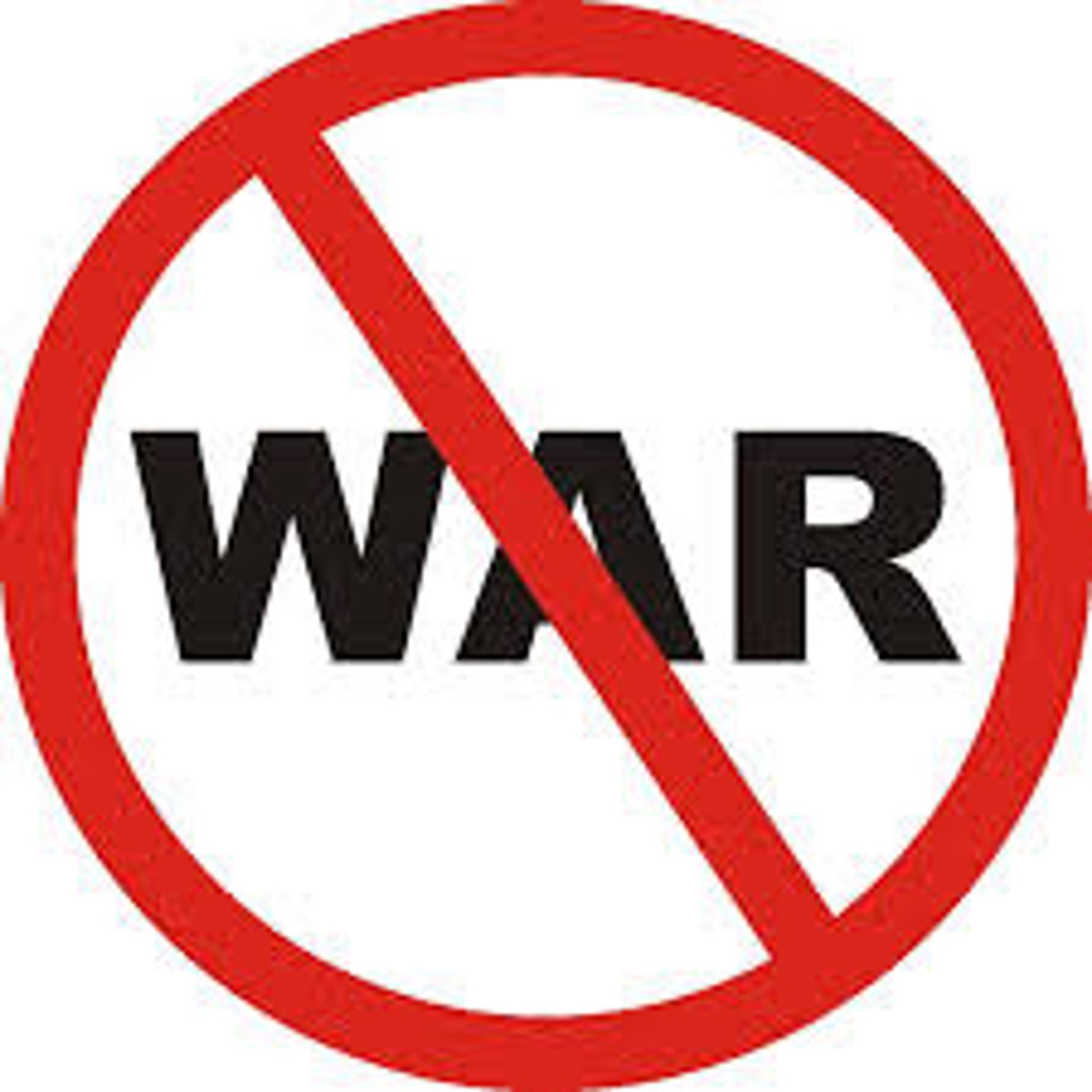
Roaring Twenties in Florida
Early 1920s, 300,000 Americans moved to Florida - land boom dominated the Florida economy. Hurricane struck South Florida in 1926 - and the boom turned to a bust.
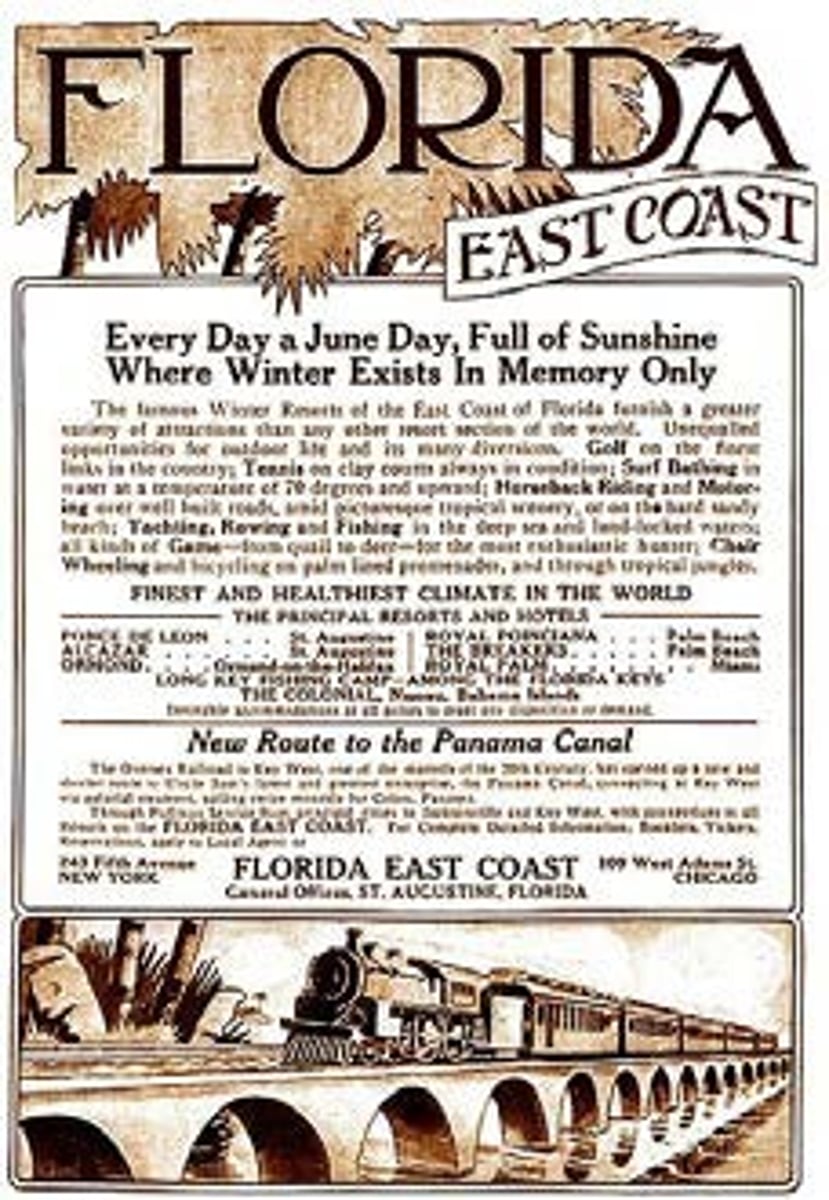
Installment plans
People in the 1920s started paying for things with credit and racked up huge debt. They were mostly paid off in installments with interest charges. As debt grew, spending slowed down.
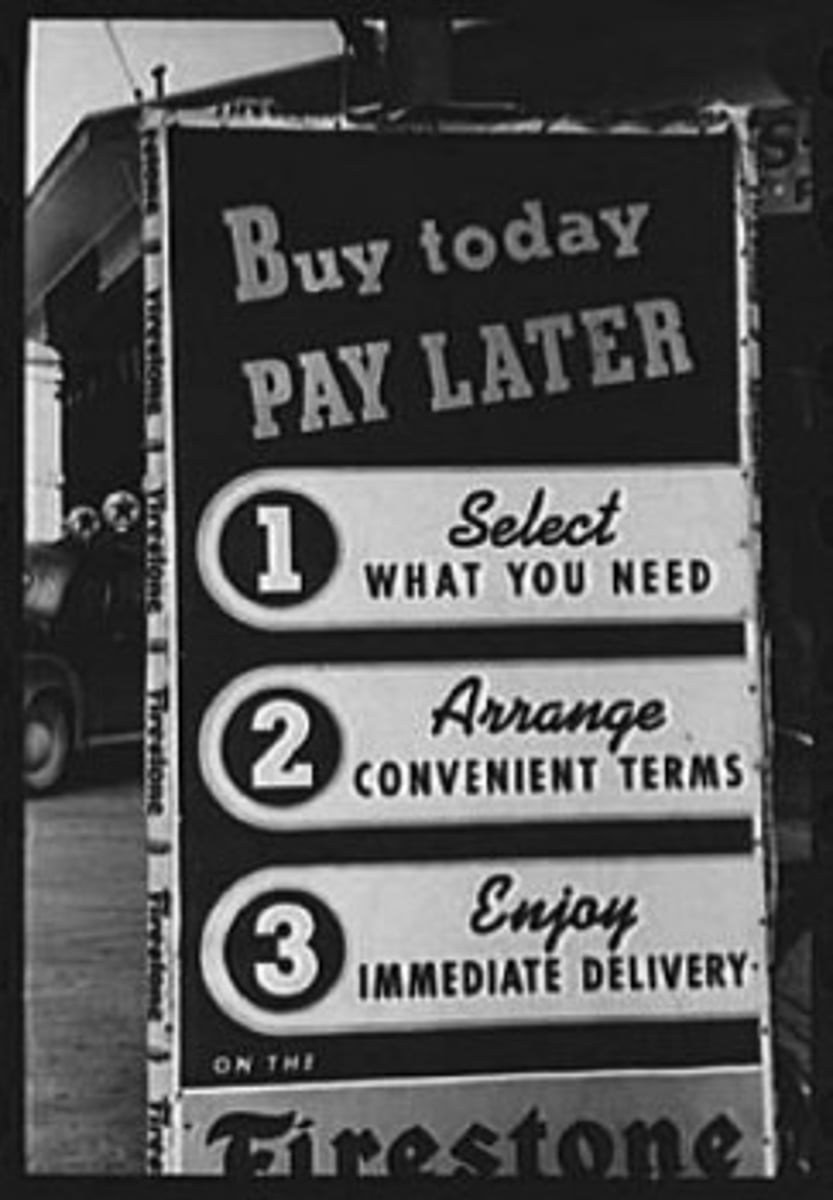
Speculation Boom
People began buying stocks to make quick profits, ignoring the risks. Many began buying on margin - only paying a down payment and borrowing the rest to pay for the stock. Stock market continued to spiral upward based on inflated stock prices rather than the companies' actual worth - until the crash in 1929.
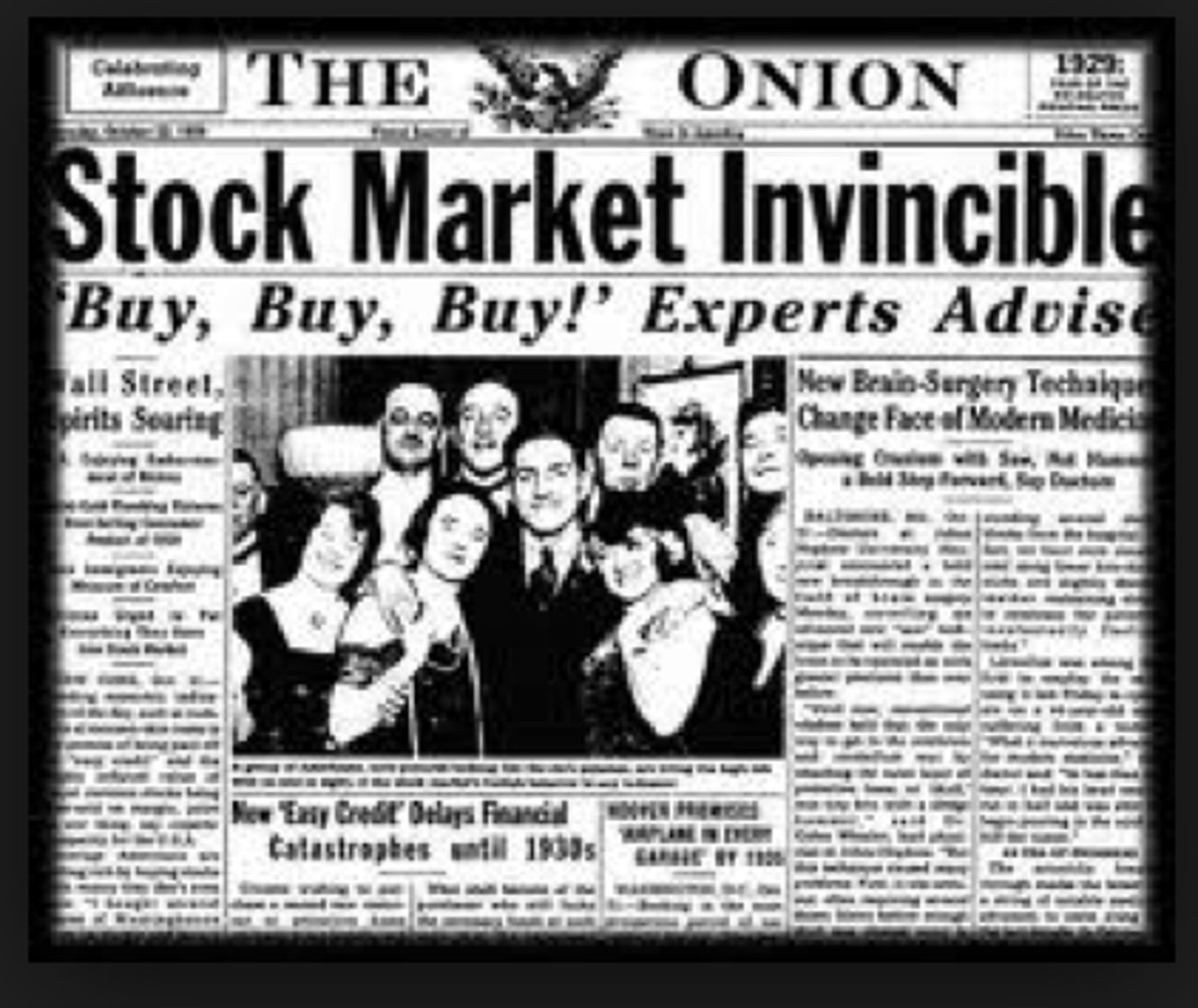
Bull Market
A stock market with steadily increasing stock prices

Black Tuesday
October 29, 1929 - Day the stock market crashed. In the following weeks investors lost about $30 billion. Starts a chain reaction that leads to the Great Depression

Smoot-Hawley Tariff
Passed by Congress in 1930. Highest protective tariff - designed to protect American farmers and manufacturers from foreign competition, but did the opposite. Cut U.S. trade in half.
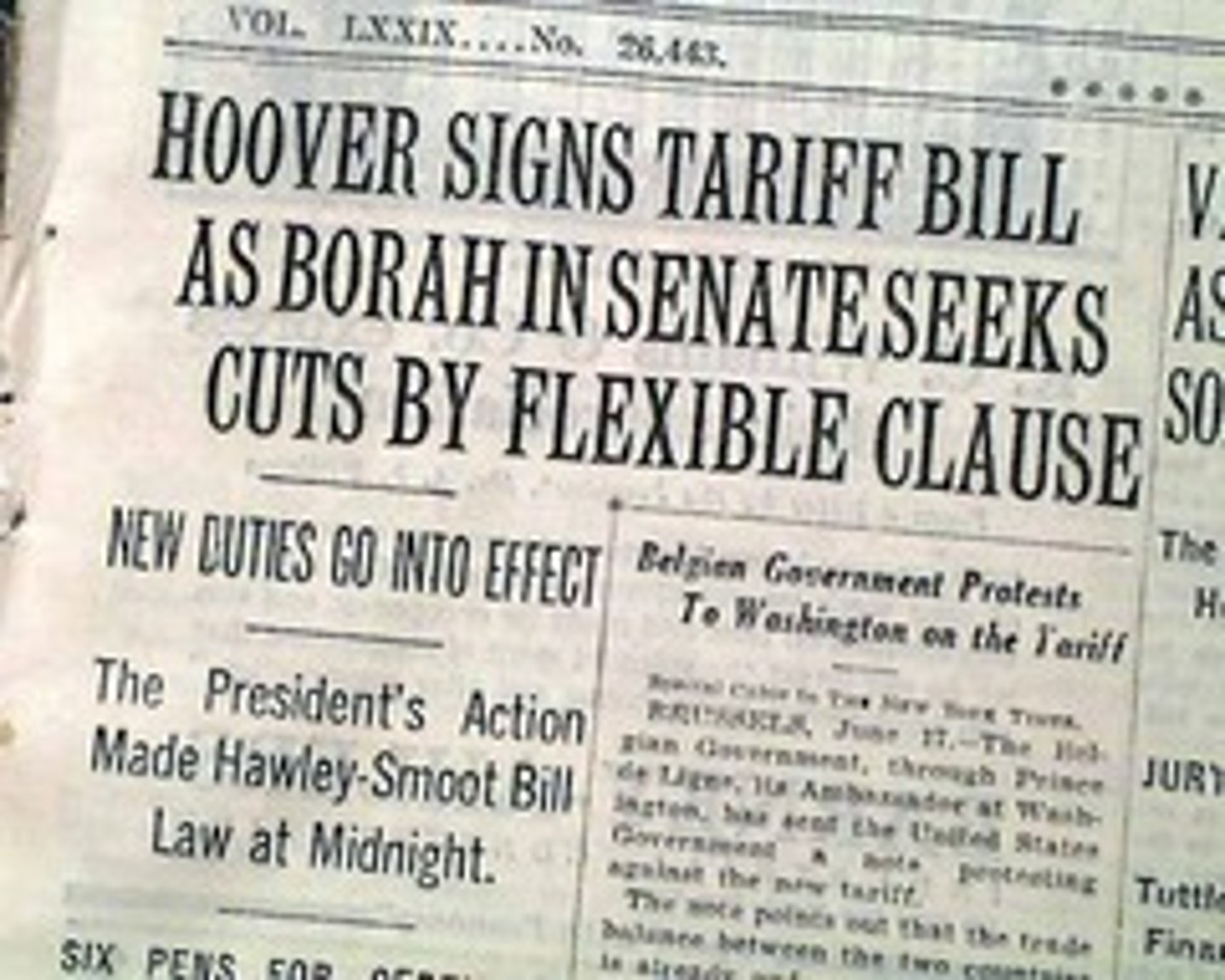
Dust Bowl
Hardest hit areas of a series of droughts in the 1930s. Droughts dried crops and turned the soil into dust - windstorms carried the dust hundreds of miles. Many farmers left their homes and headed west to California to find work
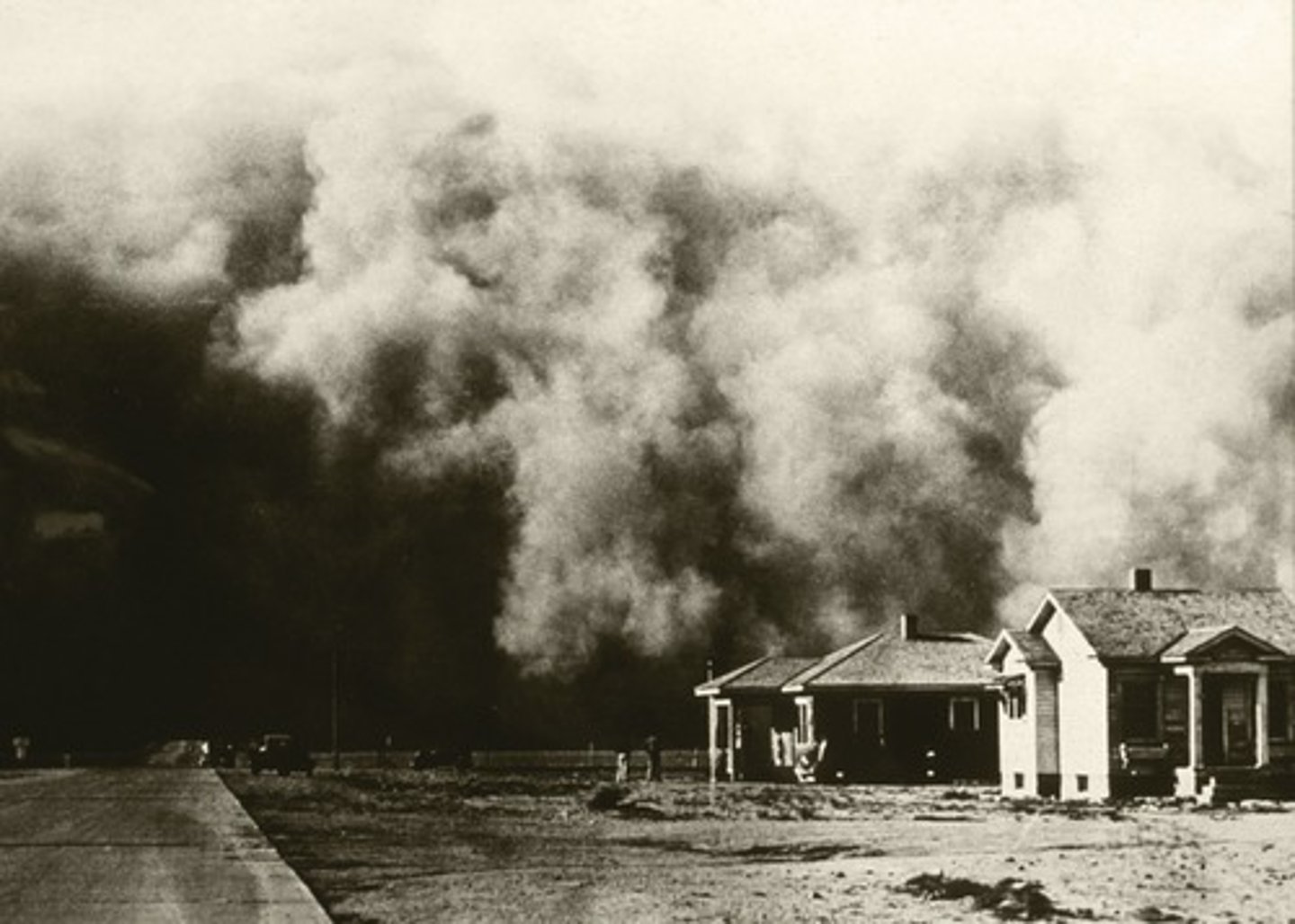
Bonus Expeditionary Force
WWI veterans and their families (10,000-20,000) who arrived in D.C. to support the Patman Bill. After the bill was voted down, about 2000 marchers refused to leave. President Hoover feared they might turn violent and had a force of 1000 soldiers disperse the veterans. His reaction shocks many and helps him lose the election to FDR
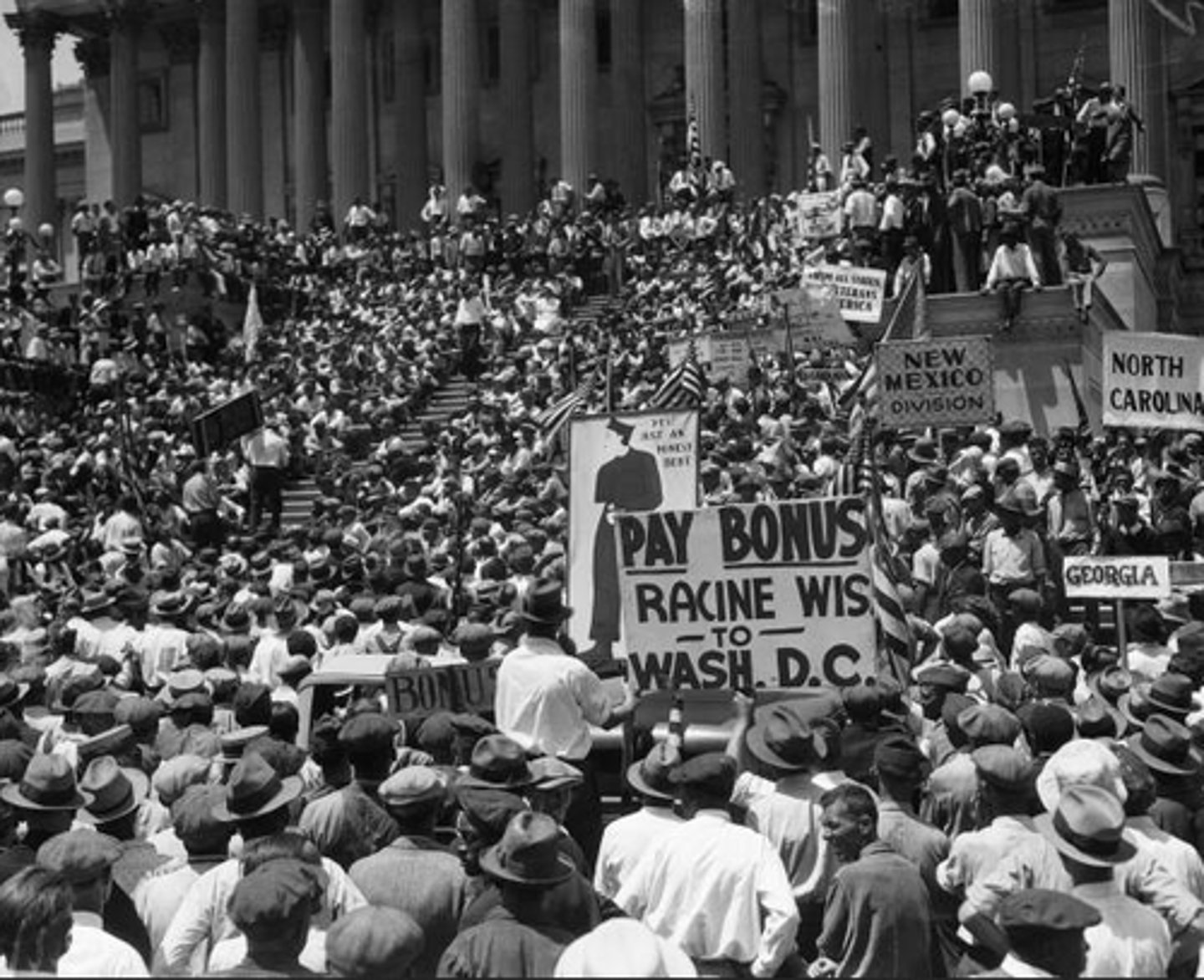
Bank Holiday
One of the first acts taken by Roosevelt to restore the nation's faith in the banking system - banks could only reopen after the government inspected them and found them financially sound. Congress went further by establishing the FDIC - insuring individual bank accounts up to $5000.

Agricultural Adjustment Act
Achieved higher crop prices by paying farmers to leave a certain amount of every acre unseeded. Put more money into farmers' hands. In 1936, was ruled unconstitutional. In 1938, a new act was passed that put surplus crops in government storage until prices rose.
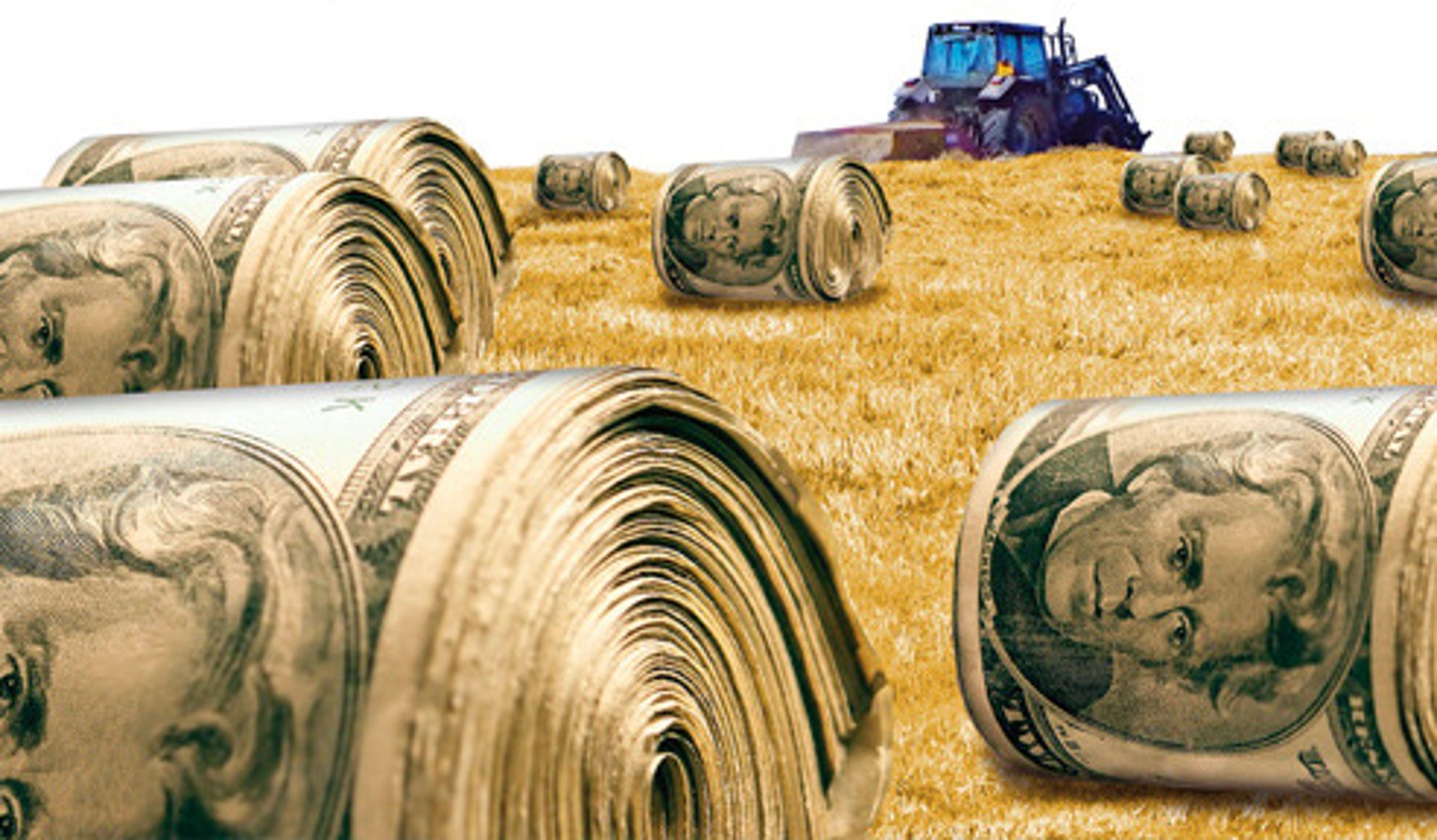
Tennessee Valley Authority
Program that helped provide jobs, provide hydroelectric power, and control floods in the impoverished South. They constructed and maintained over 20 dams on the Tennessee River
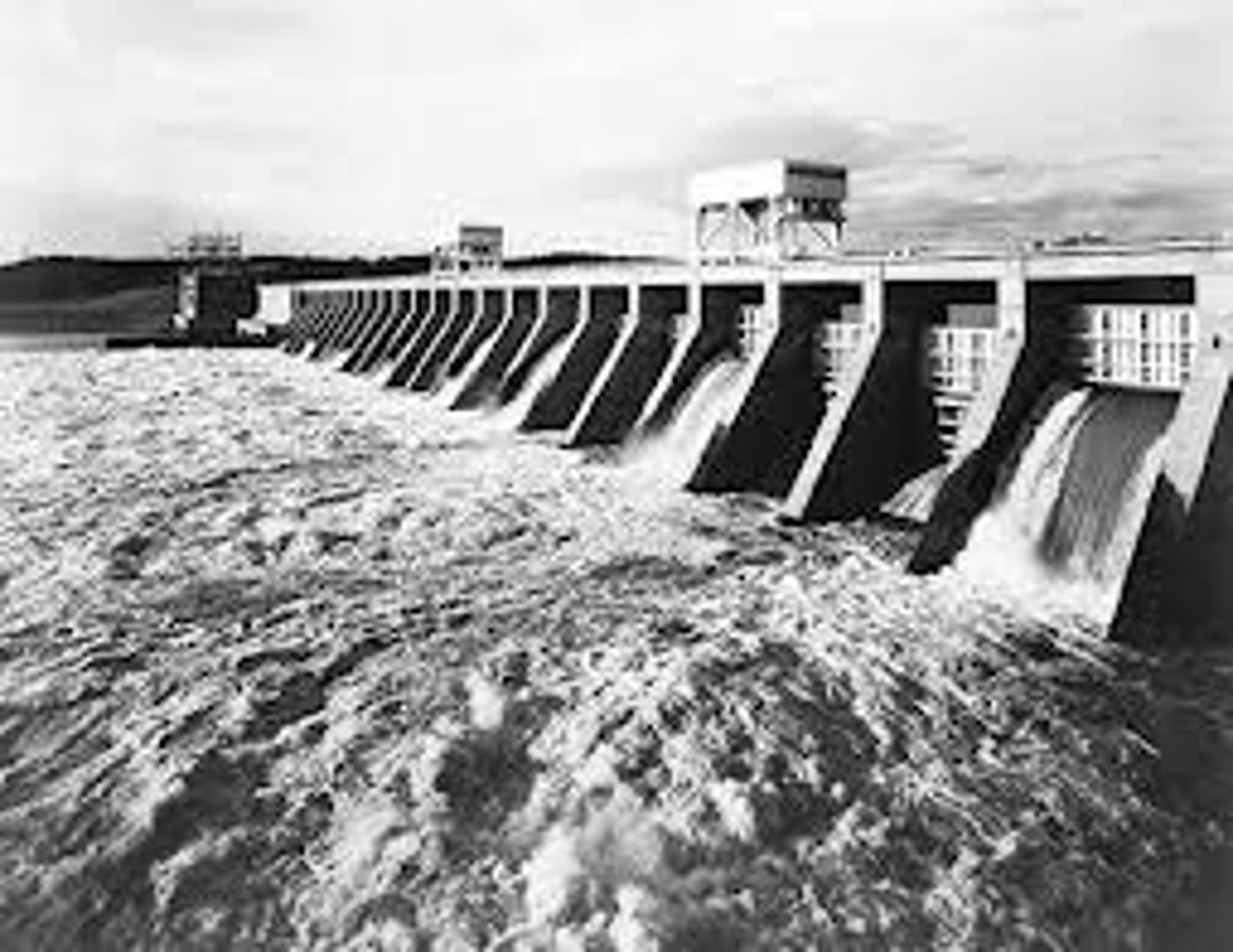
Civilian Conservation Corps (CCC)
Put men (age 18-25) to work building roads, developing parks, and planting trees. Had to send home most of the money they earned - they were provided with food, lodging, and uniforms. Most of the work was done in the Great Plains
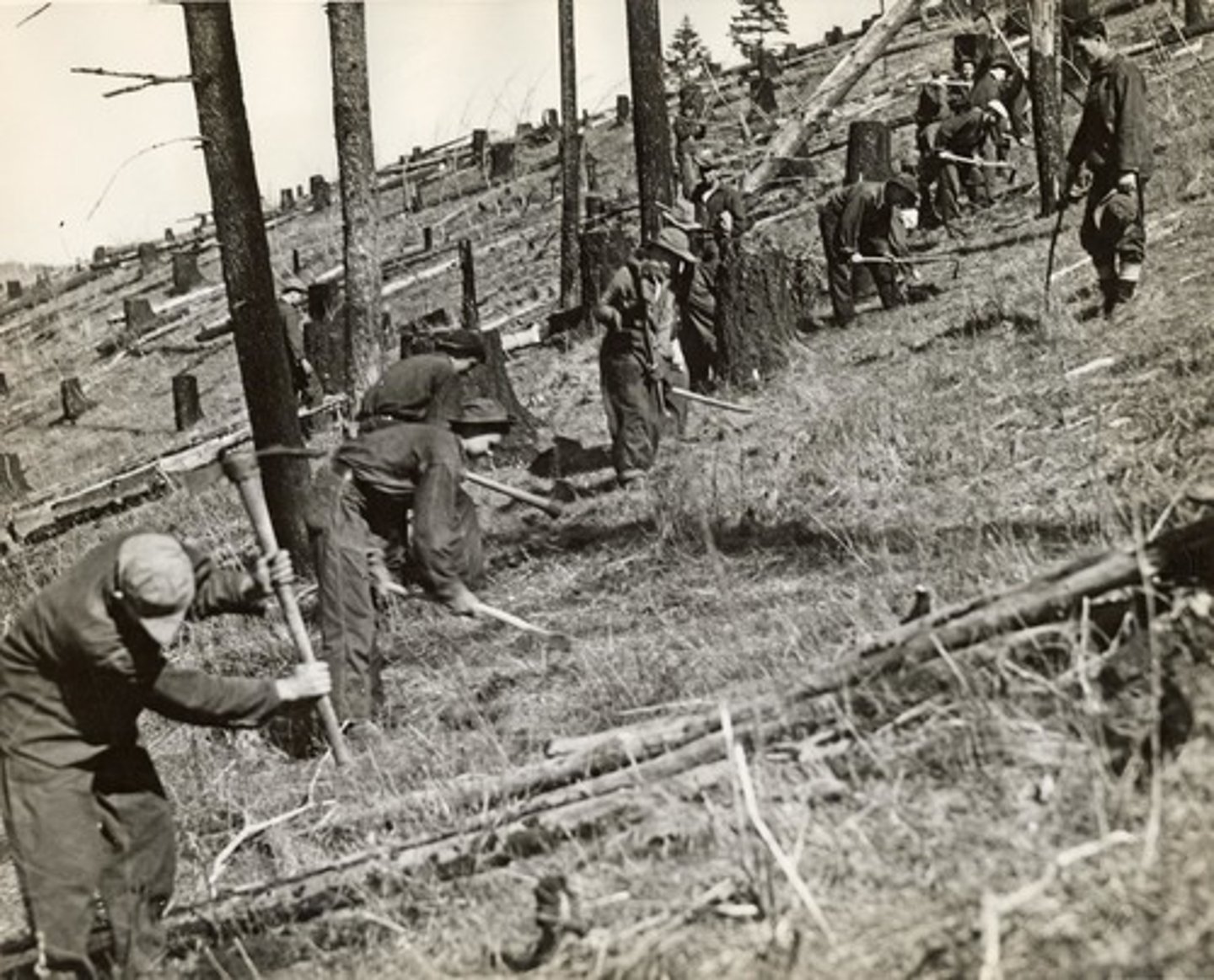
National Industrial Recovery Act
Act to support industry recovery by increasing prices and reducing wasteful competition. Created the National Recovery Administration.
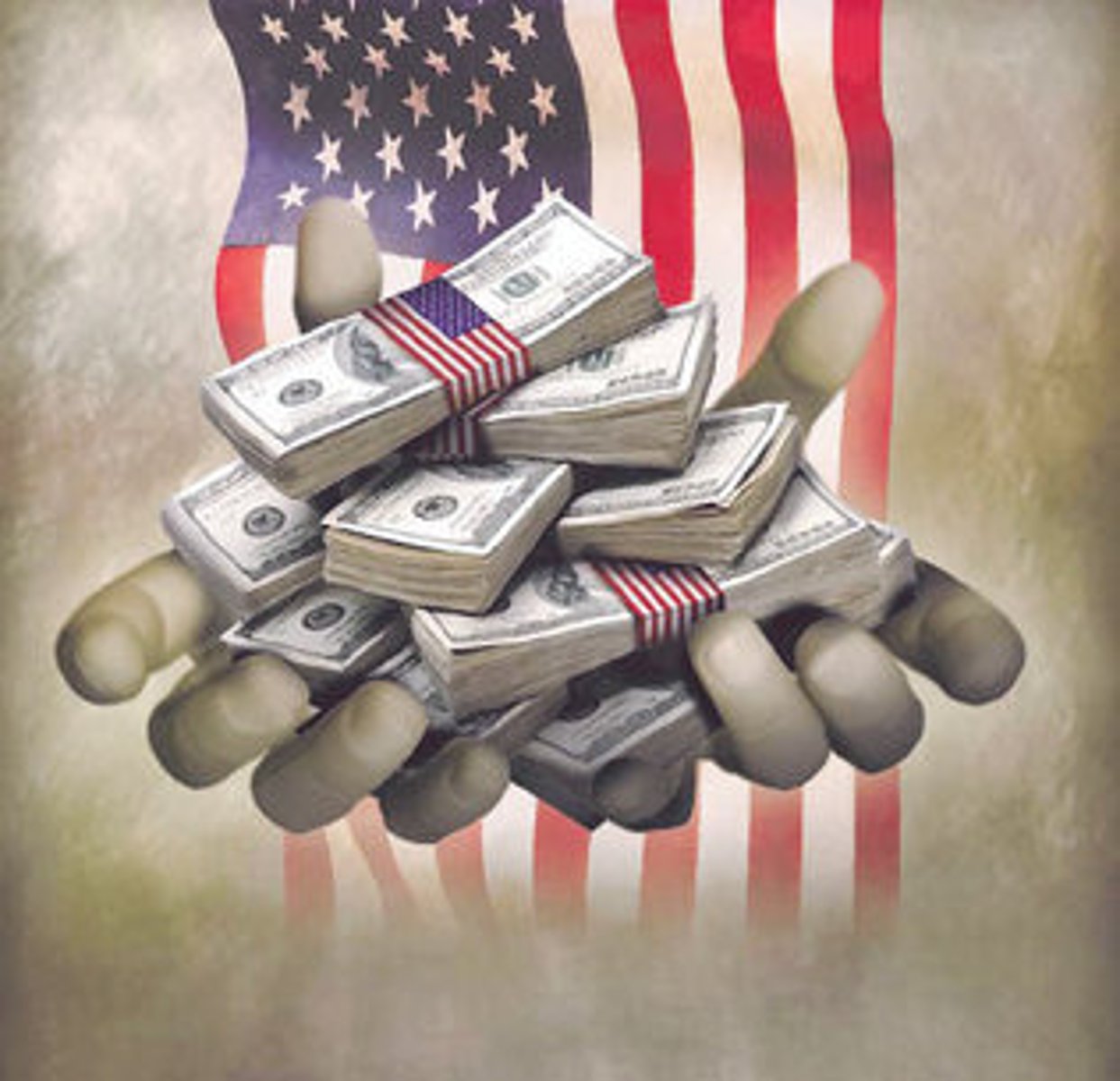
National Recovery Administration 1933
Businesses were encouraged to cooperate to come up with a "code of fair practice" for each industry. Each code set standard prices, limited production, and reduced the work week to 40 hours. Once approved, business who voluntarily followed the code could advertise as NRA members. In 1935, the Supreme Court found it unconstitutional.
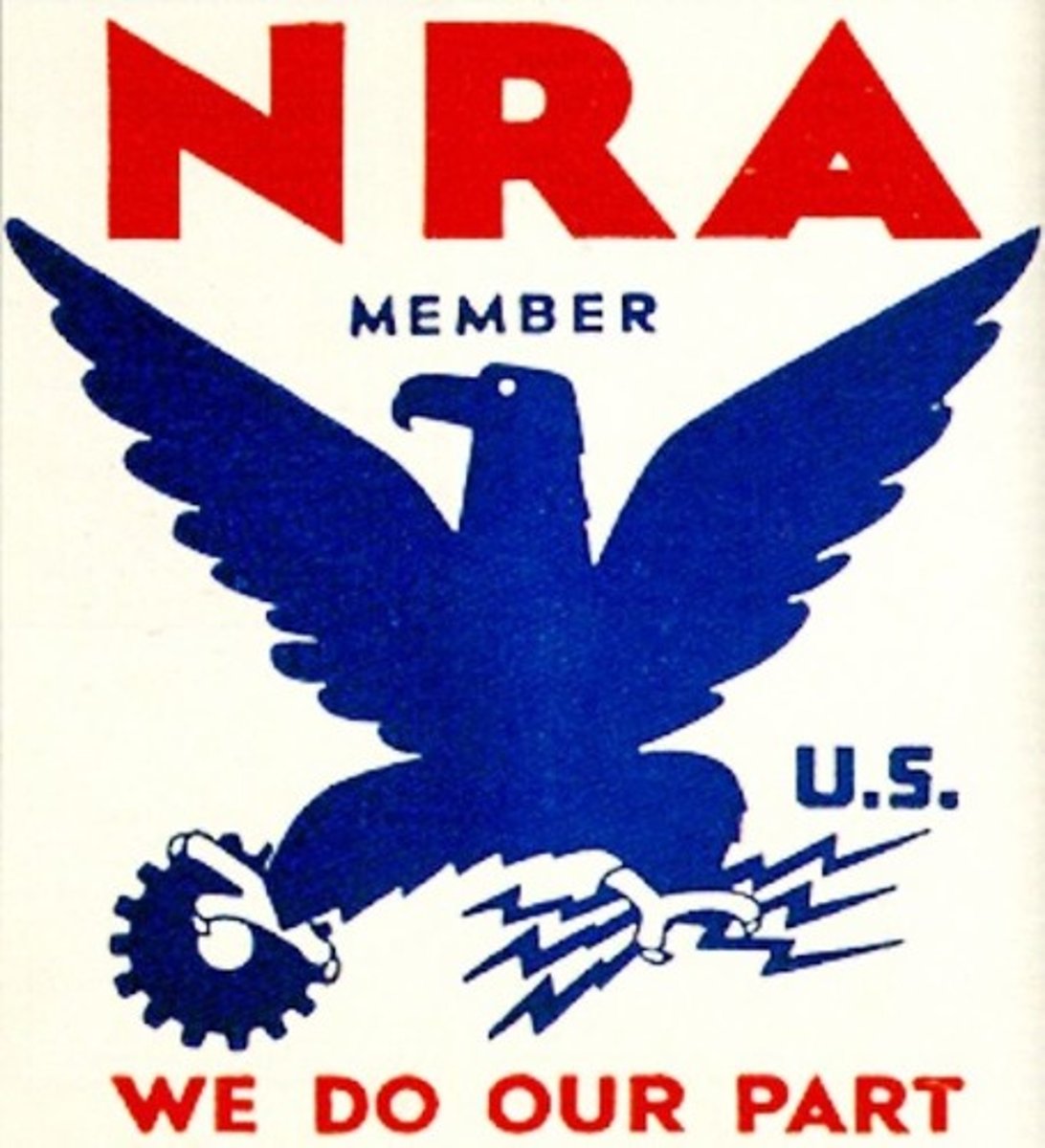
Works Progress Administration (WPA)
Part of the 2nd New Deal in 1935. Increased employment by creating new public works projects. Built airports, roads, public buildings. Also sewed clothes for the needy, painted murals, and performed in theater groups.
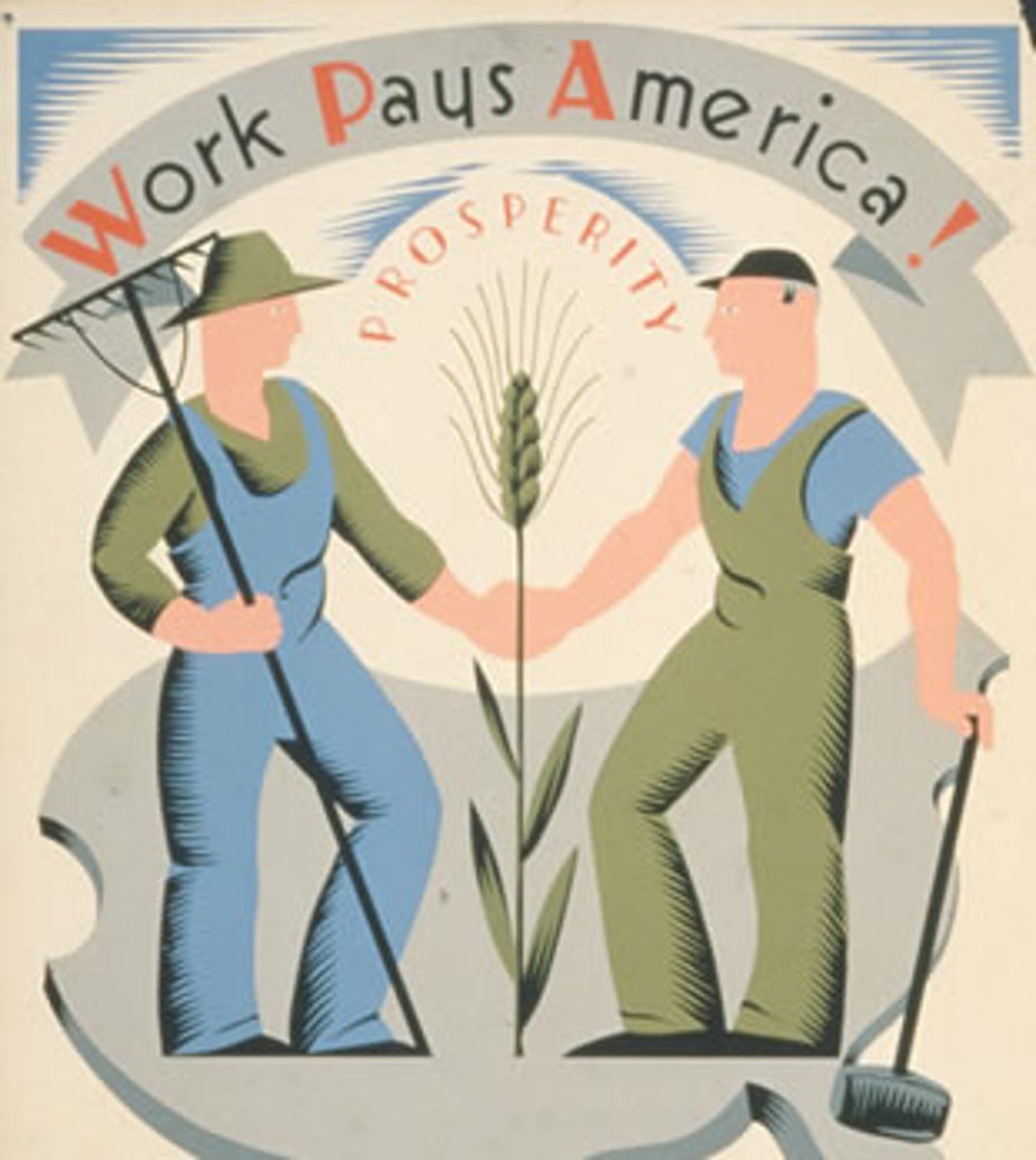
Social Security Act
One of the most important acts passed during the New Deal - still exists today. Provides Americans with a "safety net" - unemployment insurance, retirement benefits, and aid for disabled and orphaned Americans.
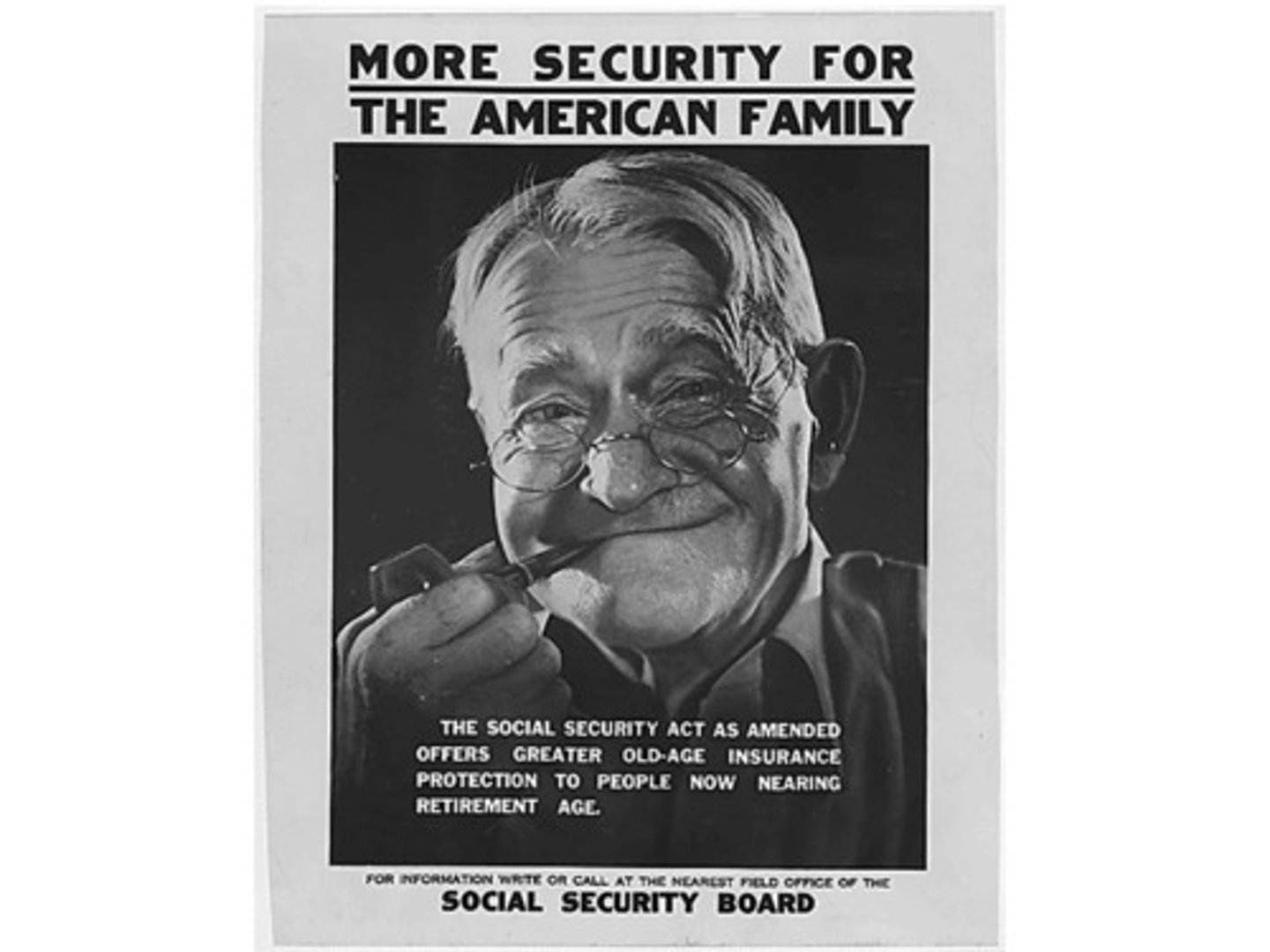
National Labor Relations Act (Wagner Act)
Replaced the unconstitutional National Industry Recovery Act - gave workers the right to form unions, engage in collective bargaining, and submit grievances to the National Labor Relations Board.
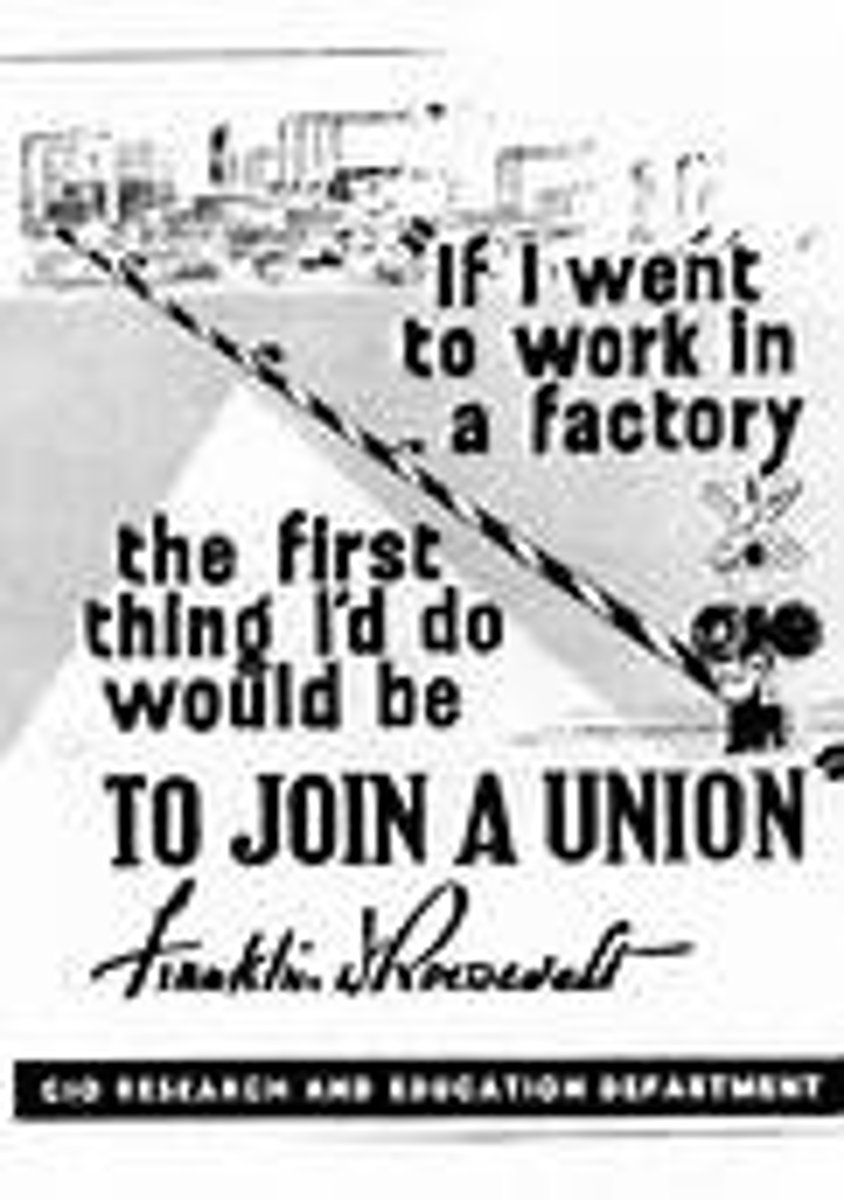
Sit Down Strike
A strike in 1936 where workers refused to leave the General Motors factory (preventing it from being used). Federal government refused to interfere and GM eventually agreed to recognize the workers' union.
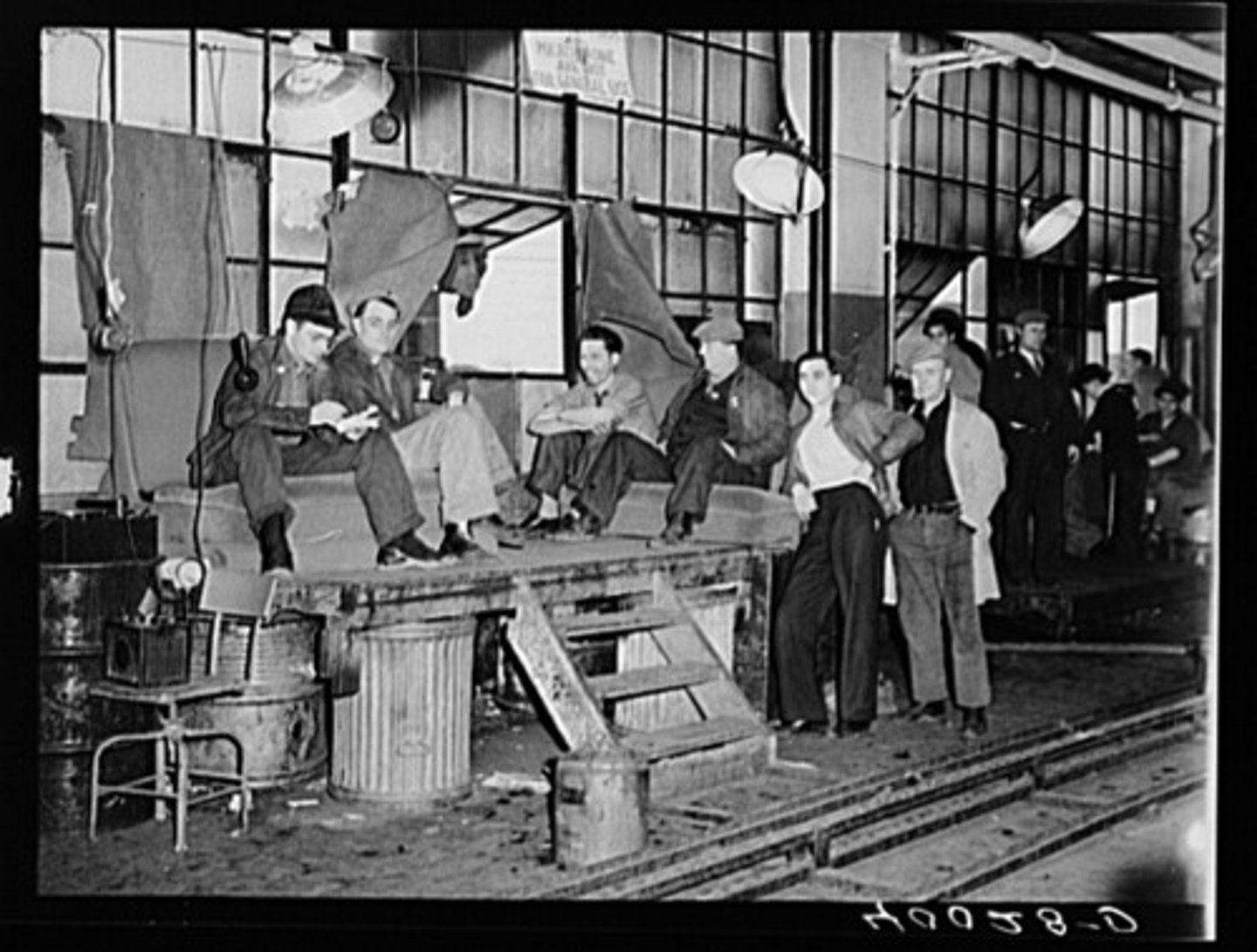
Great Depression in Florida
1931 - Legislature legalizes gambling on horse and dog racing hoping to improve the economy. Still unemployment rose and "Hoovervilles" sprung up. CCC and WPA were active in Florida - planting trees, rebuilding the Overseas Railroad, creating state parks, and building schools, playgrounds, and seawalls. The Florida Citrus Commission promoted the state's citrus production. Sugar and paper industry start during this time.
